#also some exceptions but they mostly follow some of these archetypes which. yeah.
Explore tagged Tumblr posts
Text
I'm craving good het romance, as one does from time to time. Where do I find good fantasy not only romance het pairings. Where is my queer het plot!!!
Has anyone some book or manga recs? Preferably something finished please, I don't want to suffer waiting to the author to complete or abandon the story or of they're gonna be canon XD
EDIT after list is written: Okay. This post has officially become my list of what kind and why of het pairings I like. You've been officially warned. (Also a rec list of what to read/watch?) Trying to avoid spoilers.
Also more than half of this list is about teen me readings, I really need to seek out books and Manga bc wow. Very teen me, and I think that I've outgrown their canons even if the ship dynamic is also that still compels me.
I like:
CANON
El/Orion from the Scholomance. Whenever Orion gets a bit of focus I'm just. Oh wow (if you read between the lines he's so simple and so fucking unhinged at the same time). El extremely denying any vibes until last moment, but also falling extremely hard. Them both being such a battle couple/pair in general.
Whatever you can call what Agatha has going on with her two beaus in Girl Genius. They're all three of them so crazy competent and gone for each other too.
Yona/Hak and her vibes with Soo-won too (that foils thing she has with him is perfect and usually handled to male charas only, I'm biting my arm) (the loyalty thing with Hak and the way he pulls her higher too) (just the frustrated ot3 vibes of it all).
Jang Uk and Naksu|Cho Yeong in season 1. Their devoted and unhinged vibes destroyed me, I loved them. They were perfect, they only needed a bit more physicality. Season 2 defanged Yeong way way too much (in favor of uwu and blegh, let the woman cut off heads) and I didn't like the postponed angst and romance without knowing her identity.
Iron Widow OT3, which look. Wu Zetian rules even when she misses and nukes a city and everything is fantastically creepy and the guys lovely developed charas too with very different personalities and backstories
Tana and Gavriel from the Coldest Girl in Coldtown. (and this one also has threesome vibes with Aiden, uh) I like it when she is driven to do whatever it needs doing be it save her ex or her sister, or killing an ancient vampire in the company of another midly crazed vamp who is also very devoted to her and rediscovering life. Also the whole aesthetic and vibes of this one fucks.
Kate and August in Monsters of Verity duology. Dark dystopic urban fantasy and monster/human plus tragedy plus narrativelt active morally complex fem protags? I was obssesed with it when it came out.
Kaguya and Shirogane, but specifically if they weren't so innocent. Their chemistry is super fun, but I want something a bit more grown up and less teen panic. See also, me at 11 being obssesed with Blair/Chuck vibes in season 1 and 2 of Gossip Girl.
I'm on a roll. I loved Gilbert/Anne both in the 80's series and in Anne with an e. Obvious rivals to lovers where the guy respects her intelligence and she also has to have a whole arc about herself before realising she likes him.
I remember being bewitched by Lyra and Will once upon a time when I read the Golden Compass trilogy. Same re:Nathaniel and Kitty from Bartimaeus despite these two never having comfirmed anything just tragic unfulfilled potential.
Bipa and Aer from La Emperatriz de los Etéreos de Laura Gallego; theyre my fave pairing of hers and one of the only ones I didn't grew distant from as I grew out of her books. She's so practical and also kind and warm hearted, and he has the head on the clouds and is also completely out of this world in a familiar way. (this is me identitying with the guy who only appears like. A quarter of the whole novel bc he has been trying to give himself over to a lovecraftian alien soul-eater blue star while Bipa has to do all the journey to bring him back and destroy said blue star). Laura Gallego is wild.
NOT CANON
Younger me also enjoyed Artemis/Holly, not sorry at all for that one. He's so gone for her as a person and she's so out of his league (bc of their ages, bc of their species, their incompatible moralities up to the last books, etc, etc). Unfulfilled longing that makes you want to be a better person, the ship.
Soul/Maka on the other hand have super married vibes despite nothing ever being official and I love them and want to set on fire all the fic there's is about them bc it's general romcom / modern setting without that battle partnership and soul trust + domesticity I love. Also extremely teen but alas.
Yatori from Noragami bc I love tragedy specifically and human/gods relationships are fascinating. Even if it's unfinished. Even if it's out of focus somewhat.
Bellamy/Clarke from the 100 for all of the three seasons I saw before abandoning the series. The plot was unsmokeable but their relationship perfectly done. I was resigned to a boring romance with Finn and bam. Complex relationships, Clarke being bi with Lexa, parallel leaderships arcs, etc. Oh wow.
When someone bothers to write Aredhel/Celegorm on her PoV and it hits incredibly HARD. Damn. Whether aroallo or full-romo. Let post rebirth Aredhel be wild and Celegorm reckon with the knowledge of what wrong he almost brought to Luthien given Aredhel. Aredhel loving Lomion despite everything and loving disaster Celegorm, but not forgetting what they did, the awkward bonding between Maeglin and Celegorm as two former bad guys. Or them avoiding a bad ending and dying together fighting on the First Age before the Second Kinslaying. Playful times in Valinor pre-darkening.
ESPECIAL MENTION
I loved Laini Taylor characters and worldbuilding but her love at first sight kind of romances left me cool which is sad given I liked like everything else about her stories. Including the two characters involved on the romances, but not the romances per se. I guess I'm too aroace to believe first sight as anything reasonable in a serious plot even with the fairy tale vibes her stories have lol.
I also love Reylo vibes and symbolism but hated what they did on the last movie with them and I'm weirdly unable to read much fic of them. So...
#my thoughts#recs#but also me ranting about my fave ot3 with het or otp het pairings#and discovering it's either extremely ruthless driven and morally grey fem chara who is tired of this shit#x her equally driven and ruthless partner who is also so so tired of this shit and all in with her shaneaningans#(maybe he's a bit softer than her having already tried it the hard way but he still loves her and they're both driven crazy by the world so)#or either book-ish and intellectual girl x her rival or childhood friend with whom she has a mutual understanding despite themselves#they adore each other but they realise it later#lmfao#my two sides: very angry at the world VS very intellectual and a bit passive-aggressive. FIGHT#also some exceptions but they mostly follow some of these archetypes which. yeah.
1 note
·
View note
Note
Rolling in 10 hrs late but— 27, 28 Caine, 17, 34 for Cecilia? And B for all ur Steps, if you don’t mind :)
morning! thank you for the ask :D
27. What causes them to feel dread?
the fun thing about caine is that hes got really good instincts. its only heightened with hark (over 30 precog im p sure?) since hark encouraged him to listen to their gut. so if somethings about to go wrong, yeah, the dread is kicking in and theyre nope-ing the fuck out of there (the only exception to this is the casino scene). but there can also be false alarms if he disassociates hard enough, which is becoming more frequent lately. their paranoia+growing insomnia just adds to all of it. basically they just feel dread half the time,,, but also a more tangible thing that causes them to feel dread would probably be ortegas mind. if theyre in the wrong headspace, ortega brings back too many bad memories for them to feel safe.
28. Would they prefer a lie over an unpleasant truth?
hmmm,,,, im not sure! it really depends on why the other person is lying about it ig, and how severe/urgent the unpleasant truth is. by default he tends to prefer the truth, but its mostly for informations sake. for example, with argent, they Really wouldve preferred not knowing what she was capable of. now that the cats out of the bag hes even more paranoid, especially since they have no information on her to use to protect himself. meanwhile, with the autopsy pics, they appreciated chen telling them what happened because it gave them a better idea of what happened while they were gone, and in their eyes chen had no obligation to tell them (plus they got some free bonus info about the kind of contacts chen has which is really useful too). basically, if he thinks he needs it to do things better or more efficiently, hell be ticked off about somebody withholding the truth from him, and vice versca if he thinks the lie would be more beneficial to him instead. either way though, theyre good at keeping their emotions in check, so hed be fine getting the unpleasant truth either way.
17. Are they easily embarrassed?
nope! not at all. i mean, if she hyped herself up and managed to fail spectacularly, then yeah, i could see her getting majorly embarrassed. but thats p much one of the few situations i could imagine her feeling like that. ceci isnt known for shame– shes extremely blunt, to the point of being insensitive, and shes willing to do a lot for a quick kick. except,,,,,hmmmm,, argent making a comment or stealing a quick kiss when she didnt expect it and managing to fluster her,,,,,, please hold while i experience the visionsTM.
34. How hard is it for them to shake a sense of guilt?
oof. i think prehb the guilt of what she left behind was definitely there, but it got buried under the satisfaction of being free and having fun for once. nowadays, she still lives by those principles, that no matter what happened at least shes here now, but this time around theres an added layer of her actively trying to forget. if she does something she genuinely regrets, its still getting buried, but itll just claw right back to her in inopportune moments. most of the time though, guilt is getting tossed right back out the window so it doesnt disturb her happy fun loving times. no, ortega, no, finch, she is NOT repressing, she is simply being #goofysilly and will not stand for regret ruining her vibe.
B) What inspired you to create them?
speaking for my general process with all my steps: im rather predictable when creating characters. lots of them follow the same molds, they just tackle different storylines, and the differing plots are what makes them all different characters. so when making my steps, i ended up using those same character archetypes and taking them to their logical conclusions based on what choices the game offered. it makes it easier for me to imagine how they react, and its fun to tack on a slightly different trait to the mold and see what happens. ultimately, they all fall somewhere on the extreme ends of the "good/evil" spectrum, but with an added bit of ✨spice✨ from the other end to get them going into fully fledged characters. these are my inspiration/archetype for each individual step:
Caine- being an imported character for the exile if, i already had his character in mind when making him! in exile, they were very much meant to be the stoic leader character that was just beginning to doubt what he fought for. the problem when i tried to put them in fhr was. chen. chen i love you but holy shit it was so hard to make him unique and interesting when you were literally RIGHT THERE covering all the bases they were supposed to cover. and chen has a dog which made him obviously superior. it was annoying, but my frustration with their similarities pushed me to put a lot of love into them and well. look at where my son is now lmfao.
Cyrus- @ that one person who made that post about herald subverting the cinnamon role stereotype: thank you. i owe you my and my bastard sons life. cyrus was just meant to be a step i used to explore heralds ro route, so i didnt mean to take him too seriously. because of that, and because this was directly after caine and i was getting frustrated figuring them out, i kinda just went with the flow– he was originally a character closer to the "flirty and funny but actually competent and surprisingly apathetic" type. he used to have like. 50% ruthlessness lmfaoooo. a lot of his major character beats were caused by me making mistakes and figuring things out by clicking random choices out of curiosity. after i played him once, the higher ruthlessness route i went intrigued me, and i started tweaking him further, which is how we got here.
Cecilia- i! wanted! to! have! someone! fun! i wanted to have someone fun. i just wanted to have a step who would dick around and do stupid shit because they wanted to. she was my third step, both caine and cyrus were so serious, i needed somebody to juxtapose that. she was very much the "fuck around and find out" character. i created her to explore the lupin route, which seemed appropriate for the sort of character i wanted her to be. i also wanted to romance argent. it all just sort of culminated in a whirlwind of the most out there, daring step i had. it was only later i considered adding some more serious edges to her story, she was a bit like stress relief lol.
Cynthia- i created her with ortegas ro route in mind! even though caine was technically an ortega ro step, he was secretcrush so they couldnt really do much lmfao, so i was itching to play somebody whod actually pursue her. i chose the "calm, kind, do not burn down the house please and thank you" character for her since it seemed like fun to try with ortegas more out-there energy. i also had her as an anarchist, which i thought would be interesting to see play out since she was definitely on the more heroic end of the spectrum and i wanted to see how she would tackle one of the more destructive job choices. unfortunately, the kinder characters are almost always the hardest for me to work with, so it did take cynthia a while to find her footing. now, though, i think shes come together nicely! very much a balance of the nicer character i wanted for her originally while having that small kernel of "i can fuck things up if i wanted to" that i find more fun.
questions from here!
#i guess i DID end up answering those questions for caine#cecilia in particular is funny to me because like. yes my beautiful girl. go destroy your life for an adrenaline rush.#that is the normal way to respond to a lack of simulation. godspeed#i had to refrain from listing off other ocs i had that fit those specific archetypes whdjsjsjdjs#i have lots of beloved children ok. i need to figure them all out at a reasonable interval Somehow#that said. rip my other five steps#id say ill get to you someday but honestly. probably not lmfaooo#btw fun fact. the caine-cyrus-cecilia-cynthia order i always answer questions for them in is the order they were created in#caine lynzal#cyrus becker#cecilia rider#cynthia garcia#sidestep#fhr#pulp answers#ask game
4 notes
·
View notes
Text
Today in the shower I was finally able to put into words what feels so remarkable about Jonnit Kessler and his story, and how he feels unique from most fantasy stories about children and teenagers.
(abandon all expectations of reasonable sentence structure ye who enter here.)
So many stories (especially ones featuring children and teens and people who suddenly find themselves to have magical powers) are victims of happenstance. A Call To Adventure occurs and most of the time they initially refuse. The plot happens To Them and they are unwilling to follow it until they find some other motivation to stay with the story and Do The Plot, overcome adversity, ya know, archetypal hero nonsense. Most of the time this refusal of the call is caused and/or accompanied by a belief that they're not the right person for the job, the prophecy chose wrong, they're just a kid so what could they possibly do etc etc and generally feeling out of their depth.
Which, fair.
And I'm not saying that Jonnit doesn't also experience this. He got in way over his head and had no idea what he was signing up for when he snuck onto the Island, he knows he is destined for greatness but needs guidance on how to achieve it, faces Actual Peril on the regular etc etc, but Jonnit actively purseus his hero's journey. He 1) obtained magic powers mostly by accident, 2) saw this vision of his own potential, 3) thought "fuck yeah I want that" and set off to find it.
His self-assurance is what drives him forward, not desperation or happenstance or coincidence or forces outside of his control that chose him for something special and are pulling him along, he saw a possible future for himself and went after it. His greatness is not something thrust upon him (as the saying goes) but something he reached for from the beginning. You could even say there's a prophecy about what he's going to do (as you find with some of the more popular Magical Boys who go on an Adventure with a squad of friends) but the prophecy is not something he's controlled or manipulated by, he has to actively choose to fulfill his own prophecy every step of the way and he does with enthusiasm.
And it's not a perfect contrast and there are so many exceptions it might not even be a rule but it's something that always struck me about Jonnit I couldn't put into words until today, he seems to have so much more agency in that way than most protagonists of his ilk do and in case you couldn't tell I think that's very fucking neat.
#jonnit kessler#skyjacks#skyjacks spoilers#MY BOY I LOVE HIM SO MUCH#he was my favorite character from episode 3 and wjll continue to be for the rest of the show probably
46 notes
·
View notes
Video
youtube
(fyi the following is an “in my drafts from last night when i was baked” rant. first one of 2023 whoo)
reading barry windsor-smith’s Opus volume 1 and 2, which is an artbook and memoir that’s mostly about his mystical experiences but also his career because these things affected one another. he was an archetypal tortured struggling artist in the 70s. deeply fascinating guy
(yeah i got the books i wanted for christmas. wasn’t expecting both because they’re ridiculously overpriced on amazon especially number 2 which is a hundred and twenty six fucking dollars for some reason. but mom surprised me. she got it cheap on ebay. love you mom)
and i declare painter man by boney m his theme song. they’re both the seventiesest but in different ways.
oh guess what the rent of his shitty manhattan apartment was back in the day. $300. that’s 3 HUNDRED. with ONLY TWO zeros. jesus fuck that makes me angry.
ok so my Take on barry is that his art is fucking transcendent and he seems like a fairly decent guy mostly but of course he did a “that one comic that’s outrageously racist” that so many old comics guys have. ok so what he did is literally he had this rejected draft of this story about storm. which is about storm using her powers to save everyone in ye olde generic african village who are dying because of a drought. and marvel rejected it because they thought it “glorified suicide” because the religious leader of the village sacrifices himself to a magical tree in order to bring it back to life. (or something like that.) so imagine you have this story do you
a) write and illustrate this story but instead of storm insert your alien goddess oc from your other project that’s a tribute to jack kirby’s new gods. said oc’s normal personality is almost diametrically opposed to storm’s. she is a white woman. only thing they have in common is they both have a mohawk. and can fly.
b) do literally anything else.
And that’s “Adastra in Africa.” Read every comic he every true except that one. Please
2 notes
·
View notes
Text
Utena thoughts...about 2 weeks later
I've been putting it off for way too long and so most of my thoughts stopped being fresh. On top of watching way too many analysis vids post-watch, but still I do at least want to put my 2cents of Revolutionary Girl Utena out there for the world.

Utena is perhaps one of the most famous "magical girl"/shoujo action shows out there for not only it's transgressive themes of relationship abuse and low-key pretty much being the poster girl for like actual feminist perspective on/in anime...but also just doing it all in both a heavily allegorical and understated, yet super over-the-top stylish fashion
But that's it's reputation preceding itself, is Utena worth while all these years? The answer is Yes, but it also really shows it's age and budget in pacing and repetition, tho as an appreciator for "behind the scenes" compromises in art, it's more showcasing Ikuhara's talent in working around both taboo and long-form budget constraints with just well-thought out and iconic imagery that - while episodic and formulaic - is just very good at filling the 39 eps with feasts for the eyes.
Utena broadly is about tomboy Utena with memories long ago after her parents died being "saved" by a princely figure like a princess...except she's so enthralled by the nostalgia that instead she becomes a full on Prince herself and receives a dueling ring to fight in the Ohtori Acadamy secret duels for "engagement" to Rose Bride Himemiya Anthy.
Utena is divided between 4 arcs, only the first and last being Manga adapted from hearsay:
1: Student Council Saga
2: Black Rose Saga
3: Akio Ohtori Saga
4: Apocalypse
From back to forth I'd say that Akio + Apoc is more just escalation into the finale while Black Rose being anime original comes off as a glorified side-character study which while complementing the secondary cast, feels like one of those Anime movies that has to say "but if you don't watch this part, it's pretty much optional for the main plot" despite it also actually introducing the most important antagonist within it's margins.
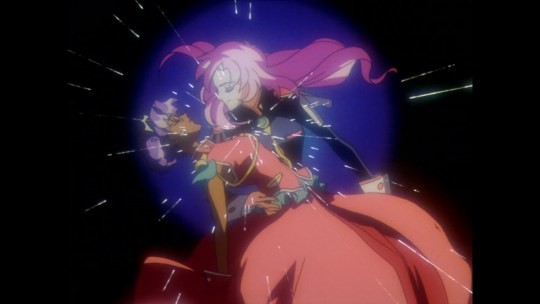
More importantly, it's the Student Council (arc and the actual people) that lay the foundation but also a large part of the show's focus which ironically puts Utena in the background until like almost the finale and some in-between developments, so it's less "Utena (and Anthy Himemiya)'s story" until the very end, but more like a showcase of how fucked up the system at large is (pin in that).
By the Council themselves is:
Kyouichi Saionji: The biggest jobber, like actually introduced as the most despicable loser ep 1 and proceeds to be a complete arrogant joke for the rest of the show. Honestly in another shojo "love" story, they'd find some way to redeem him but semi-compellingly they turn him into like an Aqua-lad type pathetic brat with an inferiority complex to the actual Student head
Miki Kaoru: the naive "nice, non-threatening soft boy" that also just never actually listens to the girls around him. Probably adds more complexity to the whole patriarchal idea on analytic reflection since yeah, the whole "nice guy finishes last" plays up better when the kid comes off as that "ally" energy of wanting to save Himemiya from being the Rose Bride but also low-key won't actually not just do the duels and win her cuz he's that sorta wishy-washy hypocrite. Arguably the least hateable guy in the cast (minus mascot Chu-Chu)
Juri Arisugawa: TRAGIC LESBIAN TRIANGLE LOVE. Probably the biggest point to of both "not-explicitly homosexual" but also really freaking obvious since her entire story is her girlfriend stealing her "boy crush" when actually she was crushing on her and being pretty much frustrated throughout her story as pining most of it. It's quaint by today's standards but also like damn girl, get over her she was like the worst back stabbing bitch (literally if Black Rose counts)
Nanami Kiryuu: SPEAKING OF QUEEN BITCH, it's been a long time since I've watched a High School girl bully and honestly it's kinda refreshing. If Miki is "soft-boy uwu" Nanami is a brat that gets her come-uppance often, featured prominently as an anime only with the MOST filler/comedic episodes but also not low-key, being the most out-spoken actual brother complex ironically spins perhaps the biggest twist and ironic relationships of "I love my brother but not-like-that but also like-that" by the end. Mostly comedic relief but I find her inclusion to actually add a lot more to juxtapose...
Touga Kiryuu: Big Student Council Prez himself, the first arc antagonist and also a strong foil to Saionji and later a stepping stone for Akio. Touga is THE image of a Princely Playboy Heart-Throb that in any other Shoujo romance would have the main girl win him over from all those "other girls" despite him being apathetic if not outright manipulative of them. Good thing Utena is better than that and really puts a spotlight on just not-actually-ok his power hunger for "the power to bring the world revolution" that leads him to heavily objectify Anthy, arguably even more than Misogynist Trophy Girlfriend beater Saionji, since he doesn't even see her as more than a means to an end despite professing and looking the Prince part but lacking all the actual virtues.
The Student council matters more since they're characters and subsequent tragic flaws are the ACTUAL meat of the show and on second rumination actual shows more how fucked up the system/gender dynamic/power hierarchy is since - while it blatantly fucks over Juri who can't just outright say who she likes - also show almost it's own sub-text of Masculine failings: Saionji desperately clinging to being TOXIC MASCULINE™ and completely falling short underneath Touga; Miki's "nice boy" act belying him trying to replace his low-key nostalgia for his sister (also a bitch, but apparently was more like Nanami in the manga); and best yet Touga being the quintessential "Prince in all but actual behavior" by emulating a cutthroat and Machiavellian world view but coming up empty because well, he's just an illusion of a prince...but that leads in way more to the big finale piece where I'll reintroduce the actual story's main trio
Utena Tenjou: Tomboy Prince with brain empty except for lesbian thoughts. Honestly probably what every western "STRONG INDEPENDENT WOMAN" archetype wishes they were since while having very tomboyish personality in athletics, blunt speaking and also VERY oblivious to the actual plot for REAL DRAMATIC IRONY, but also never actually demeaning her being feminine partially due to her love of an childhood prince and how she maintains her relationship with both her friend Wakaba and later Anthy. Honestly mostly a plot device after S1 until she gets ACTUAL development by the very end and instead kinda bumbles her way into undoing the entire REVOLUTION OF THE WORLD. I kinda wish she felt either more cognizant or at least felt like she was developing/properly rebuking the rest of the cast's power obsessions but I guess that's for the movie.
Anthy Himemiya: Actual Trophy Wife with a dark secret (darker than ski- wait no that's terrible scratch that). Set-up very much as an immediate princess in distress while also being the most femme Yamato Nadeshiko, Anthy being the Rose Bride as a literal prize who acts and behaves as whom she's "engaged" with desires while otherwise being quiet, wry, mysterious and noticably submissive, by the end it actually plays up into THE BIG REVEALS of just how abused she's been into a hopeless acceptance...like y'know actual abuse victims.
Akio Ohtori: Grade A Antagonist, probably the most insidious I've seen a villain in a while, Akio is notable for, back in 1997, being perhaps the big go-to of actual deconstructing the facade of a whole shoujo genre's "hots for a teacher/sexy man putting the moves" and highlighting how actually exploitative and abusive a person like that really is. Being Himemiya's brother (somewhat justified in the manga by both being a weird Sailor Moon-esque reincarnation of gods/godesses of Dios), despite how much of his motives are runing the background and how the entire back story is uh...brought up in like barely in the last arc with little lead up (some scenes feel like they'd be a full melodrama season and they just have like 1 scene in the final arc episodes) he manages to one-up Touga (in the plot as well) by instead of "just" objectifying girls, not-just-flat out saying Utena looks best as a princess, but y'know the fact that he is implicitly yet constantly exploiting and victim-blaming Anthy for her own suffering for "the power of Dios/Revolution of the world" turns it on its head
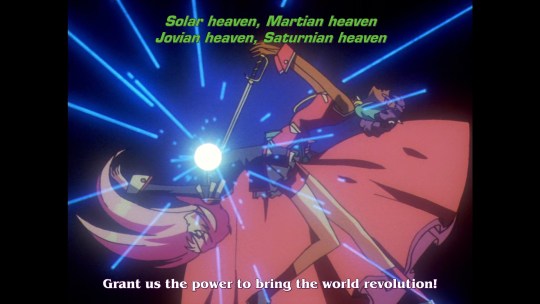
I've spent all this time on characters but in truth a lot of the meat of the show relies again on the Council Members fleshing out the issues of system leading to outright divorcing "being a Prince" (heroic altruistic virtues) and "being a man" (considering like all but maybe the comedic relief have some deliberately misogynistic behavior) and beyond just the plot (or rather character) synopsis, the talent goes far more in how it's framed, the symbolic/allegorical shots, the repetition adding a good episode formula flow to character showcases, probably the most "tasteful" allusion to uh...*ahem* sexual abuse that so many other edgier/prentious shows fumble. Both in how intimidating yet understated it's foreshadowing is until they hard-reveal it despite never explicitly naming it even tho it sends Nanami into hysterics
Really it's both a massive blessing and reason for it's cult beloved status for it's aesthetics but also it's burden, for being a full 39 episodic season by season character development study of everyone BUT the main trio except for snippets and the very end that makes it greatly appreciable as a legitimate work of art.
What I wanted more to say however (long overdue) is that a large part of following is, visibly at least, western feminist critiques and yes while it almost seems like Utena fits the "deconstructing patriarchy" story like a glove...it's weird how almost none of them actually can give a good historical account of actual Japanese female/gender/sexuality norms nor Anime contemporaries actually were. Like Tenchi Muyo and Berserk came out the same year (Cardcaptor Sakura the next) and despite how you can "feel" the influence in lots of modern shows like SHAFT's signature visual imagery cuts or many WESETERN shows having straight scene references to Utena....almost no one has a similar feel to Utena until like Princess Tutu comes out.
Really tho probably should've watched Utena and then Tutu because while it's undeniable that Utena is a major pillar of shoujo re-codification - what with everyone before Utena was saying they thought it'd be like a Rose of Versaille or Lady Knight rip-off...whose laughing now? - it's almost like there's a missing link between it and it's major western fanbase (probably with what few anime did get overseas, this one probably rose to the top), or how very noticeable there IS an influence on it's genre in Japan
Almost none of the big analyst fans actually know A) it's not "a deconstruction of Magical Girls" since despite Ikuhara working on Sailor Moon just before this, almost none of the tropes line up and instead more with Shoujo genre as a whole. or one of the major inspirations was Takarazuka theater.
And this is not to dismiss how inspirational it is to it's western fandom, but while I am notably cynical towards placing things on pedestals, there's probably something about cultivating the whole pop-culture feminist reading commune with people making weird time-loop theories while kinda most of it is just filling in a mad-lib mostly thanks to Ikuhara just keeping things on the vague and letting the audience take away their own perspective.
Again, most of the show is completely sub-textual or visually/symbolically depicted and never stated nor properly defines it's weird key words (End of the World, Revolutionize the World, Power of Dios, Rose Bride, all things said constantly but never really said what they "mean". But that's also perhaps its charm, in it's allegory and very Death of the Author approach, it has definitely allowed it's fan theorizing and appreciation to flourish so there's something there for that.
Ultimately I'd say Utena the TV series is great more so for what it isn't...or rather I should say it's great for not just subverting Shoujo tropes and archetypes for the Japanese audience but also that despite dealing with some very serious and heavy subjects in obtuse and perhaps understated ways for the time, people have allowed it to be put on it's pedestal because they can easily fit it in themselves.
Honestly though, not that a more "straight forward" approach wouldn't detract from Utena but I will say that the movie, Adolescence of Utena, is very much the best encapsulation of what Utena strives to be (for another big blog post) and while the TV series has plenty of time and flexes it's directorial muscles with budget constraints and season pacing UNrestrained, the movie will trim a lot of the fat
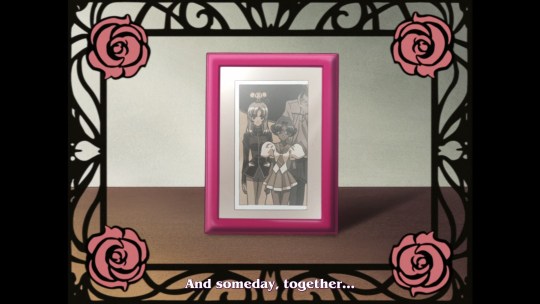
#long post#Revolutionary Girl Utena#I haven't actually done my Anime thoughts in a while#Maybe I'll keep this on my main blog this time#I wrote this mostly on facebook tho if I wrote it here first I'd better integrate images probably#anolyso's media time#uh...except now that's on my main blog
44 notes
·
View notes
Text
Thoughts on: Criterion's Neo-Noir Collection
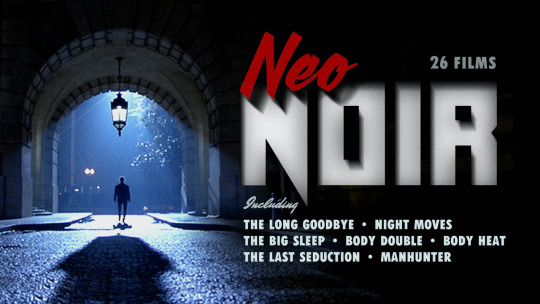
I have written up all 26 films* in the Criterion Channel's Neo-Noir Collection.
Legend: rw - rewatch; a movie I had seen before going through the collection dnrw - did not rewatch; if a movie met two criteria (a. I had seen it within the last 18 months, b. I actively dislike it) I wrote it up from memory.
* in September, Brick leaves the Criterion Channel and is replaced in the collection with Michael Mann's Thief. May add it to the list when that happens.
Note: These are very "what was on my mind after watching." No effort has been made to avoid spoilers, nor to make the plot clear for anyone who hasn't seen the movies in question. Decide for yourself if that's interesting to you.
Cotton Comes to Harlem I feel utterly unequipped to asses this movie. This and Sweet Sweetback's Baadasssss Song the following year are regularly cited as the progenitors of the blaxploitation genre. (This is arguably unfair, since both were made by Black men and dealt much more substantively with race than the white-directed films that followed them.) Its heroes are a couple of Black cops who are treated with suspicion both by their white colleagues and by the Black community they're meant to police. I'm not 100% clear on whether they're the good guys? I mean, I think they are. But the community's suspicion of them seems, I dunno... well-founded? They are working for The Man. And there's interesting discussion to the had there - is the the problem that the law is carried out by racists, or is the law itself racist? Can Black cops make anything better? But it feels like the film stacks the deck in Gravedigger and Coffin Ed's favor; the local Black church is run by a conman, the Back-to-Africa movement is, itself, a con, and the local Black Power movement is treated as an obstacle. Black cops really are the only force for justice here. Movie portrays Harlem itself as a warm, thriving, cultured community, but the people that make up that community are disloyal and easily fooled. Felt, to me, like the message was "just because they're cops doesn't mean they don't have Black soul," which, nowadays, we would call copaganda. But, then, do I know what I'm talking about? Do I know how much this played into or off of or against stereotypes from 1970? Was this a radical departure I don't have the context to appreciate? Is there substance I'm too white and too many decades removed to pick up on? Am I wildly overthinking this? I dunno. Seems like everyone involved was having a lot of fun, at least. That bit is contagious.
Across 110th Street And here's the other side of the "race film" equation. Another movie set in Harlem with a Black cop pulled between the police, the criminals, and the public, but this time the film is made by white people. I like it both more and less. Pro: this time the difficult position of Black cop who's treated with suspicion by both white cops and Black Harlemites is interrogated. Con: the Black cop has basically no personality other than "honest cop." Pro: the racism of the police force is explicit and systemic, as opposed to comically ineffectual. Con: the movie is shaped around a racist white cop who beats the shit out of Black people but slowly forms a bond with his Black partner. Pro: the Black criminal at the heart of the movie talks openly about how the white world has stacked the deck against him, and he's soulful and relateable. Con: so of course he dies in the end, because the only way privileged people know to sympathetize with minorities is to make them tragic (see also: The Boys in the Band, Philadelphia, and Brokeback Mountain for gay men). Additional con: this time Harlem is portrayed as a hellhole. Barely any of the community is even seen. At least the shot at the end, where the criminal realizes he's going to die and throws the bag of money off a roof and into a playground so the Black kids can pick it up before the cops reclaim it was powerful. But overall... yech. Cotton Comes to Harlem felt like it wasn't for me; this feels like it was 100% for me and I respect it less for that.
The Long Goodbye (rw) The shaggiest dog. Like much Altman, more compelling than good, but very compelling. Raymond Chandler's story is now set in the 1970's, but Philip Marlowe is the same Philip Marlowe of the 1930's. I get the sense there was always something inherently sad about Marlowe. Classic noir always portrayed its detectives as strong-willed men living on the border between the straightlaced world and its seedy underbelly, crossing back and forth freely but belonging to neither. But Chandler stresses the loneliness of it - or, at least, the people who've adapted Chandler do. Marlowe is a decent man in an indecent world, sorting things out, refusing to profit from misery, but unable to set anything truly right. Being a man out of step is here literalized by putting him forty years from the era where he belongs. His hardboiled internal monologue is now the incessant mutterings of the weird guy across the street who never stops smoking. Like I said: compelling! Kael's observation was spot on: everyone in the movie knows more about the mystery than he does, but he's the only one who cares. The mystery is pretty threadbare - Marlowe doesn't detect so much as end up in places and have people explain things to him. But I've seen it two or three times now, and it does linger.
Chinatown (rw) I confess I've always been impressed by Chinatown more than I've liked it. Its story structure is impeccable, its atmosphere is gorgeous, its noirish fatalism is raw and real, its deconstruction of the noir hero is well-observed, and it's full of clever detective tricks (the pocket watches, the tail light, the ruler). I've just never connected with it. Maybe it's a little too perfectly crafted. (I feel similar about Miller's Crossing.) And I've always been ambivalent about the ending. In Towne's original ending, Evelyn shoots Noah Cross dead and get arrested, and neither she nor Jake can tell the truth of why she did it, so she goes to jail for murder and her daughter is in the wind. Polansky proposed the ending that exists now, where Evelyn just dies, Cross wins, and Jake walks away devastated. It communicates the same thing: Jake's attempt to get smart and play all the sides off each other instead of just helping Evelyn escape blows up in his face at the expense of the woman he cares about and any sense of real justice. And it does this more dramatically and efficiently than Towne's original ending. But it also treats Evelyn as narratively disposable, and hands the daughter over to the man who raped Evelyn and murdered her husband. It makes the women suffer more to punch up the ending. But can I honestly say that Towne's ending is the better one? It is thematically equal, dramatically inferior, but would distract me less. Not sure what the calculus comes out to there. Maybe there should be a third option. Anyway! A perfect little contraption. Belongs under a glass dome.
Night Moves (rw) Ah yeah, the good shit. This is my quintessential 70's noir. This is three movies in a row about detectives. Thing is, the classic era wasn't as chockablock with hardboiled detectives as we think; most of those movies starred criminals, cops, and boring dudes seduced to the darkness by a pair of legs. Gumshoes just left the strongest impressions. (The genre is said to begin with Maltese Falcon and end with Touch of Evil, after all.) So when the post-Code 70's decided to pick the genre back up while picking it apart, it makes sense that they went for the 'tecs first. The Long Goodbye dragged the 30's detective into the 70's, and Chinatown went back to the 30's with a 70's sensibility. But Night Moves was about detecting in the Watergate era, and how that changed the archetype. Harry Moseby is the detective so obsessed with finding the truth that he might just ruin his life looking for it, like the straight story will somehow fix everything that's broken, like it'll bring back a murdered teenager and repair his marriage and give him a reason to forgive the woman who fucked him just to distract him from some smuggling. When he's got time to kill, he takes out a little, magnetic chess set and recreates a famous old game, where three knight moves (get it?) would have led to a beautiful checkmate had the player just seen it. He keeps going, self-destructing, because he can't stand the idea that the perfect move is there if he can just find it. And, no matter how much we see it destroy him, we, the audience, want him to keep going; we expect a satisfying resolution to the mystery. That's what we need from a detective picture; one character flat-out compares Harry to Sam Spade. But what if the truth is just... Watergate? Just some prick ruining things for selfish reasons? Nothing grand, nothing satisfying. Nothing could be more noir, or more neo-, than that.
Farewell, My Lovely Sometimes the only thing that makes a noir neo- is that it's in color and all the blood, tits, and racism from the books they're based on get put back in. This second stab at Chandler is competant but not much more than that. Mitchum works as Philip Marlowe, but Chandler's dialogue feels off here, like lines that worked on the page don't work aloud, even though they did when Bogie said them. I'll chalk it up to workmanlike but uninspired direction. (Dang this looks bland so soon after Chinatown.) Moose Malloy is a great character, and perfectly cast. (Wasn't sure at first, but it's true.) Some other interesting cats show up and vanish - the tough brothel madam based on Brenda Allen comes to mind, though she's treated with oddly more disdain than most of the other hoods and is dispatched quicker. In general, the more overt racism and misogyny doesn't seem to do anything except make the movie "edgier" than earlier attempts at the same material, and it reads kinda try-hard. But it mostly holds together. *shrug*
The Killing of a Chinese Bookie (dnrw) Didn't care for this at all. Can't tell if the script was treated as a jumping-off point or if the dialogue is 100% improvised, but it just drags on forever and is never that interesting. Keeps treating us to scenes from the strip club like they're the opera scenes in Amadeus, and, whatever, I don't expect burlesque to be Mozart, but Cosmo keeps saying they're an artful, classy joint, and I keep waiting for the show to be more than cheap, lazy camp. How do you make gratuitious nudity boring? Mind you, none of this is bad as a rule - I love digressions and can enjoy good sleaze, and it's clear the filmmakers care about what they're making. They just did not sell it in a way I wanted to buy. Can't remember what edit I watched; I hope it was the 135 minute one, because I cannot imagine there being a longer edit out there.
The American Friend (dnrw) It's weird that this is Patricia Highsmith, right? That Dennis Hopper is playing Tom Ripley? In a cowboy hat? I gather that Minghella's version wasn't true to the source, but I do love that movie, and this is a long, long way from that. This Mr. Ripley isn't even particularly talented! Anyway, this has one really great sequence, where a regular guy has been coerced by crooks into murdering someone on a train platform, and, when the moment comes to shoot, he doesn't. And what follows is a prolonged sequence of an amateur trying to surreptitiously tail a guy across a train station and onto another train, and all the while you're not sure... is he going to do it? is he going to chicken out? is he going to do it so badly he gets caught? It's hard not to put yourself in the protagonist's shoes, wondering how you would handle the situation, whether you could do it, whether you could act on impulse before your conscience could catch up with you. It drags on a long while and this time it's a good thing. Didn't much like the rest of the movie, it's shapeless and often kind of corny, and the central plot hook is contrived. (It's also very weird that this is the only Wim Wenders I've seen.) But, hey, I got one excellent sequence, not gonna complain.
The Big Sleep Unlike the 1946 film, I can follow the plot of this Big Sleep. But, also unlike the 1946 version, this one isn't any damn fun. Mitchum is back as Marlowe (this is three Marlowes in five years, btw), and this time it's set in the 70's and in England, for some reason. I don't find this offensive, but neither do I see what it accomplishes? Most of the cast is still American. (Hi Jimmy!) Still holds together, but even less well than Farewell, My Lovely. But I do find it interesting that the neo-noir era keeps returning to Chandler while it's pretty much left Hammet behind (inasmuch as someone whose genes are spread wide through the whole genre can be left behind). Spade and the Continental Op, straightshooting tough guys who come out on top in the end, seem antiquated in the (post-)modern era. But Marlowe's goodness being out of sync with the world around him only seems more poignant the further you take him from his own time. Nowadays you can really only do Hammett as pastiche, but I sense that you could still play Chandler straight.
Eyes of Laura Mars The most De Palma movie I've seen not made by De Palma, complete with POV shots, paranormal hoodoo, and fixation with sex, death, and whether images of such are art or exploitation (or both). Laura Mars takes photographs of naked women in violent tableux, and has gotten quite famous doing so, but is it damaging to women? The movie has more than a superficial engagement with this topic, but only slightly more than superficial. Kept imagining a movie that is about 30% less serial killer story and 30% more art conversations. (But, then, I have an art degree and have never murdered anyone, so.) Like, museums are full of Biblical paintings full of nude women and slaughter, sometimes both at once, and they're called masterpieces. Most all of them were painted by men on commission from other men. Now Laura Mars makes similar images in modern trappings, and has models made of flesh and blood rather than paint, and it's scandalous? Why is it only controversial once women are getting paid for it? On the other hand, is this just the master's tools? Is she subverting or challenging the male gaze, or just profiting off of it? Or is a woman profiting off of it, itself, a subversion? Is it subversive enough to account for how it commodifies female bodies? These questions are pretty clearly relevant to the movie itself, and the movies in general, especially after the fall of the Hays Code when people were really unrestrained with the blood and boobies. And, heck, the lead is played by the star of Bonnie and Clyde! All this is to say: I wish the movie were as interested in these questions as I am. What's there is a mildly diverting B-picture. There's one great bit where Laura's seeing through the killer's eyes (that's the hook, she gets visions from the murderer's POV; no, this is never explained) and he's RIGHT BEHIND HER, so there's a chase where she charges across an empty room only able to see her own fleeing self from ten feet behind. That was pretty great! And her first kiss with the detective (because you could see a mile away that the detective and the woman he's supposed to protect are gonna fall in love) is immediately followed by the two freaking out about how nonsensical it is for them to fall in love with each other, because she's literally mourning multiple deaths and he's being wildly unprofessional, and then they go back to making out. That bit was great, too. The rest... enh.
The Onion Field What starts off as a seemingly not-that-noirish cops-vs-crooks procedural turns into an agonizingly protracted look at the legal system, with the ultimate argument that the very idea of the law ever resulting in justice is a lie. Hoo! I have to say, I'm impressed. There's a scene where a lawyer - whom I'm not sure is even named, he's like the seventh of thirteen we've met - literally quits the law over how long this court case about two guys shooting a cop has taken. He says the cop who was murdered has been forgotten, his partner has never gotten to move on because the case has lasted eight years, nothing has been accomplished, and they should let the two criminals walk and jail all the judges and lawyers instead. It's awesome! The script is loaded with digressions and unnecessary details, just the way I like it. Can't say I'm impressed with the execution. Nothing is wrong, exactly, but the performances all seem a tad melodramatic or a tad uninspired. Camerawork is, again, purely functional. It's no masterpiece. But that second half worked for me. (And it's Ted Danson's first movie! He did great.)
Body Heat (rw) Let's say up front that this is a handsomely-made movie. Probably the best looking thing on the list since Night Moves. Nothing I've seen better captures the swelter of an East Coast heatwave, or the lusty feeling of being too hot to bang and going at it regardless. Kathleen Turner sells the hell out of a femme fatale. There are a lot of good lines and good performances (Ted Danson is back and having the time of his life). I want to get all that out of the way, because this is a movie heavily modeled after Double Indemnity, and I wanted to discuss its merits before I get into why inviting that comparison doesn't help the movie out. In a lot of ways, it's the same rules as the Robert Mitchum Marlowe movies - do Double Indemnity but amp up the sex and violence. And, to a degree it works. (At least, the sex does, dunno that Double Indemnity was crying out for explosions.) But the plot is amped as well, and gets downright silly. Yeah, Mrs. Dietrichson seduces Walter Neff so he'll off her husband, but Neff clocks that pretty early and goes along with it anyway. Everything beyond that is two people keeping too big a secret and slowly turning on each other. But here? For the twists to work Matty has to be, from frame one, playing four-dimensional chess on the order of Senator Palpatine, and its about as plausible. (Exactly how did she know, after she rebuffed Ned, he would figure out her local bar and go looking for her at the exact hour she was there?) It's already kind of weird to be using the spider woman trope in 1981, but to make her MORE sexually conniving and mercenary than she was in the 40's is... not great. As lurid trash, it's pretty fun for a while, but some noir stuff can't just be updated, it needs to be subverted or it doesn't justify its existence.
Blow Out Brian De Palma has two categories of movie: he's got his mainstream, director-for-hire fare, where his voice is either reigned in or indulged in isolated sequences that don't always jive with the rest fo the film, and then there's his Brian De Palma movies. My mistake, it seems, is having seen several for-hires from throughout his career - The Untouchables (fine enough), Carlito's Way (ditto, but less), Mission: Impossible (enh) - but had only seen De Palma-ass movies from his late period (Femme Fatale and The Black Dahlia, both of which I think are garbage). All this to say: Blow Out was my first classic-era De Palma, and holy fucking shit dudes. This was (with caveats) my absolute and entire jam. I said I could enjoy good sleaze, and this is good friggin' sleaze. (Though far short of De Palma at his sleaziest, mercifully.) The splitscreens, the diopter shots, the canted angles, how does he make so many shlocky things work?! John Travolta's sound tech goes out to get fresh wind fx for the movie he's working on, and we get this wonderful sequence of visuals following sounds as he turns his attention and his microphone to various noises - a couple on a walk, a frog, an owl, a buzzing street lamp. Later, as he listens back to the footage, the same sequence plays again, but this time from his POV; we're seeing his memory as guided by the same sequence of sounds, now recreated with different shots, as he moves his pencil in the air mimicking the microphone. When he mixes and edits sounds, we hear the literal soundtrack of the movie we are watching get mixed and edited by the person on screen. And as he tries to unravel a murder mystery, he uses what's at hand: magnetic tape, flatbed editors, an animation camera to turn still photos from the crime scene into a film and sync it with the audio he recorded; it's forensics using only the tools of the editing room. As someone who's spent some time in college editing rooms, this is a hoot and a half. Loses a bit of steam as it goes on and the film nerd stuff gives way to a more traditional thriller, but rallies for a sound-tech-centered final setpiece, which steadily builds to such madcap heights you can feel the air thinning, before oddly cutting its own tension and then trying to build it back up again. It doesn't work as well the second time. But then, that shot right after the climax? Damn. Conflicted on how the movie treats the female lead. I get why feminist film theorists are so divided on De Palma. His stuff is full of things feminists (rightly) criticize, full of women getting naked when they're not getting stabbed, but he also clearly finds women fascinating and has them do empowered and unexpected things, and there are many feminist reads of his movies. Call it a mixed bag. But even when he's doing tropey shit, he explores the tropes in unexpected ways. Definitely the best movie so far that I hadn't already seen.
Cutter's Way (rw) Alex Cutter is pitched to us as an obnoxious-but-sympathetic son of a bitch, and, you know, two out of three ain't bad. Watched this during my 2020 neo-noir kick and considered skipping it this time because I really didn't enjoy it. Found it a little more compelling this go around, while being reminded of why my feelings were room temp before. Thematically, I'm onboard: it's about a guy, Cutter, getting it in his head that he's found a murderer and needs to bring him to justice, and his friend, Bone, who intermittently helps him because he feels bad that Cutter lost his arm, leg, and eye in Nam and he also feels guilty for being in love with Cutter's wife. The question of whether the guy they're trying to bring down actually did it is intentionally undefined, and arguably unimportant; they've got personal reasons to see this through. Postmodern and noirish, fixated with the inability to ever fully know the truth of anything, but starring people so broken by society that they're desperate for certainty. (Pretty obvious parallels to Vietnam.) Cutter's a drunk and kind of an asshole, but understandably so. Bone's shiftlessness is the other response to a lack of meaning in the world, to the point where making a decision, any decision, feels like character growth, even if it's maybe killing a guy whose guilt is entirely theoretical. So, yeah, I'm down with all of this! A- in outline form. It's just that Cutter is so uninterestingly unpleasant and no one else on screen is compelling enough to make up for it. His drunken windups are tedious and his sanctimonious speeches about what the war was like are, well, true and accurate but also obviously manipulative. It's two hours with two miserable people, and I think Cutter's constant chatter is supposed to be the comic relief but it's a little too accurate to drunken rambling, which isn't funny if you're not also drunk. He's just tedious, irritating, and periodically racist. Pass.
Blood Simple (rw) I'm pretty cool on the Coens - there are things I've liked, even loved, in every Coen film I've seen, but I always come away dissatisfied. For a while, I kept going to their movies because I was sure eventually I'd love one without qualification. No Country for Old Men came close, the first two acts being master classes in sustained tension. But then the third act is all about denying closure: the protagonist is murdered offscreen, the villain's motives are never explained, and it ends with an existentialist speech about the unfathomable cruelty of the world. And it just doesn't land for me. The archness of the Coen's dialogue, the fussiness of their set design, the kinda-intimate, kinda-awkward, kinda-funny closeness of the camera's singles, it cannot sell me on a devastating meditation about meaninglessness. It's only ever sold me on the Coens' own cleverness. And that archness, that distancing, has typified every one of their movies I've come close to loving. Which is a long-ass preamble to saying, holy heck, I was not prepared for their very first movie to be the one I'd been looking for! I watched it last year and it remains true on rewatch: Blood Simple works like gangbusters. It's kind of Double Indemnity (again) but played as a comedy of errors, minus the comedy: two people romantically involved feeling their trust unravel after a murder. And I think the first thing that works for me is that utter lack of comedy. It's loaded with the Coens' trademark ironies - mostly dramatic in this case - but it's all played straight. Unlike the usual lead/femme fatale relationship, where distrust brews as the movie goes on, the audience knows the two main characters can trust each other. There are no secret duplicitous motives waiting to be revealed. The audience also know why they don't trust each other. (And it's all communicated wordlessly, btw: a character enters a scene and we know, based on the information that character has, how it looks to them and what suspicions it would arouse, even as we know the truth of it). The second thing that works is, weirdly, that the characters aren't very interesting?! Ray and Abby have almost no characterization. Outside of a general likability, they are blank slates. This is a weakness in most films, but, given the agonizingly long, wordless sequences where they dispose of bodies or hide from gunfire, you're left thinking not "what will Ray/Abby do in this scenario," because Ray and Abby are relatively elemental and undefined, but "what would I do in this scenario?" Which creates an exquisite tension but also, weirdly, creates more empathy than I feel for the Coens' usual cast of personalities. It's supposed to work the other way around! Truly enjoyable throughout but absolutely wonderful in the suspenseful-as-hell climax. Good shit right here.
Body Double The thing about erotic thrillers is everything that matters is in the name. Is it thrilling? Is it erotic? Good; all else is secondary. De Palma set out to make the most lurid, voyeuristic, horny, violent, shocking, steamy movie he could come up with, and its success was not strictly dependent on the lead's acting ability or the verisimilitude of the plot. But what are we, the modern audience, to make of it once 37 years have passed and, by today's standards, the eroticism is quite tame and the twists are no longer shocking? Then we're left with a nonsensical riff on Vertigo, a specularization of women that is very hard to justify, and lead actor made of pulped wood. De Palma's obsessions don't cohere into anything more this time; the bits stolen from Hitchcock aren't repurposed to new ends, it really is just Hitch with more tits and less brains. (I mean, I still haven't seen Vertigo, but I feel 100% confident in that statement.) The diopter shots and rear-projections this time look cheap (literally so, apparently; this had 1/3 the budget of Blow Out). There are some mildly interesting setpieces, but nothing compared to Travolta's auditory reconstructions or car chase where he tries to tail a subway train from street level even if it means driving through a frickin parade like an inverted French Connection, goddamn Blow Out was a good movie! Anyway. Melanie Griffith seems to be having fun, at least. I guess I had a little as well, but it was, at best, diverting, and a real letdown.
The Hit Surprised by how much I enjoyed this one. Terrance Stamp flips on the mob and spends ten years living a life of ease in Spain, waiting for the day they find and kill him. Movie kicks off when they do find him, and what follows is a ramshackle road movie as John Hurt and a young Tim Roth attempt to drive him to Paris so they can shoot him in front of his old boss. Stamp is magnetic. He's spent a decade reading philosophy and seems utterly prepared for death, so he spends the trip humming, philosophizing, and being friendly with his captors when he's not winding them up. It remains unclear to the end whether the discord he sews between Roth and Hurt is part of some larger plan of escape or just for shits and giggles. There's also a decent amount of plot for a movie that's not terribly plot-driven - just about every part of the kidnapping has tiny hitches the kidnappers aren't prepared for, and each has film-long repercussions, drawing the cops closer and somehow sticking Laura del Sol in their backseat. The ongoing questions are when Stamp will die, whether del Sol will die, and whether Roth will be able to pull the trigger. In the end, it's actually a meditation on ethics and mortality, but in a quiet and often funny way. It's not going to go down as one of my new favs, but it was a nice way to spend a couple hours.
Trouble in Mind (dnrw) I fucking hated this movie. It's been many months since I watched it, do I remember what I hated most? Was it the bit where a couple of country bumpkins who've come to the city walk into a diner and Mr. Bumpkin clocks that the one Black guy in the back as obviously a criminal despite never having seen him before? Was it the part where Kris Kristofferson won't stop hounding Mrs. Bumpkin no matter how many times she demands to be left alone, and it's played as romantic because obviously he knows what she needs better than she does? Or is it the part where Mr. Bumpkin reluctantly takes a job from the Obvious Criminal (who is, in fact, a criminal, and the only named Black character in the movie if I remember correctly, draw your own conclusions) and, within a week, has become a full-blown hood, which is exemplified by a lot, like, a lot of queer-coding? The answer to all three questions is yes. It's also fucking boring. Even out-of-drag Divine's performance as the villain can't save it.
Manhunter 'sfine? I've still never seen Silence of the Lambs, nor any of the Hopkins Lecter movies, nor, indeed, any full episode of the show. So the unheimlich others get seeing Brian Cox play Hannibal didn't come into play. Cox does a good job with him, but he's barely there. Shame, cuz he's the most interesting part of the movie. Honestly, there's a lot of interesting stuff that's barely there. Will Graham being a guy who gets into the heads of serial killers is explored well enough, and Mann knows how to direct a police procedural such that it's both contemplative and propulsive. But all the other themes it points at? Will's fear that he understands murderers a little too well? Hannibal trying to nudge him towards becoming one? Whatever dance Hannibal and Tooth Fairy are doing? What Tooth Fairy's deal is, anyway? (Why does he wear fake teeth and bite things? Why is he fixated on the red dragon? Does the bit where he says "Francis is gone forever" mean he has DID?) None of it goes anywhere or amounts to anything. I mean, it's certainly more interesting with this stuff than without, but it has that feel of a book that's been pared of its interesting bits to fit the runtime (or, alternately, pulp that's been sloppily elevated). I still haven't made my mind up on Mann's cold, precise camera work, but at least it gives me something to look at. It's fine! This is fine.
Mona Lisa (rw) Gave this one another shot. Bob Hoskins is wonderful as a hood out of his depth in classy places, quick to anger but just as quick to let anger go (the opening sequence where he's screaming on his ex-wife's doorstep, hurling trash cans at her house, and one minute later thrilled to see his old car, is pretty nice). And Cathy Tyson's working girl is a subtler kind of fascinating, exuding a mixture of coldness and kindness. It's just... this is ultimately a story about how heartbreaking it is when the girl you like is gay, right? It's Weezer's Pink Triangle: The Movie. It's not homophobic, exactly - Simone isn't demonized for being a lesbian - but it's still, like, "man, this straight white guy's pain is so much more interesting than the Black queer sex worker's." And when he's yelling "you woulda done it!" at the end, I can't tell if we're supposed to agree with him. Seems pretty clear that she wouldn'ta done it, at least not without there being some reveal about her character that doesn't happen, but I don't think the ending works if we don't agree with him, so... I'm like 70% sure the movie does Simone dirty there. For the first half, their growing relationship feels genuine and natural, and, honestly, the story being about a real bond that unfortunately means different things to each party could work if it didn't end with a gun and a sock in the jaw. Shape feels jagged as well; what feels like the end of the second act or so turns out to be the climax. And some of the symbolism is... well, ok, Simone gives George money to buy more appropriate clothes for hanging out in high end hotels, and he gets a tan leather jacket and a Hawaiian shirt, and their first proper bonding moment is when she takes him out for actual clothes. For the rest of the movie he is rocking double-breasted suits (not sure I agree with the striped tie, but it was the eighties, whaddya gonna do?). Then, in the second half, she sends him off looking for her old streetwalker friend, and now he looks completely out of place in the strip clubs and bordellos. So far so good. But then they have this run-in where her old pimp pulls a knife and cuts George's arm, so, with his nice shirt torn and it not safe going home (I guess?) he starts wearing the Hawaiian shirt again. So around the time he's starting to realize he doesn't really belong in Simone's world or the lowlife world he came from anymore, he's running around with the classy double-breasted suit jacket over the garish Hawaiian shirt, and, yeah, bit on the nose guys. Anyway, it has good bits, I just feel like a movie that asks me to feel for the guy punching a gay, Black woman in the face needs to work harder to earn it. Bit of wasted talent.
The Bedroom Window Starts well. Man starts an affair with his boss' wife, their first night together she witnesses an attempted murder from his window, she worries going to the police will reveal the affair to her husband, so the man reports her testimony to the cops claiming he's the one who saw it. Young Isabelle Huppert is the perfect woman for a guy to risk his career on a crush over, and Young Steve Guttenberg is the perfect balance of affability and amorality. And it flows great - picks just the right media to res. So then he's talking to the cops, telling them what she told him, and they ask questions he forgot to ask her - was the perp's jacket a blazer or a windbreaker? - and he has to guess. Then he gets called into the police lineup, and one guy matches her description really well, but is it just because he's wearing his red hair the way she described it? He can't be sure, doesn't finger any of them. He finds out the cops were pretty certain about one of the guys, so he follows the one he thinks it was around, looking for more evidence, and another girl is attacked right outside a bar he knows the redhead was at. Now he's certain! But he shows the boss' wife the guy and she's not certain, and she reminds him they don't even know if the guy he followed is the same guy the police suspected! And as he feeds more evidence to the cops, he has to lie more, because he can't exactly say he was tailing the guy around the city. So, I'm all in now. Maybe it's because I'd so recently rewatched Night Moves and Cutter's Way, but this seems like another story about uncertainty. He's really certain about the guy because it fits narratively, and we, the audience, feel the same. But he's not actually a witness, he doesn't have actual evidence, he's fitting bits and pieces together like a conspiracy theorist. He's fixating on what he wants to be true. Sign me up! But then it turns out he's 100% correct about who the killer is but his lies are found out and now the cops think he's the killer and I realize, oh, no, this movie isn't nearly as smart as I thought it was. Egg on my face! What transpires for the remaining half of the runtime is goofy as hell, and someone with shlockier sensibilities could have made a meal of it, but Hanson, despite being a Corman protege, takes this silliness seriously in the all wrong ways. Next!
Homicide (rw? I think I saw most of this on TV one time) Homicide centers around the conflicted loyalties of a Jewish cop. It opens with the Jewish cop and his white gentile partner taking over a case with a Black perp from some Black FBI agents. The media is making a big thing about the racial implications of the mostly white cops chasing down a Black man in a Black neighborhood. And inside of 15 minutes the FBI agent is calling the lead a k*ke and the gentile cop is calling the FBI agent a f****t and there's all kinds of invective for Black people. The film is announcing its intentions out the gate: this movie is about race. But the issue here is David Mamet doesn't care about race as anything other than a dramatic device. He's the Ubisoft of filmmakers, having no coherent perspective on social issues but expecting accolades for even bringing them up. Mamet is Jewish (though lead actor Joe Mantegna definitely is not) but what is his position on the Jewish diaspora? The whole deal is Mantegna gets stuck with a petty homicide case instead of the big one they just pinched from the Feds, where a Jewish candy shop owner gets shot in what looks like a stickup. Her family tries to appeal to his Jewishness to get him to take the case seriously, and, after giving them the brush-off for a long time, finally starts following through out of guilt, finding bits and pieces of what may or may not be a conspiracy, with Zionist gun runners and underground neo-Nazis. But, again: all of these are just dramatic devices. Mantegna's Jewishness (those words will never not sound ridiculous together) has always been a liability for him as a cop (we are told, not shown), and taking the case seriously is a reclamation of identity. The Jews he finds community with sold tommyguns to revolutionaries during the founding of Israel. These Jews end up blackmailing him to get a document from the evidence room. So: what is the film's position on placing stock in one's Jewish identity? What is its position on Israel? What is its opinion on Palestine? Because all three come up! And the answer is: Mamet doesn't care. You can read it a lot of different ways. Someone with more context and more patience than me could probably deduce what the de facto message is, the way Chris Franklin deduced the de facto message of Far Cry V despite the game's efforts not to have one, but I'm not going to. Mantegna's attempt to reconnect with his Jewishness gets his partner killed, gets the guy he was supposed to bring in alive shot dead, gets him possibly permanent injuries, gets him on camera blowing up a store that's a front for white nationalists, and all for nothing because the "clues" he found (pretty much exclusively by coincidence) were unconnected nothings. The problem is either his Jewishness, or his lifelong failure to connect with his Jewishness until late in life. Mamet doesn't give a shit. (Like, Mamet canonically doesn't give a shit: he is on record saying social context is meaningless, characters only exist to serve the plot, and there are no deeper meanings in fiction.) Mamet's ping-pong dialogue is fun, as always, and there are some neat ideas and characters, but it's all in service of a big nothing that needed to be a something to work.
Swoon So much I could talk about, let's keep it to the most interesting bits. Hommes Fatales: a thing about classic noir that it was fascinated by the marginal but had to keep it in the margins. Liberated women, queer-coded killers, Black jazz players, broke thieves; they were the main event, they were what audiences wanted to see, they were what made the movies fun. But the ending always had to reassert straightlaced straight, white, middle-class male society as unshakeable. White supremacist capitalist patriarchy demanded, both ideologically and via the Hays Code, that anyone outside these norms be punished, reformed, or dead by the movie's end. The only way to make them the heroes was to play their deaths for tragedy. It is unsurprising that neo-noir would take the queer-coded villains and make them the protagonists. Implicature: This is the story of Leopold and Loeb, murderers famous for being queer, and what's interesting is how the queerness in the first half exists entirely outside of language. Like, it's kind of amazing for a movie from 1992 to be this gay - we watch Nathan and Dickie kiss, undress, masturbate, fuck; hell, they wear wedding rings when they're alone together. But it's never verbalized. Sex is referred to as "your reward" or "what you wanted" or "best time." Dickie says he's going to have "the girls over," and it turns out "the girls" are a bunch of drag queens, but this is never acknowledged. Nathan at one point lists off a bunch of famous men - Oscar Wild, E.M. Forster, Frederick the Great - but, though the commonality between them is obvious (they were all gay), it's left the the audience to recognize it. When their queerness is finally verbalized in the second half, it's first in the language of pathology - a psychiatrist describing their "perversions" and "misuse" of their "organs" before the court, which has to be cleared of women because it's so inappropriate - and then with slurs from the man who murders Dickie in jail (a murder which is written off with no investigation because the victim is a gay prisoner instead of a L&L's victim, a child of a wealthy family). I don't know if I'd have noticed this if I hadn't read Chip Delany describing his experience as a gay man in the 50's existing almost entirely outside of language, the only language at the time being that of heteronormativity. Murder as Love Story: L&L exchange sex as payment for the other commiting crimes; it's foreplay. Their statements to the police where they disagree over who's to blame is a lover's quarrel. Their sentencing is a marriage. Nathan performs his own funeral rites over Dickie's body after he dies on the operating table. They are, in their way, together til death did they part. This is the relationship they can have. That it does all this without romanticizing the murder itself or valorizing L&L as humans is frankly incredible.
Suture (rw) The pitch: at the funeral for his father, wealthy Vincent Towers meets his long lost half brother Clay Arlington. It is implied Clay is a child from out of wedlock, possibly an affair; no one knows Vincent has a half-brother but him and Clay. Vincent invites Clay out to his fancy-ass home in Arizona. Thing is, Vincent is suspected (correctly) by the police of having murdered his father, and, due to a striking family resemblence, he's brought Clay to his home to fake his own death. He finagles Clay into wearing his clothes and driving his car, and then blows the car up and flees the state, leaving the cops to think him dead. Thing is, Clay survives, but with amnesia. The doctors tell him he's Vincent, and he has no reason to disagree. Any discrepancy in the way he looks is dismissed as the result of reconstructive surgery after the explosion. So Clay Arlington resumes Vincent Towers' life, without knowing Clay Arlington even exists. The twist: Clay and Vincent are both white, but Vincent is played by Michael Harris, a white actor, and Clay is played by Dennis Haysbert, a Black actor. "Ian, if there's just the two of them, how do you know it's not Harris playing a Black character?" Glad you asked! It is most explicitly obvious during a scene where Vincent/Clay's surgeon-cum-girlfriend essentially bringing up phrenology to explain how Vincent/Clay couldn't possibly have murdered his father, describing straight hair, thin lips, and a Greco-Roman nose Haysbert very clearly doesn't have. But, let's be honest: we knew well beforehand that the rich-as-fuck asshole living in a huge, modern house and living it up in Arizona high society was white. Though Clay is, canonically, white, he lives an poor and underprivileged life common to Black men in America. Though the film's title officially refers to the many stitches holding Vincent/Clay's face together after the accident, "suture" is a film theory term, referring to the way a film audience gets wrapped up - sutured - in the world of the movie, choosing to forget the outside world and pretend the story is real. The usage is ironic, because the audience cannot be sutured in; we cannot, and are not expected to, suspend our disbelief that Clay is white. We are deliberately distanced. Consequently this is a movie to be thought about, not to to be felt. It has the shape of a Hitchcockian thriller but it can't evoke the emotions of one. You can see the scaffolding - "ah, yes, this is the part of a thriller where one man hides while another stalks him with a gun, clever." I feel ill-suited to comment on what the filmmakers are saying about race. I could venture a guess about the ending, where the psychiatrist, the only one who knows the truth about Clay, says he can never truly be happy living the lie of being Vincent Towers, while we see photographs of Clay/Vincent seemingly living an extremely happy life: society says white men simply belong at the top more than Black men do, but, if the roles could be reversed, the latter would slot in seamlessly. Maybe??? Of all the movies in this collection, this is the one I'd most want to read an essay on (followed by Swoon).
The Last Seduction (dnrw) No, no, no, I am not rewataching this piece of shit movie.
Brick (rw) Here's my weird contention: Brick is in color and in widescreen, but, besides that? There's nothing neo- about this noir. There's no swearing except "hell." (I always thought Tug said "goddamn" at one point but, no, he's calling The Pin "gothed-up.") There's a lot of discussion of sex, but always through implication, and the only deleted scene is the one that removed ambiguity about what Brendan and Laura get up to after kissing. There's nothing postmodern or subversive - yes, the hook is it's set in high school, but the big twist is that it takes this very seriously. It mines it for jokes, yes, but the drama is authentic. In fact, making the gumshoe a high school student, his jadedness an obvious front, still too young to be as hard as he tries to be, just makes the drama hit harder. Sam Spade if Sam Spade were allowed to cry. I've always found it an interesting counterpoint to The Good German, a movie that fastidiously mimics the aesthetics of classic noir - down to even using period-appropriate sound recording - but is wholly neo- in construction. Brick could get approved by the Hays Code. Its vibe, its plot about a detective playing a bunch of criminals against each other, even its slang ("bulls," "yegg," "flopped") are all taken directly from Hammett. It's not even stealing from noir, it's stealing from what noir stole from! It's a perfect curtain call for the collection: the final film is both the most contemporary and the most classic. It's also - but for the strong case you could make for Night Moves - the best movie on the list. It's even more appropriate for me, personally: this was where it all started for me and noir. I saw this in theaters when it came out and loved it. It was probably my favorite movie for some time. It gave me a taste for pulpy crime movies which I only, years later, realized were neo-noir. This is why I looked into Kiss Kiss, Bang Bang and In Bruges. I've seen it more times than any film on this list, by a factor of at least 3. It's why I will always adore Rian Johnson and Joseph Gordon-Levitt. It's the best-looking half-million-dollar movie I've ever seen. (Indie filmmakers, take fucking notes.) I even did a script analysis of this, and, yes, it follows the formula, but so tightly and with so much style. Did you notice that he says several of the sequence tensions out loud? ("I just want to find her." "Show of hands.") I notice new things each time I see it - this time it was how "brushing Brendan's hair out of his face" is Em's move, making him look more like he does in the flashback, and how Laura does the same to him as she's seducing him, in the moment when he misses Em the hardest. It isn't perfect. It's recreated noir so faithfully that the Innocent Girl dies, the Femme Fatale uses intimacy as a weapon, and none of the women ever appear in a scene together. 1940's gender politics maybe don't need to be revisited. They say be critical of the media you love, and it applies here most of all: it is a real criticism of something I love immensely.
44 notes
·
View notes
Photo
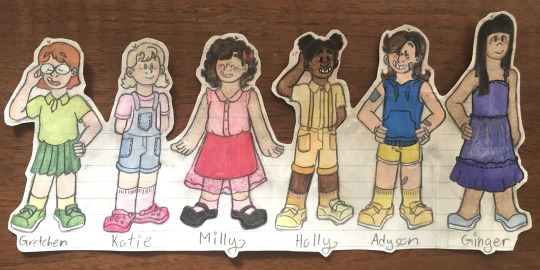


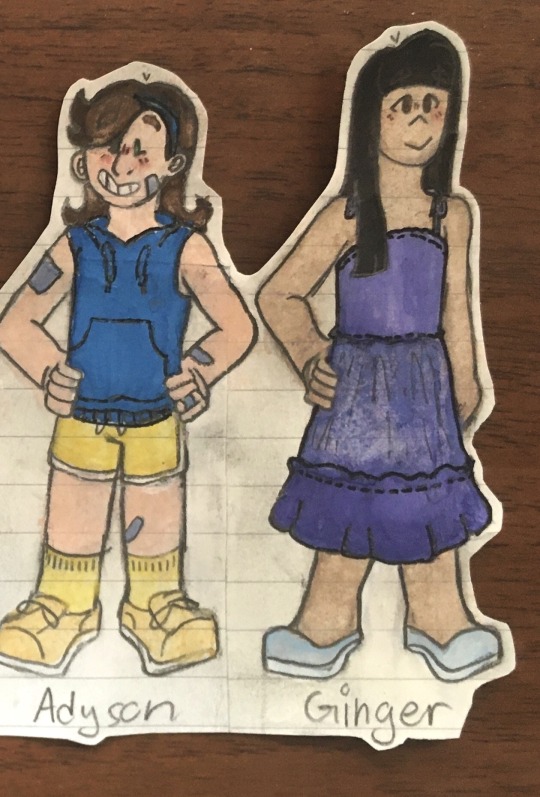
Recently I decided that the fireside girls are phenomenal and deserve much more characterization than they got in the show. I’m very sorry for how long it took me so long to realize this!
Anyways to start off here’s some casual clothes since we never saw them outside their uniforms in the show!! Explanations for each under the cut as per usual! :D
~
Just a disclaimer that while I used every scrap of evidence I could find from the wikis and rewatching the failed pilot episodes that I did have to make some stuff up for these. In the future I hope to build on what the show gave us for more fully fleshed out characters but until then here’s a start!!
Gretchen
I should let y’all know now that I did base their color schemes off of those in act your age! But I gave everyone a secondary color as well (if they didn't already have one)
Gretchen, according to the wiki is “Extremely Smart, happy” (extremely smart being unique)
She is also the only (known) one with the Saying A Word No One Else In The Room Knows Patch
From that we can take that she’s in the same sort of archetype as Huey Duck, Violet Sabrewing, Frida (hilda), Clemont (pokemon xyz), etc.
So I tired to base her outfit on them!
In this case it’s mostly Huey, Violet, and Frida because pokemon outfits follow different rules
Violet and Frida’s outfits are more similar because they’re what I consider “comfortable”
And while I love their designs I decided to go the other route!
The other route being Huey! Aka I wanted to give her a polo shirt skjdfhgk
Besides, for Gretchen’s age up design I think her outfit fits in the same category as Violet and Frida’s do! So we’ll get there eventually!
But anyways yes, I took the polo shirt from Huey then decided I should probably give her pants because she isn’t a duck where its socially acceptable to not wear pants sksajdhfgaks
So yeah a pleated skirt just seemed the right way to go yes? :D
Katie
Yes Katie is wearing crocs
Why you may ask?
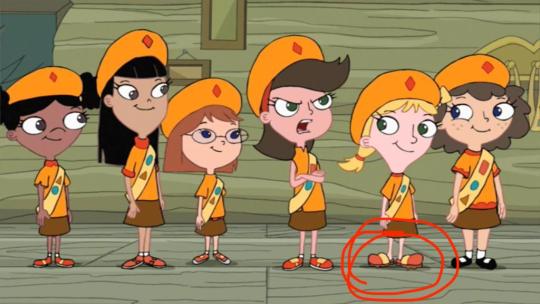
BECAUSE WHAT ARE THOSE SUPPOSED TO BE OTHER THAN CROCS
LISTEN- I tried, I really did, to come up with something other than crocs
But I couldn’t hecking do it
Well I couldn’t without ignoring this part of her character design which is 90% of what I have to go off of
Anyways from her wiki entry her personality is described as “Kind, helpful, cute”
This makes cute her only unique trait among all the fireside girls (except technically Isabella)
She’s also the only (known) one with the semaphore patch (that isn’t on her wiki but it is stated in bee story)
btw this is totally unrelated to my design but I’m thinking what if Katie got into color guard when she’s older? skjdhfakasj idk I think she would like it
Anyways!! At another point in the wiki it mentions her “running gag” (running gag in quotations because it only happened once I watched the episode specifically looking for this) where she says/does unusual things to get a glance from the other girls
I’m taking that to mean she’s silly!!!!!
Hence the crocs sksjdhfak
The overalls just seemed to fit her nature, and like I know Baljeet already has overalls but she’ll fight him for it k? skjhdsak
Milly
I’ll say here that Milly and Holly have the least characterization from their wikis which I’m very sad about
Okay so Milly’s “Kind, helpful, Happy” (no unique traits), is bad with secrets (operation crumb cake), and has one more Help Thy Neighbor patch because she went back to Phineas and Ferb’s house after everyone left at some point
Unfortunately from first glance we don’t don’t have a lot to go off of character design wise with these
However!! I know another character who's bad with secrets, helpful, and wears a bow in her hair!! That's right- Webby Vanderquack (btw very sorry to anyone who hasn't watched Ducktales I’m gonna keep bringing it up because I love it a lot I’m sorry)
So I loosely based this design on Webby’s! Aka dress shirt thing (in this case, a blouse) and a skirt that I think is neat!!
Webby’s design leans more into her nerdy side and so I made Milly’s lean toward sweetness!! (not saying Milly isn’t nerdy, there's just no evidence to suggest that she is so I didn’t lean into that) (also that would be too close to literally just drawing Webby’s outfit which I also didn’t want to do)
Holly
I’m restating that Holly and Milly get practically nothing from their wikis (Holly getting the least)
Like “Kind, nice, helpful” -The P&F wiki on Holly
Go girl!! Give us nothing!!!!!
skjdjhf okay but actually there is exactly one thing we can get from the wiki
While she doesn't have any unique patches, if we look at my patch reference sheet below
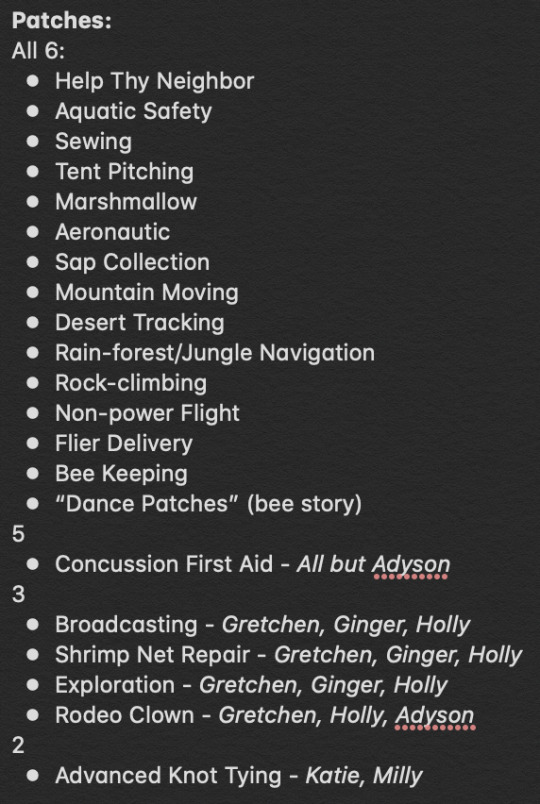
You may notice that for all the patches that 3 people got; Gretchen and Holly have all four (Ginger being replaced with Adyson for the Rodeo Clown patch)
In conclusion: Gretchen and Holly are best friends.
Look I know I’m blowing this a little out of proportion, but they gave me literally nothing so I’m running with what I have
Anyways!! I’m taking Gretchen and Holly being best friends as Holly is also wicked smart!!
So in conclusion that all adds up to I’m also making Holly’s outfit nerd-esq because I can
This time basing it loosely of of Satsuki from My Neighbor Totoro because she’s who I think of for an orange and yellow color scheme!
(she also gives me Boyd (DT again) vibes from the color I chose for the shorts though haha)
Adyson
Starting right off the bat the wiki gives us “Sometimes comical, helpful, accident-prone, nice”
Accident prone gives us bandages
Adyson also has the unique patch of the appliance repair patch
She also used to have the record patch for earning six patches in one day before Candace broke that record!
So I gave her running shorts and a sleeveless hoodie because I take that as she’s slightly sporty (athlesure but more casual)
Adyson was really much more straightforward than the others
I had an idea in my head that made sense so I went with it, y’know?
Ginger
okay but WHY IS GINGER SO TALL
I’m not even talking about how much taller I made her here because I was basing it off of the show!!! She’s stupid tall!!!
And like I know Stacey and her mom are both tall so of course she would be too but LOOK AT THIS

I MEAN ?????? BRO-
Anyways moving on! :D
I REALLY liked her light blue and indigo color scheme in aya so I tried to keep that!
I wish I could have incorporated a little more light blue but with the style of dress I went with that wasn’t really possible
Speaking of her dress!! Why’d I do that you may ask?
I dunno I thought it looked cute!
Listen- I love giving explicit reasons for each and every choice I make, but honestly there's usually a point where I have no ideas and go “eh its cute”
and thats what happened here!
Thanks for reading if you got this far!!
If I missed some details or you have ideas please come talk to me!! I really want to do a good job for these guys (they absolutely deserve it) and could use all the help I can get!
#fireside girls#the fireside girls#fireside girls troop 46231#gretchen pnf#katie pnf#milly pnf#holly pnf#adyson sweetwater#ginger hirano#my art stuff#once again im mostly talking under the cut!!#I really want to do a good job for these guys so feel free to talk to me about them!!#also rip Isabella im sorry I didnt include you#to be fair she has plenty of characterization and plenty of yall love her#but shes important to these guys so she'll probably show up more as I continue with these guys!!#fun fact this all started because I was looking at the firestar girls designs for a personal project#and I wanted to see if there was more information on them for their personal wikis#which opened my eyes to how little these guys have on said wikis#which is a crime!! so once again sorry it took me a while but I care them and promise to do my best for my interpretation!!!#k I think thats it bye folks!! :D#phineas and ferb#phineas & ferb#pnf
107 notes
·
View notes
Text
Ya know thinking about it, maybe there’s nothing more to Syds weird amount of trust for Farouk than gullibleness and pride.
There seemed to be a pattern of her not really internalizing the severity of Farouks crimes, she mostly just thought of him as an “asshole” throughout all the seasons and not someone doing deep long lasting damage to the people around her.
In chap 11 when they find the music box David ask what it is she says, “Nothing just your asshole parasite messing with my head.”
As if its Davids fault Farouks evil, or as if Farouks only a David problem, and not ya know, an extremely powerful supervillain bent on world domination.
I’m trying to figure out what Syds perception of Farouk was, so lets look at their major interactions.
1. Discovers his existence, chap 5. She was wondering what the problem in her and Davids relationship was and now she has someone to blame. I’ll point out, it’s likely she was only thinking of Farouk as an obstacle in the way of her and Davids relationship, and not as a horrifying abuser who’s had a chokehold on David for his entire life. Now the “mission” is clear, snip Farouk outta Davids head, everything’ll be perfect.
2. David and Amys childhood home, also chap 5. Farouk jump-scares them a few times. And I think as far as Syds concerned, that’s a cheap trick. She sheds a tear but then puts on a brave face and keeps moving. Just a horror show after all. None of it “real”. But then Lenny actually jumps out and attacks her, telepathically ties her up then starts grotesquely kissing David while he’s unconscious. And the way she talks, I think Syd internalizes Lenny as being like... a jealous ex. The kissing, the “you stole my man” type language. Man, this relationship obstacle just won’t get out the way. And then...
3. Mental Clockworks, chap 5-7. In the white room Farouk reveals his true form and chases Syd down which scares the shit outta her. But, important note, he doesn’t actually touch her before the delusion is put in place. It’s still very much not real.
Anyways, what’s a horrifying display of control and power for everyone else worked a bit differently for Syd. She was the only one who noticed anything was off. And she couldn’t place it for a while, which worried her, and she eventually gets incapacitated by Lenny. But then, she’s woken up by Cary who takes her into a phone booth and tries to update her on what’s happening, only she’s already figured it out. I’ll point this out as a moment of overconfidence, she’s visibly proud that she was able to see through the illusion. She’s not like the others, she’s a hero archetype. And being that means when Cary hands her the glasses and tells her to go save the others she’s super confident in her ability to do so. She’s the hero after all. And when she does put on the glasses she remarks, “She thought it’d be more interesting.” She’s actively downplaying this nightmare. I don’t hold it against her but my point in saying all this is that it comes back later. This is another instance of her thinking Farouk’s “Not that big a deal.” Underestimating his abilities. I mean, she saw through it after all, she could probably do it again if she needed too... right?
To summarize 3, Syd sees herself as the hero who saw through Farouks cheap illusion. She feels stronger than Farouk here, like he couldn’t hurt her (really hurt her I mean) even if he tried. And in that, she can’t relate to the others who treat it like a big deal or like a traumatizing moment in their adventure. It was just a standard hero vs villain fight to her. Really hope the points getting across cause this’ll come up later.
4. White room, chap 8. Another interaction with Lenny only this time she’s on the ropes, looking a lot worse for ware. Syds not scared of her anymore, or so she tells herself at least. She saw through Farouks tricks. She can do it again if she has too. Nothings gonna get in the way of her and Davids happily ever after. Except Lenny has a good point... she’s still inside David. Still attached to his mind. She could explode his brain if they try to rip her out forcefully. And David can’t handle himself against Farouk, Syd knows this. Cause Davids never won against Farouk up to this point. Getting out of Mental Clockworks was a team effort from her, Melanie, Cary, and Oliver. If it hadn’t been for the crown they wouldn’t’ve gotten out of their. Syds role in this was to keep Kerry and Rudy safe until Cary could complete his end of the plan. And she did. But David was helpless in that, as far she knows. So she, the hero, needs to do something. Just sitting around isn’t good enough. So... she switches with David again. Using a true loves kiss too, a truly fairy tale worthy action, one for the books.
She’s fully possessed now, completely outta control of her own body, but Farouk only used her to get Kerry. It’s a very short moment for Syd, she might not even remember it. When she wakes up she says, “Did we win?” She honestly might’ve just blacked out after the kiss. Because they’re not telepaths their minds are probably much easier to push to the side than Davids. She might not’ve really... experienced the possession is what I’m getting at. And she’s once again most concerned with David.
D: “You should not have done that, as much as I like kissing you.”
S: “It would’ve killed you.” She says that last line not in a concerned way, but in a playful-ish way. As if to say “Obviously I saved you. I’d destroy the world myself if it meant saving you.”
Ya know what, I’ll point out here also that David once again failed to beat Farouk. Syd managed to get Farouk out of his mind but David still couldn’t stop him in the real world.
5. Plaque, chap 9. As explained in show, Syds been part of the team hunting down Farouk and trying to stop him from finding his body. Before chap 12 she and everyone else is under the impression that Farouk is the source of the “maze virus”. A psychological plaque that freezes everyone in their tracks and causes them to chatter their teeth. Disturbing, but... just based on other stuff we know about the character... she probably doesn’t care that much. Her main focus is probably still David. And when David comes back, she immediately blames him for disappearing. Her context here being that he was found in the club they followed Farouk to, next to a bunch of teeth chatterers mumbling, “Help them. Their in the maze.” Clearly, he’s been somewhat involved with the events of the past year, so why hasn’t he contacted her? Why hasn’t he included her in it? Why’d he abandon her? He says he doesn’t remember anything? Ptonomy says otherwise. Clearly he remembers something. He’s keeping secrets. She gets why from the others, but why from her? They’re supposed to be a team. And he abandoned her, to go clubbing with Farouk or whatever it is that he was doing their.
6. Music box, chap 10. Davids back. Maybe she can just pretend things are normal. He leads them to the middle of nowhere and they find her old music box. Farouk. That asshole. His little jump scares and memory tricks won’t get to her. He can’t hurt her, remember? This is all he can do. Illusions, trick. And she’ll see right through them every time. Besides, was reminding her of her childhood really the best he can do? Yeah she’s got a childhood, so does everyone. She’s over it already. (I’m starting to type more and more in Syds perspective.)
6.5 Syd the illusion breaker gets caught in the maze, chap 12. Only... she’s out of it before David even enters her mind to save her. She sees that he’s there, doesn’t know why, but decides to use this as an opportunity to teach him a lesson. We all know the lesson though. The headline in this particular case is, “David never saved Syd from her maze.” He never even saw it. She doesn’t know what he’s talking about when she mentions it. He entered her mind but she’s the one in full control. Scary good control even, props to her. The lesson she’s trying to teach him is sort of... her own thought process on heroism. “Love can’t save us, it’s what we have to save.” Up to this point “love” is all Syds been fighting for. It’s been the driving force behind her heroism. She’s done some messed up things in her past, sure, but all her problems only made her stronger. They made her the “truth seer” she is today. They led her to David, the best thing that’s ever happened to her. No villain can hurt her more than she’s hurt herself. This all... obviously doesn’t translate perfectly to David. That’s just... not been his experience.
(Skippable David Tangent) Farouk hurt David the most that any one person could. And David couldn’t hurt himself more even if he tried. And all Davids pain hasn’t made him mentally stronger, less gullible, or less sensitive. The opposite in fact. Davids minds been split, unbeknownst to Syd. He’s in a constant state of confusion. He keeps getting tugged around by friends and enemies and doesn’t know what to do about it. Davids pain hasn’t shielded him at all, just caused him more strife. He’s even still being manipulated by his abuser. The survivor story just doesn’t work on him, at the moment at least. As far as Davids concerned his “strength” comes from his powers, and he didn’t get a choice in those either. Syd doesn’t see any of this, she’s not a telepath. She hopes her story will help him but... it really only applies to her. Back into her perspective though,
7. Lenny’s back, chap 15. I know this isn’t a Farouk interaction but it is sorta important. Davids not listening to her. She’s trying to remind him of the mission, trying to keep him focused, but clearly it’s not working. Losing his sister really affected him. She understands sure, but he won’t even talk to her about it. Love is what’s supposed to be used to help each other through these dark times, to make sure people don’t feel alone. But he’s isolating himself from her. He isn’t “saving love” he’s pushing it away. That’s not what heroes are supposed to do. Farouk is once again in the way of their love. She can’t blame David, and she knows it’s not her fault, so Farouk.
But the headline there is she’s downplaying his sisters death. As if it’s just another trick to mess with him, an obstacle to be hurdled over. Like the music box thing. But... his sister died. In fact... Lenny was more immediately comforting to him about it than either of the Syds were.
Syd still isn’t internalizing the pain Farouks causing to others. All she’s internalized is her own wins against him and the fact that he’s never permanently damaged her specifically. Or so she says. He’s still just a ghost in a haunted house.
8. Lenny talk, chap 16. Syd comes over to gloat. She sees through Farouks trick. Lenny’s not gonna frazzle her, or David. She’s just another obstacle to their happiness. Only Lenny drops a hard truth on her. And Syd doesn’t seem to want to hear it. She’s stunned at. Tbh... I think she walks away deciding not to believe her. It must be another trick. She just said that to mess with her (again, Syds thoughts). She really really wants to continue thinking of Farouk as “just some asshole” who they need to work with and/or defeat so her and David can finally have their happy ever after. At this point, if she actually started thinking of Farouk as dangerous to her, as a major threat, it’d feel like giving him power. The power of fear, over her. She refuses to be afraid of Farouk, cause she knows that’s how he tricks people. That’s how he controls them. So she doesn’t listen to Lenny. She resolves to continue downplaying Farouks crimes. A dog barking in peoples ears.
9. The cave, chap 18. In between this and the last one David left her again. He really doesn’t get what “saving love” means. But she dedicates herself to him again. If he won’t save love, she will. She’s a hero after all. She’s beaten Farouk in the past and she’ll beat him again if she has too. And then... the cave. Incorporating what another fan has said, even if Syd does pic up on Melanie being Farouk, she knows her future self wanted to work with him for some reason. He was the key to saving the world. He may be a house haunting asshole, but if he saves the world, then there’s gotta be something more to him... right? Melanie complains about Oliver some more, she’s over it. But then Melanie starts showing Syd images. Syd doesn’t know how she’s doing that, but some of the images are from very private personal moments. And they’re all centered on David. These must be memories. Both her and Davids. How Melanie is doing this can go on the back-burner for now, what is she trying to tell her with these? That Davids crazy? No, Farouk’s the one who was behind all these things. Davids “her man.” Her one true love. The problem in their relationship has always been Farouk.
But then... there are all those moments after she got Farouk out of his head. Him keeping secrets. Him not confiding in her, or being there for her. Him constantly leaving her behind. That’s not how love’s supposed to work. A psychopath? Well, when you say that... and you show these images on the screen... and you show him torturing Oliver ( a victim) to get to Syd. And enjoying it, almost like he just wanted the excuse to go all out. Like it’s not really about saving Syd. Or love for that matter. Syd maybe admits to herself at this point that Davids fairly unhinged. He’s had a rough childhood though, there were bound to be some sharp edges here and there. He tortures Oliver for a long time though. And it really starts to feel like he just likes doing it, not that he’s doing it cause it’s “necessary”. It doesn’t even work.
And then... Melanie shows her Future Syd. She matches the description David gave her. And there’s David, in those same pajamas he wears. And... he’s kissing FS. He didn’t tell her about that. It’s not cheating cause it’s her future self. But... they talked about this. David was the one to say it might feel weird. Why not tell her? Why keep that a secret. Even if it’s not cheating, it certainly feels like it. It’s a huge betrayal. And he doesn’t have Farouk as an excuse. Davids just... a bad person. She’s starting to piece together the point of all this. “Legion, The World Killer” yada yada.
David hasn’t been loyal to her. He hasn’t saved loved, he’s not going to save love. The path he’s on is dark and selfish. Could he destroy the world? They’ve known he could since season 1. They never thought he’d actually do it. But wait no, you can’t give up on love that easily. He’s a good person. And then Melanie shows it all again. And she shows him kissing Lenny. And she shows FS telling Farouk about David. And Syd can’t help but concede. Davids too far gone. Farouk may be an asshole, but David lied about everything. He lied to Syd. Again, Davids not going to save love, he missed the mark on that. Davids going to end the world.
Very important to point out here, as I’ve tried to build it up, Syds internalized herself as a hero who doesn’t let anything get to her. Farouk can’t hurt her with his illusions and tricks. She’s seen through them before and she’ll do it again. But David betraying her? Keeping secrets? Playing with her heart? That hurts more than anything Farouks done to her. She invested in David. She was on his side no matter what, but he wasn’t on her side. So if FS says Davids evil and has gotta go, than she’ll believe her. He’s gotta go.
All of this hopefully explains my theory on Syds specific moment-to-moment reasoning thoroughly
I also wanna say though, if I’m right this makes Syds moment on the mountain make more sense. All the specific unexplained discrepancies.
She says she knows it was Farouk who showed her all that. Because she doesn’t perceive Farouk as that big of a threat and again, as mostly a house haunter. Those were clearly memories, she doesn’t care that the infos coming from him, and she believes she can tell the difference between an illusion and something real. so Davids gotta answer for that.
She gets a detail wrong, she says “He went to see her, after you quit.” But we all know he saw her before David quit and specifically set him up. Syd doesn’t know David specifically broke their rules after they set them. She thinks he kissed her beforehand and didn’t tell her for whatever reason.
And again, she doesn’t fully understand what everyone around hers been through. Hence, “The son of sam” thing. To her, Farouk maybe evil, but you can see through his tricks if you just try hard enough. Even though he possessed her she didn’t really register it happening. At a certain point the things you do when he’s in your head are on you (says Syd).
Oh, and also majorly, the “Farouk, your enemy” thing. She never really care about him all that much. He was just an obstacle. David was the one who had a weird complex about him.
Tl;dr Syd doesn’t view Farouk as much of a threat. She doesn’t register or internalize the pain he’s causing to the others cause he’s not doing any of it to her. Syds main focus is David and when she realizes what Farouk’s showing her are memories, and that David’s betrayed her and isn’t planning on “saving love”, that hurts her more than anything Farouks done. Thus, she turns.
18 notes
·
View notes
Text
DC COMICS: Incoherence as Not-a-Bug-but-a-Feature (Spoilers for Batman 89-100)
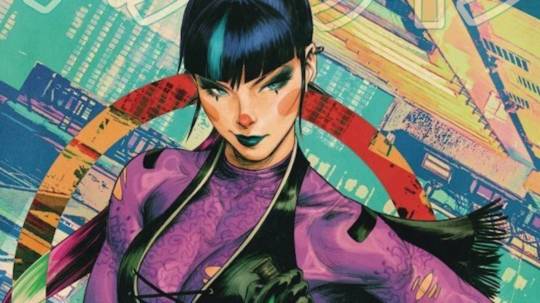
Due to the emergence of the new Batman villain character Punchline, I wound up buying the last 12 issues of Batman and reading them in a single sitting. I’ve had trouble following DC comics for a while, constantly feeling that they were in trouble since back in the mid 2000s (with a glimmer of hope here and there). The act of reading DC comics has been a frustrating experience, where individual good stories and runs were laying around in the context of a lot of things that didn’t make sense while the company’s thrust felt chaotic and ideas not well blended. Every status quo change seemed hard to figure out the rules of enough to parse the context. We’ll get into the background of this, but my reading today of this extended stretch of comics that keeps losing the plot in favor of a fever dream of what’s happening at the moment with specific characters that refuse to cohere, it became obvious that what I had been looking at as subtext or critique was actually the text. I could see the messed up trees but was missing the the forest the universe was trying to describe.
What happens in these issues (Batman current series 89-100, I missed the beginning of the first of 2 arcs) is rolling war between the major Batman villains and the heroes (plus Harley Quinn and Catwoman), which shifts into a Joker and Joker adjacent vs. all as the Joker double crosses everyone then manages to steal Bruce Wayne’s fortune. We meet 3 new baddies – Underbroker, whose schtick is putting ill-gotten gains beyond the reach of the legal system (with an explicit line to rich globalists drawn), the Designer, who back in the day offered the four A list Batman villains plans to achieve what they most wanted, and Punchline, who is your toxic ex’s new millennial GF who really has it in for you (there is also a new good guy Clownhunter, which is a whole different thing, and a new costumed detective that predates Batman). This doesn’t convey the chaotic nature of what is happening issue to issue, but there’s more than one Batman hallucinogenic spirit quest, dead characters ostensibly walking around, a plan revolving around the Bat’s origin story that tells some version of it several times, and a no-nonsense declaration that the Joker, as the Devil of the Batman spiritual system, cannot die. The whole thing has the effect of convincing you there is no definitive sequence of events, only versions.
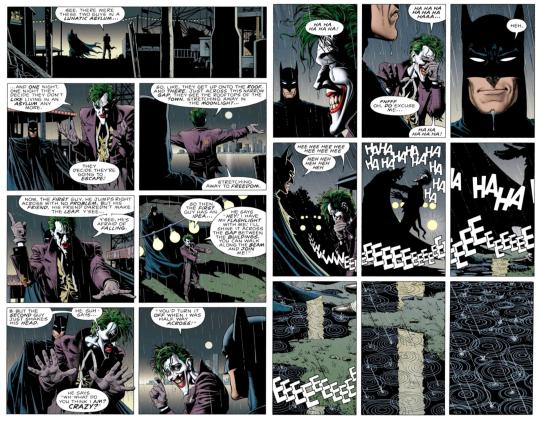
Alan Moore’s Killing Joke is not a favorite of mine, for a number of reasons. But the ending holds up. The Joker has done terrible things there is no antecedent for, and Batman wonders aloud if this never-ending dance they do ends in anything but both of their deaths; can they uncouple from the unhealthy duality the cycle of which simply repeats. The Joker responds, well, with a joke about two lunatics trying to escape an asylum. One jumps the roof to the next building, while the other is too scared to try. The escapee offers to hold a light while the other crosses on a beam but he says no, no you’ll just cut the light while I’m half way across. This not very funny joke nonetheless has a bunch of resonances – BM and Joker as conspiring co inmates, BM wanting to break out, a commentary about their natures (almost a reversal of the frog and scorpion story where the scorpion won’t go because he knows how this ends), but mostly it implicates BM as the one who is enabling the cycle, the reason why it won’t end. They both laugh uproariously, and the ambiguous final panels can be read as the fundamental realization of his complicity causing BM to kill J. A lethal joke indeed… except, next month, we see the both of them again. In broader context, the ceaseless cycle of the diad is reaffirmed. This has been hellaciously sticky as an idea in the Batmen universe.
My realization of what DC has been doing is pretty banal in its pieces. Marvel has “ground level” heroes while DC has a mythos, a pantheon. Their archetypal makeup is strong, the seven JLA members lining up with the pantheon of Greek gods and the Chakras weirdly closely. DC has big characters that are somewhat flat which they can use tell big bold individual stories that are cool the way legends and fables are cool. But these stories require bold strokes that a bit incompatible with each other. People get attached to these iterations. Meanwhile, Marvel trucks in soap operas where the characters give you an empathetic stand in and are narratively flexible. Marvel events are usually about the writer vs. the company, asking you to sympathize or deconstruct the creative impulse amid efforts to impose control or order. DC’s events are about editorial vs. the audience, the shapers vs. the forces of the world. It may seem obvious, given this description, that DC’s focus is on an archetypal tableau though it may be less obvious that this tableau is under extreme pressure from expectations when trying to tell ongoing tales month in, month out (or semi-monthly in some cases). The stories are constantly compared against the big stories that have gone before, and the audience’s ideas of the characters exert pressure to push them in directions that capture “the” version they believe in. This circle is not possible to square.
DC and Marvel both have a multiverse of sorts. DC used to tell “Elseworlds” stories which were later tucked into pocket universes. DC invented crossing over between “realities.” DC’s continuity is heavy baggage and they began to have “Crises” to resolve the narrative incompatibilities. These only made things worse as you can’t get rid of the past people have a relationship with – it will come back. Now you have to explain that away too. Marvel just lets it lay – forget about the iffy stories, they count, sure, just no one is ever going to talk about them unless they have an angle. Marvel continuity is all angles and amnesia. This is just easier to do with dating and rent and your ancient aunt’s medical bills than with Gods. Marvel’s multiverse is about sandboxes that you can always dump into the mainframe if they work (and never really mention the sandbox again).
There is a shift that occurred in the industry in the 2004 to 2005 era that is less remarked upon than many upheavals in comic’s history. Marvel had gone through a period of incredible new idea generation in the early 2000s after a late 90s creative cratering but had just fired the pro wrestling inflected soul of that moment (Bill Jemas). DC was coming off of a period of trying to do moderately updated versions of what they basically been doing all along. The attitude was “yeah we’re under stress from the combined history of these characters, but we got to keep telling the stories.” Geoff Johns was one voice of DC over the 99-04 period that showed potential - he seemed to get how to find the core of characters and push them into a new in sync directions if they over the years have lost a clear identity. But mostly he had internalized a basic schism between something mean that the audience wanted, and something good and wholesome about the characters themselves, and figured out how to mess around with this in a equilibrating fashion.
Interestingly, the ignition point of the main forces that were going to blow DC over the next decade and a half was a comic that had virtually nothing to do with any of those main forces. Brad Meltzer, a novelist, was hired to do a comic called Infinity Crisis, which sold extremely well and was, justifiably or not, recognized as an event. At the same time, everyone also kind of hated it because the dark desires of some DC fans were pushed forward just a bit too much for comfort and for a comic with Crisis in the name it didn’t do a whole lot other than “darken” things. Nonetheless, this lit an “event” fire at both companies. Marvel chose a shake up the status quo for a year, then do it again, pattern and was off to the races (I have written about this, and more, here) while continuing its Randian framing of beleaguered do-gooders opposed by rule making freedom haters.
As this was playing out, Dan Didio quietly took power in DC Editorial. His outlook was more Bloomian – he seemed to spark off of writers who exhibited anxiety of influence. He recognized Johns was the one person they had could be promoted into something of a universe architect, starting work on two key projects from which the rest would evolve. The first, was bringing back Hal Jordan as Green Lantern and diffracting the GL universe into its own symbolic system, with parts frisson-ing other parts, and almost a Magic the Gathering color scheme of ideas. The other was to build up to Infinite Crisis, which would become the model for most of their universe changing events until the present day.
The basic frame is this: DC heroes want to be good (in a sense of their inherent nature) but forces outside form a context that makes them fall. It’s a very gnostic universe, DC. They examine reflections of the concepts, invent scapegoats for certain tendencies (see Superboy Prime as entitled fanboy, Dr. Manhattan as editors that try and fail to mend things, etc), make characters violate principles, rehabilitate them, then show that the world if anything is more broken than before. This is kind of Johns’ thing and it fits Didio’s narrative as historicval tension fetish. But then came Scott Snyder (not to be confused with Zack) who began to work on Batman in 2011. Since then, as much as Justice League is pushed as the central title and Lex Luthor has been pimped, Batman has been the core of the universe and the Joker the core villain.
Snyder had the same continuity conflict wavelength but was significantly more meta and able to contain multitudes than Johns. He was the first to make an explicit mystery of how there could be several Jokers around at one time (who are the same but not, he posited 3 – man, Christians!) that seems prescient given the near future coexistence of filmic Jokers that are not able to be resolved. I believe he was the first to begin to tease out an idea – that different versions of things in comics are not a diffraction or filter effect, a using the set of things that work best for that story and leaving the rest, but are a matter of the archetypal system of the audience coming apart. From an in story perspective what appears to happen is that multiple versions of incompatible things exist in the collective unconscious of the continuing narrative, and this is something that the characters may become conscious of.
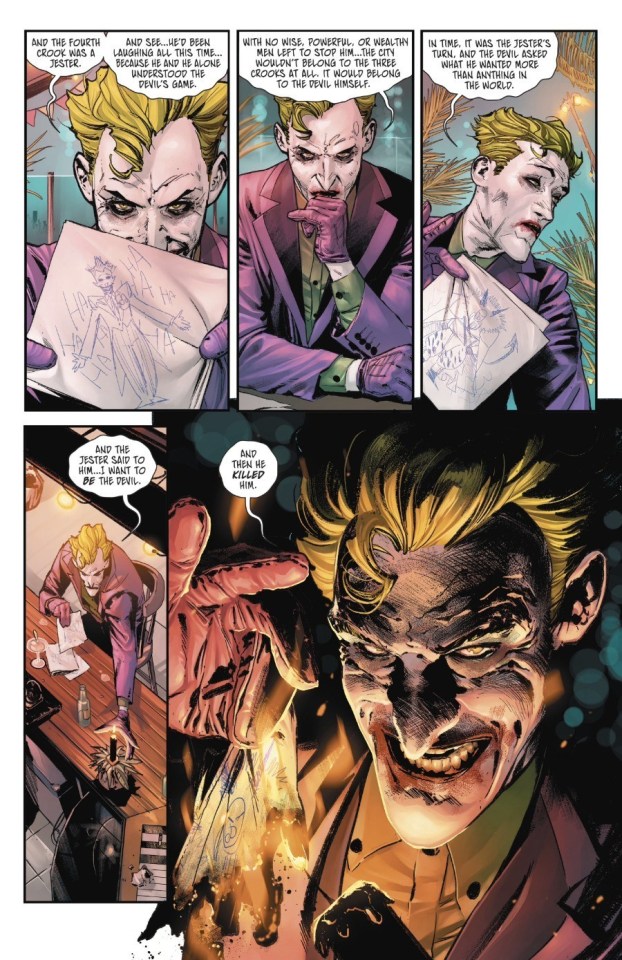
The run I just read is written by James Tynion IV building on the above trends. The trick seems to be going all in on the Jungian aspect (at Jung’s most religiously epiphanic). The Designer was a progenitor and adversary to Batman’s predecessor and his intellectual approach eventually defeated the detective… broke him. At some point in early Batman history, the Designer brought the top four Bat-baddies together and offered each, in turn, a plan to achieve what they most desired: the Riddler, a way to achieve an empire of the mind; the Penguin, power; and Catwoman, money. They are all elated as they await the Joker to come out. The Joker emerges with a furious Designer on his heals and promptly shoots him dead. He explains that he didn’t like his joke in the form of a fable – the devil offered four people the path to their greatest desire: the three chose earthly things, but the Joker’s wish was to be him, to become the devil. The story proceeds to suggest that the Joker just exists, he is present as a necessary component in the system. You can kill him, yet he is alive.
DC has been using physics metaphors for the nature of their reality since Flash of Two Worlds in 1963. The multiverse as a continuity concept was their idea and the holographic universe of the hypertime was a thing. It seems like since Dan Didio took over, they’ve been heading towards a concept of broad superimposition, of measurement effect being weak, of the universe being like a quantum computer with all possibilities coexisting and the story instantiating not one reality but a path through all the possible ones. By making Batman trip balls through quite a few issues and relive his origin from different angles, the story is one of its own instability and the heroic task that confronts our hero is attempting to actualize the world. The Joker is the Devil in the sense of lack of fixed meaning, of relativistic chaos, of the world not making sense because it’s unmoored nature with ultimately no knowability. Batman, in this story, functions as a postmodern knight crusading against the impossibility of epistemological grounding.
There’s more going on, sure. One plot is, literally, defund Batman. There is rioting, people brainwashed by being exposed to toxic ether, people paid to go to theaters even though they will die as a result, and questions about neoliberalism similar to that one Joker movie. Punchline has no personality yet (Tynion’s not the best at that) but she serves well as a generational foil for Harley – a rudderless ideological vacuum susceptible to Joker-as-idea-virus rather than an unfulfilled MD who felt alienated due to the structures of her life and was seeking escape into structureless possibility. The Designer stuff is both continuity play (See why they changed from goofy villains to more “realistic” ones! Look how pulp heroes informed superheroes!), a comment on the nature of a longstanding narrative (strong intentions die out as Brownian motion overwhelms momentum), and a lawful evil/chaotic evil setup of the dualism of apocalypses (overdetermined authoritarian vs. center does not hold barbarism). But the thing that ties this to the past decade and a half of DC is the sense that the reality is fluid and susceptible to change or outright s’cool incompatibility.
This is different than other flavors of meta in superhero comics. Grant Morrison believes the archetypes are stronger than the forces that seek to bend them. Alan Moore wants you to deconstruct your sacred cows and probably hates you personally. Marvel might play with self-awareness, but effortlessly resolves inconsistencies after it’s finished playing. DC, at this point, allows you to watch the waves solidfy into symbols and dissolve, and the constant confusion and lack of grounding is more of a choice then I thought this time yesterday. The conflict theory of DC reality has been in full swing but this looks to be turning towards a kind of Zen historicism, holding contradictory things in your mind at once. Warren Ellis’ JLA/Authority book is the nearest comparable text I can think of. I need to call this, but I didn’t even talk about Death Metal, DC character multiplicity as meta-psychosis event extraordinaire. Comics just keep getting weirder.
90 notes
·
View notes
Note
Also I feel like the Dragon Knights are all made to appeal to certain demographics. Lancelot is the twink of the group, Percival is basically a male tsundere, Vane is the beefy dude and Sieg is definitely for the DILF hunters. I've seen people say that they're basically the love interests in an otome game and it's almost sad that I can't even deny it.
omg yeah
like i do think originally it was a bit accidental? But the first event attracted a huge female fanbase and it only got worse when they added Percival (who was the character who was picked the most by suptix for a long, long time, and had a major female following sef shipping with him. Which is why there's a lot of romantic coding in his holidays lines the further down the year you go - they saw who was paying for him and they went "okay we can cater to that")
It still cracks me up because in the first event you can feel that they're a bit trying their more traditional formula back then - Lancelot doesn't look too far off from characters like Albert, Siegfried's original design could be associated to chara like Seruel (i mean all in the old timey characters), and tbh i do feel like Vane is more of the exception (we've had a lot of beefy with draph men but beefy humans are rarer to come by). And they had them alongside Sophia the sweet healer girl with her ass out and Isabella the dark sorceress for people who are into that. The very first event feels like it was evening it out and not too unlike event like the Irestill saga.
But the fact not only it attracted generally a really huge female fanbase (which is what Lunalu was a response to - and that's why one of Lunalu's first content was her crossfate with Siegfried where he praised her for her passion and encouraged her for it), but they turned out to be big whales. And well. A good gacha knows to take good care of their whales.
So then they just had to polish the characters even more in that vibe as it went on, all of them fitting even more of this archetype, and tadaa. And tbh this is also why there's barely been any female characters in the kishi saga ever since the second event (not really counting the Wales’s mom), aside from the one in Siegfried's event which was mostly here for the tragic backstory anyway, and Florence which is only because she was introduced before the saga really took off actually, via Gawain's wind FE. Like clear "listen we know you're here for the pretty boys, here they are. Sorry people-who-likes-women-only this is not for you"
and they are indeed called often "coming out of an otome game" (Percival's 5th year bday line is downright into that territory that bastard), they're also often called the boysband, or the fanservice squad, all that jazz. This is also why the dudebros's types of guy who want everything to cater to them hate them so much and would be vocal against them anytime they get some content (because they're just "women bait with their silly romantic interest toward them", which i don't want to hear from a man who's likes on twitter is full of porn from the ladies of granblue and yet i see ways too much.)
But yeah, I do think honestly it's a thing we *could* extend to many of the male characters of the saga but it just so happens that since they are the most popular/have an event every year for 8 years now without counting their appearance in others media, and the fact their fanbase brings a LOT of money to cygames, they will get used for pandering. Percival being the worst of them in term of how far they're willing to go with the romantic subtext (no this is not me being biased there's a chart out there i can't find again where people have sorted the guys in how they show their feelings for White days on a "romantic" scale and Percival and Eustace were breaking the charts).
so i don't know how much the original three were /made/ for it or expecting it to blow up this way but they sure as well completely embraced it and rolled with it and decided to feed us with it.
and I for one completely embrace that. It's nice when fanservice is actually serviceable and since it comes with really amazing stories anyway, this is all cool.
#we've been talking so much with friends about how much we'd totally play an otome dragon knights game#and i'm not going to defend myself to anyone about that#i've seen enough type of gbf fans to know i don't owe them anything about the way i interreact with the game#so what if they all are otome games chara they're bangers and fun and op next question#ichareply#ichafantalks gbf#infullmoon#ichablogging 4kishi
4 notes
·
View notes
Text
Soul
Breaking news, everyone: Pixar made another slapper.
I’m gonna get it out of the way first, but the only (and yes, only. Not like someone trying to say “only” even though they have many more nitpicks that they just don’t want to talk about) problem I had at all was that the super high realism of the settings of Earth kind of made the more cartoony faces of the people look a little more off. But, it’s kinda like the same thing people were talking about with that cat in Toy Story 4. It looks super real, which is impressive, but I feel like it was almost too real compared to the faces. Obviously it was too real compared to the supernatural settings because that was intentional, but yeah. It’s not even a big problem, it’s just the only one I can think of. I do think the realistic renderings of hair, light, water, etc at least work with cartoony stuff, but apart from that it looked almost like it could’ve been a photograph, with no exaggeration in the buildings or anything else.
I mean, I love the faces, so I definitely wish they went the extra mile showing extra personality and character in the buildings, as faces do with characters. Considering the faces matter like a bazillion times more, I still think they knocked it out of the park on the visuals. People with more investment and knowledge into the topic already said that the faces of any of the people of color felt cartoony and unique while also being true to life and respectful (My family recently stumbled onto some old animations from the 30s and lemme tell ya... We’ve come a long way), but seriously the characters that sold me on the visuals were the Picasso-esque beings who may or may not be the Gods of the universe maybe?
Spoiler boundary of course. It’s definitely worth a watch.
And that’s honestly what made the realistic world so much better. When the accountant guy went into the real world to set the count right, it was one of the most fun I’ve had just watching something. The sheer contrast between him and the world was so much fun, and it even solidified that those beings weren’t even acting in a different dimension or anything. They’re literally just beings that exist, meaning that all the other parts with the unborn souls and such are just as real as Earth. Or, even better, they’re the ones who can just casually rip a hole in dimensions. As far as depictions of Gods go, if they are even Gods at all, I think they’re one of the best I’ve ever seen. They feel like they could actually be how Gods actually exist, since all the commonalities of Gods involve supernatural power, which would suggest they’re supernatural themselves. I mean, I have a story with Gods in it too and they’re basically just that although admittedly a lot less imaginative.
With those guys being my favorite design, second place definitely goes to the lost souls, although obviously for more subjective reasons. 1) They’re purple, 2) They have one eye, 3) That eye is yellow which I always think is the best compliment to purple, 4) Tentacles, 5) Creepy in a kid’s movie. Franky, I would’ve made them a lot creepier, but even then they’re super creepy, if not visually then in their behavior. They’d just be kind of sad if they were just mumbling around, but since the first introduction to them starts charging at the main characters like a deranged monster. Considering how weird everything in that dimension is, finding something that isn’t nearly as innocent as everything else instantly invokes fear, since you have no idea what that thing can and wants to do to you. Sort of similar, I would’ve also made the “In the Zone” moments a bit more crazy and colorful, like when Joe fell through the void between the road to the Great Beyond and the You-seminar (is that how it’s spelled?), but these “I would do it differently”s might just be a fault of my design ideas or just subjective interests. I would’ve watched 2 hours of pure, nonsensical abstract worlds like the You-seminar with no explanation to how they work.
I definitely have a relief with the story, mostly entirely revolving around 22′s character. I was kind of worried she’d be too childish to really enjoy, but I feel like she was done really well. All the major historical figures’ remarks on how hopeless she were both funny and also really tied into her character “flaw” at the end as she was a lost soul. It might not be the most unique character archetype of all time, but it definitely makes sense, with all the people bringing her down implanting in her mind that she was an anomaly, and after a while was just sort of following it. Plus, she seemed genuinely interested in Joe’s weirdness, instead of being super mindlessly irreverent. And her being able to expand Joe’s understanding about his own world, like with the barber and his student, brings her up as more than a whiny, bratty child in the scope of the story. She didn’t JUST learn.
Even though I kind of expected it from the get-go, I’m also relieved that the movie didn’t shy away as much with the dark elements of death. It was kind of suggested that this wasn’t going to be a perfectly casual romp through a magical afterlife like Inside Out was with the mind because of the unborn souls unabashedly saying “Hell” in the TRAILER of the movie. I feel like that alone made the story super interesting, because it shows they’re actually going to be a bit more serious with things instead of just simplifying the unknowable complexities of the before & afterlife. Even with the dead souls going into the Great Beyond, it was a mix of being weirdly peaceful for some and super scary for others. My family thought it was peaceful for the most part, but my mom specifically though it was terrifying, and even though it’s a lot more peaceful than almost all other depictions of death, I can’t blame her. The souls were just kinda accepting it, like they’d been brainwashed or something, but still acknowledged that they were dead and were going into the afterlife. Plus, Joe, being the main character who we are supposed to sort of reflect in a way, was super freaked out by it, so that could easily suggest it’s to be afraid of and the other people are the weird ones.
I think the true message of the story being so strange was better too, because it would’ve been so boring if it fell into a super basic message we’ve heard millions of times. I feel like it has a similar sentiment to the basic messages, but is at least a more interesting way of saying it, if it is even like that in the first place, because it’s also somewhat vague in a good way. I think my brother/mother misinterpreted and simplified things a bit too much, where they thought it was sort of like a happier way of saying “accept your lot in life and don’t change it.” I could probably go on a full other rant about why I think this is wrong, but part of it is I don’t really know how they came to this conclusion in the first place, considering with that scene with that guy who threw the computers off his desk as his lost soul was cured (I guess you could call it that?), who obviously realized he wasn’t okay with his lot in life and was destined to change it. I think they sort of misinterpreted “the spark” and other things it as a 100% for-real, this-is-how-the-real-world-works sort of way, and not as much as a fictional way of saying things. Not necessarily symbolic, but I guess symbolic also? It has some of the same weird logical problems as the Cutie Marks from My Little Pony, except they’re obviously better since Cutie Marks determine your life down to your very job some of the time, while “sparks” are more vague and seemingly up to you. They’re more like when an unborn soul realizes there’s something on Earth they want to figure out, not necessarily their hobbies or jobs. For example, they kind of cited the barber character as the one who supported their point, but I think he does the complete opposite. He wanted to be a vet, but he ended up being a barber. But, they sort of assumed his “spark” was to be a barber, and that his personal interests didn’t matter because the “spark” forced him into a less favorable job. But, in reality, I feel like his “spark” is more his interest in love for the people around him, which is why he decided to get a more practical job to support his daughter (wife? one of the two) when he really needed to. Plus, he still enjoys being a barber because his devotion to love lets him connect to people as he cuts their hair. After all, he seems to be succeeding in his goal, since Joe was just like “Hey, let’s go see this guy he’s the exact guy we need!” People who don’t show love and interest for others don’t make that kind of impression in people’s minds. I feel like if we knew each story of everyone’s life down to the last detail we could fully determine what the mechanics of the world and its people are meant to say from a fictional context, but with such a limited selection I don’t think you can say something so sure. Sure, every choice in a movie is made specifically for a purpose, but I feel like if a movie tries to hard to be like “Oh but don’t worry here’s an exception” a million times it gets bogged down by its own attempt to make the message as obvious as possible.
Anyway...
There are also a lot of neat little details I loved, like how even though they did this for basically no other point in the movie, they made sure to include people from all around the world in that mess of dead souls, firmly sort of putting in the idea that the entire globe is in a sense one single entity that leads to the same place. They could’ve so easily just made everyone speak English for that throwaway scene, but I feel like including people from all around the world was very beneficial. Even the EXTRA little things, like the path to the Great Beyond looking like the neck portion of a guitar with the metal bits that separate the notes, or the facial features of the Gods blurring when they turned their heads in the other direction.
But yeah, who would’ve guessed Pixar made another good movie, right? Even then, Soul’s in the upper echelon of Pixar films. I really hope they (and Disney) realize they can go bonkers with a movie and still benefit/survive from it, since they’re so damn rich and inherently profitable. I think AAA animated movies like this that are the perfect amount of artsy are few and far between, and we need more of them. If anything, I hope they get more artsy, but I guess I’ll still never say no to a fun fantastical romp either. Basically, Pixar has looped me into watching any and everything they produce because it’s never “bad” I think. In the grand scheme of quality, even their worst work (Cars 2) is still not “terrible,” per se, even if it feels like it exists more as a cash grab than a genuine tale.
16 notes
·
View notes
Note
I see you’ve read/seen a lot of interpretations of this story. I am only familiar with Magnificent Century, Falconer’s book and Kadin, written by Bertrice Small, whose books are very enjoyable if you don’t take them seriously. It makes me wonder, how do the depictions of Hürrem and Süleyman’s story you’ve read compare to each other?
Heh, I haven't seen/read all that much in its entirety. Aside from Magnificent Century, I've read Pavlo Zagrebelny's novel, Colin Falconer's book, Demet Altınyeleklioglu's "Hürrem", have watched "Hürrem Sultan", the Turkish 8-episode long miniseries aired in 2003 and am familiar with the brief summaries of some early plays of Hürrem's story, described in "Roxelane in European Literature, History and Culture".
As works of art, I enjoy all of these for what they are. There is stuff each of them did right and each of them did wrong in adapting this story in their respective formats. I understand the corners some of them had to cut (though Hürrem Sultan 2003 cut way too many corners), I understand (most of) the compromises they did in order to present their own themes and voice.
Say, Colin Falconer's book truly is a satire that I could never take seriously in terms of Hürrem and Süleiman, but it did something no other interpretation did plausibly enough in my eyes, and that is: showing precisely how Süleiman fell in love with Hürrem and fell out of love with Mahidevran. We got a decent presentation of what he likes in both of them and what does Hürrem have more of. Now, is it also because she somehow dares to enjoy sex unlike the other girls, aside from the other obvious traits of hers like giving good political advice, playing instruments and making him laugh? Yes, of course, because it's "The Sultan's Harem" by Falconer and I expect nothing else. But the process was at least gradual enough and we had enough of his feelings presented and enough chamber scenes that contrast both of them for me not to question it at all. With the other interpretations, something was missing for me - it was all either very forced and plot-convenient (like in DA's book, where Valide loved Mahidevran and YET, wanted to introduce Hürrem to SS and THEN telling herself she played no part at all in SS's falling out with Mahi, we also had Mahidevran that is very extra and taking no crap at all, beating her maids with a stick every time she got angry, and THEN we have her saying that she was never once jealous, never this temperamental since Hürrem, which is very unbelievable in her case, AND we have SS saying that he has never felt joy since the death of prince Mahmud from the book's equivalent of Gülfem, which... then what were you doing with Mahi for so many years, you unbelivable hypocrite?), either very sudden and not fleshed out at all (like in the 2003 series, where we had a literal 1 year time-skip the second after Hü entered the harem and then she went to SS's chamber and.. that was basically it, they became pretty much inseparable since then.). To be honest, Pavlo Zagrebelny hits way more marks in this, compared to all these examples, but the way the beating happened and its part of the falling even more in love process is... less than stellar. MC's problem is that the reasons he fell in love with Hürrem were far more implicit than explicit until.. season 4, basically, these precious scenes where they laughed together were reserved only for the first earlier episodes and then the "concubine arcs" came, which also did a lot to blur their "amazing love". The plays at least take the standard approach (love at first sight after Hü being presented to Valide and/or Hü winning him over), but yeah, Falconer's take takes the cake here, despite of all the negative implications.
All these interpretations aren't that big on historical accuracy, since while they follow the same framework, they are more than willing to detach from the known facts and/or chronology when the plot, themes and character motivations demand it. Pavlo Zagrebelny placed Bayezid's execution way earlier, when Hürrem was alive, for her tragedy to become even more heartbreaking. DA had Hürrem have an affair with a wealthy merchant in the name of Frederick (which happened.. a while before Selim's birth, of course, so there was some doubt Selim was Frederick's...) and Iskender Pasha's (their equivalent to MC Iskender Celebi) wife be infatuated with Hürrem. Hürrem Sultan 2003 for some reason had Mehmet be sent to Amasya instead of Manisa. Which is the most historically accurate?? Probably none. Hürrem 2003 and Pavlo Zagrebelny's book are pretty up there, however, because Bayezid's execution was the only time I recall they did some change, but I could be wrong. (at least that was the only glaring, major change) Hürrem Sultan 2003 was more of a documentary series than a serial drama, tragedy or the like and we could say it is more accurate in comparison to the others, but for its own 8 episodes it doesn't stand out as much. But, oh no, don't get me started on the plays, because they're more ridiculous than even Falconer. Like the one with the outrightly soapy twist where they have switched the children, so Mustafa turns out to be the son of Hürrem (she's even called Regina there!), but Hürrem learns it only when she had already played her part to kill him. Those are truly peak comedy! 🤣 The harem titles are a mess everywhere, though. And no version of the story, Zagrebelny's aside, gave Hürrem's haseki title the gravitas it got historically, with Mahidevran even being a Haseki both in the 2003 series and in DA's book, so fans, this isn't Magnificent Century's invention, thank you very much.
The portrayal of the various characters mostly depends on which side the writers are on and where they want to put nuance. Pavlo Zagrebelny, with his work being rooted completely in Hürrem's favor, has the rest of the characters aside from Süleiman very antagonized to mirror the toxic Ottoman system Anastasia (yes, Hü is Anastasia Lisovska there) has found herself in, but I think they're nuanced enough to be realistic, unlike the satirical caricatures and one-dimensional archetypes Falconer cooked up. Demet Altınyeleklioglu had more than decent characterization overall, despite of some failings here and there. (like her Mahidevran being a mixed bag that is guilty-pleasure material, Ibrahim's motivations being too vague at times, regardless of his depth and their Hatice being.. Aybige 2.0, which is also 2003 Şah Sultan, by the way.) Hürrem Sultan 2003 had a problem with this, because of its more documentary nature. It only shows the historical events in depth enough to say "Well, that happened!" and nothing more. Is it because they had to compress time or rush stuff when the show didn't succeed as much as they expected it would? Is it because they found themselves lacking time to flesh out the characters and put them through arcs post-E05? It is because they didn't want to touch the issue of Mustafa's death yet, so that's why it happened so ridiculously and came out of absolutely nowhere? Nobody knows. Still, I think Magnificent Century succeeded to have almost everyone get a glimpse of spotlight, while these interpretations were more focused on one particular story, giving much less attention to everything else.
Aside from Falconer's take, I liked all the Hürrems in the fictional interpretations I have read /seen. As I said, DA's Hürrem is perhaps the one I could see as the historical figure - both nuanced and realistic. She has been taught haremly manners back in the Crimean saray AND engrained in the life of the wild animals in the forest before that since the age of 14/15, which creates a juicy combination of wit, charisma, lost innocence and character depth. Her motivations are particularly interesting - what is driving her her personal determination to be remembered for what she is and what she does, not what she used to be, which is an empowering catalyst to her will to survive. We see how she does all these little steps to get to the top, detaching from her past as a result, and that is shown throughout the whole story, unlike in Magnificent Century, and she wants to do it, unlike Pavlo Zagrebelny's character. This determination of hers to become something remarkable is moved by all the trauma she had experienced and she constantly has to fight with the belief that one could never go past where they've come from. She, like Meryem Uzerli's Hürrem, is both emotional and smart. Honestly, her hypocrisy and the ways in which she manipulates could get to my nerves and I can't really root for her, like MC or Zagrebelny's Hürrem, but she truly is a fascinating character. Zagrebelny's character is also very sympathetic, with her getting higher and highter positions, but never forgetting where she came from, never forgiving them for taking her childhood away from her. Her story is probably the most tragic one right from the start, since the more she rises in the hierarchy, the more she remembers her own background and this palace truly feels like a cage for her, taking so much of her strength to keep it all together. I feel the funny side of her character is focused the most on out of all the interpretations, because of the numerous scenes she laughs (also because she feels cold and that's the only way she knows how to diminish it and lighten up the mood in the cold palace) and because the very first thing the harem remembers her with, is her laugh that contrasts with all else. Her ambitious hatred for Süleiman could be very overplayed, especially near the end, but I let it slide because it works more often that it doesn't. (and the most powerful poem in the book wouldn't have existed, if it weren't for her hatred for SS!) Hürrem in the 2003 series is fine, but underwritten, like literally every other character there except Valide Hafsa, but she is harmless enough and her best moments are with SS and that's a rare and precious thing to have. The plays have Hürrem portrayed mostly in extremes (with some nuanced takes here and there), but the ways some of them establish her character can be very unique and imaginative. (like the one in which they did that through an in-depth interview with her!)
Süleiman is... there, but that's to be expected, since these aren't his stories. The most fleshed out Süleiman is of course, MC Süleiman from our beloved Halit Ergenç. Whether we like him or not, he had a well-developed character arc and was very well written and deconstructed. Next to him is probably Zagrebelny's SS, but outside of his love for Hürrem, I feel he is characterized more through descriptions of his historical campaigns and of his actions for the state than dialogue. The others weren't as memorable, but I give 2003 SS props for not acting like a total douchebag after the beating.
#magnificent century#ask#minetteskvareninova#i could go on and on for all the characters#but that would turn out way way too long#btw i don't remember the exact names of the plays I refered to#because gosh that book has summerized soo many
13 notes
·
View notes
Photo
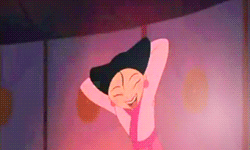

Mei 美美 Qin – Character Sheet
it’s like everything you say is a sweet revelation / all i wanna do is get into your head / yeah we could stay alone, you and me and this temptation / sipping on your lips, hanging on by a thread, baby
late night watching television / but how’d we get in this position / it’s way too soon, i know this isn’t love (no) / but i need to tell you something
i really really really really really really like you / and i want you, do you want me, do you want me too?
Archetype — The Explorer Birthday — July 9th, 2002 Zodiac Sign — Year of the Horse, Rising Leo, Sun in Cancer, Moon in Cancer MBTI — ENFP Enneagram — 2, the Helper Temperament — Sanguine Hogwarts House — Gryffindor Moral Alignment — Chaotic Good Primary Vice — Lust Primary Virtue — Charity Element — Water/Fire (she’s a Water Horse, so she definitely identifies with that but in Western tradition she is Fire.)
Overview:
Mother — Tanya Qin Father — Peng Qin Mother’s Occupation — Editor-in-Chief of the San Francisco Chronicle Father’s Occupation — financial diviner Family Finances — wealthy Birth Order — middle Brothers — none Sisters — Ting-Ting (Gemma Chan, May 13, 1993), Su (January 22, 2003) Other Close Family — close to their mother’s side, father’s side lives in China, but they’ve taken trips to see them once or twice. do not have any cousins/aunts/uncles, but close to their grandparents. Best Friend — Daisy Zanetti, they grew up together. Met in school and were thick as thieves right away. Daisy is a half-fairy, so they both understood the whole “half” background thing. Other Friends — Lots and lots of friends~ Enemies — There was probably like one Mean Girl that Mei was always antagonizing and who was always antagonizing her. Pets — None. Home Life During Childhood — Relatively happy. Has nice, loving parents. Did a lot of Family Activities, since that was important. Mother was busy a lot with work, but her father was around a lot and Ting-Ting was always around (until she went to school.) Town or City Name(s) — San Francisco, CA What Did His or Her Bedroom Look Like — Posters everywhere! Very personalized and customized. Lots of reds and golds. Probably had like one of those net things around her bed. Always very messy, because Mei starts a project and then just jumps to the next. Lots of natural light too probably. Any Sports or Clubs — Dance and Gymnastics. Mei has kept up with both of these throughout the year. Does both ballet and hip hop. Her favorite gymnastics is rhythmics. Favorite Toy or Game — She wouldn’t consider it a toy or game, of course, but loves doing tarot and tea readings. Also enjoys a good board game, is very competitive though. Schooling — Public school. Favorite Subject — Physical Education ?? Maybe literature. Art classes… Popular or Loner — Decently popular. She wasn’t one of the people that everyone knew but she had a wide circle of friends. Important Experiences or Events — Discovering she had divination skills. Deciding her specialization. Moving to Swynlake! Nationality — American Culture — Chinese-American Religion and beliefs — Spiritual, borrowing from a spread of Taoism, Buddhism, Chinese folklore, and Confucianism.
Physical Appearance:
Face Claim — Cheng Xiao Complexion — Fair-skinned Hair Colour — Naturally a dark brown, but she dyes it a lot! Eye Colour — Dark brown. Height — 5’6 Build — Athletic, but slim. Tattoos — None. Piercings — Ears. Common Hairstyle — Likes to braid it or put it in two buns. Does a lot of half-up/half-down hairstyles. Clothing Style — Chic and trendy, lots of colors and patterns. Mannerisms — Very bouncy, doesn’t sit still much. Twirls her hair around her finger a lot. Usual Expression —
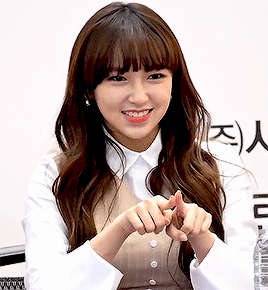
Health:
Overall (do they get sick easily)? — Pretty healthy! I’m sure this is due to Ting-Ting constantly balancing her Yin-Yang Physical Ailments — None. Neurological Conditions — None. Allergies — None! Grooming Habits — Rather good. Takes a lot of care with her appearance. Always makes sure to moisturize and exfoliate and change out of sweaty clothes. Sleeping Habits — Average. Eating Habits — Eats a lot because Su is constantly making things, but can forget meals if she is distracted or concentrating. Exercise Habits — Exercises a lot! Does all sorts of things like pilates and swimming and jogging. Emotional Stability — I give her a 7/10, she loses points for being a stubborn, unreasonable teenager and for her temper, but otherwise is pretty even-keeled. Body Temperature — Average. Sociability — Very social! Loves surrounding herself with people. Addictions — Love? Drug Use — None, we will see. Alcohol Use — Has gone to parties where she’s drank before, but not often.
Your Character’s Character:
Bad Habits — Interrupting people, bouncing from topic to topic, meddling in things that she shouldn’t, talking back, being a general nuisance. Good Habits — Very kind, very caring. Wants to take care of all her people. Strong moral compass. Best Characteristic — Her certainty. Worst Characteristic — Her stubbornness. Worst Memory — Being told she would have to move to Swynlake. Best Memory — When her father told her that he was proud of her for completing her studies for being a sorcerer and accepting an apprenticeship. Proud of — Her magic, her family history, her looks, her sporting ability. Embarrassed by — Not much, probably the fact she isn’t very good at school. Driving Style — Probably was just learning how to drive. A speed demon, but surprisingly a good driver. Strong Points — Her moral center and her big heart. Temperament — Can be explosive, but general soft and sweet. Attitude — Generally positive. Weakness — Not knowing what she wants. Fears — Not knowing what she’s going to do with her life. Phobias — Anything unlucky, though I wouldn’t call it a phobia, more of a cautious regard. Secrets — None really? She doesn’t keep much from people. She’s very “This Is Who I am. Fight Me.” Regrets — Having to leave Swynlake. Feels Vulnerable When — People are angry or upset with her, she’s not following her heart. Pet Peeves — Being told she’s wrong, lol. Conflicts — Duty to Family v Duty to Heart Motivation — Following her heart. Short Term Goals and Hopes — Make friends and something out of her life in Swynlake. Long Term Goals and Hopes — Figure out what she wants to do with her life. Sexuality — As-is she is straight, but this can change. Day or Night Person — Day Introvert or Extrovert — Extrovert. Optimist or Pessimist — Optimist except she can be really sour when things don’t go her way.
Likes and Styles:
Music — Oh, gosh–where to start? Mei loves love songs, of course. Big fan of Elton John, Elvis Presley, Celine Dion, etc etc. She also loves modern stuff, of course. Taylor Swift, Carly Rae Jepsen, Ed Sheeran…if she’s really feeling it some Florence and the Machine. Loves KPop too. I’ll let Lauryl tell me who she stans. (Is that the phrase I feel like there is a phrase.) Anyway, anything that is love related, she’ll give it a listen. Books — Doesn’t actually like reading that much, tbh. Doesn’t hold her interest. Magazines — Do people read magazines anymore? Does Buzzfeed count as a magazine? Probably giggles over Cosmopolitan. Foods — Sweets! Chocolate is her favorite, but she likes licorice a lot too. Is one of those weird people that likes black licorice. Also, loves a good rice pudding. That’s probably her favorite dessert. She also loves chicken, any kind of chicken–she doesn’t care what you put it in or what you put on it. Isn’t much of a picky eater. Actually really enjoys being adventurous with her food. Drinks — Green tea, green tea, green tea! Mei loves tea, especially iced. She also surprisingly likes salt soda water–she goes back and forth on sweet and savory. Sometimes, she just really wants salt soda water because it is just crisp and refreshing and wakes her back-up and reorients her yin-yang when she needs it. Animals — Elephants! Mei loves elephants. She’s that girl that has like elephant shirts and an elephant backpack and an elephant stuffed animal probably. They have such a high emotional capacity and Mei really respects them for this. They are also just so cute with their floppy ears and their soft, sweet eyes! Loves birds too as most of them are symbols of good luck and good tidings–besides owls, which are harbingers of death. Sports — Gymnastics and dance. Social Issues — Magick Rights is the biggest one. Also feminism. Also all the “main” issues. Favorite Saying — “Better to light a candle, than to curse the darkness” - Chinese Proverb Color — Golds, yellows, reds, blues are her favourites. She loves gold because it is a Classy color. Most of her jewelry is gold. She loves yellow because it is bright and happy! Red is lucky in Chinese culture and it always reminds her of times like New Year’s! Also, it is the color of passion and love. Blues she likes because they are calming and gentle. These are her lucky colors. She also loves pink, even though it is technically a color that she should avoid. Really hates white, because she doesn’t like what a blank slate it is. Also, hates brown because it is an icky boring color. As you can see, she has a lot of Opinions on colors. Clothing —Chic and trendy, lots of colors and patterns. Jewelry — Loves it! Wears mostly gold. Probably has a few staple pieces but then exchanges things depending on her mood. Websites — Tumblr, Instagram, Twitter etc etc TV Shows — CW shows and K/Cdramas Movies — All the great love classics: Gone with the Wind, the Titanic, When Harry Met Sally, Roman Holiday, all of Audrey Hepburn probably, the Notebook, Singing in the Rain…I could go on and on. She loves movies that tug at the heart strings and are full of that wild, amazing, passionate kind of love. They always make her swoon and if she is choosing a movie for movie night, you know it’s gonna be a romantic tearjerker. Though, she also likes romcoms. Doesn’t like action movies or horror movies or anything too intense, they freak her out Greatest Want — To figure out what to do with her life. Greatest Need — To grow up and learn things aren’t all about her, lmao.
Where and How Does Your Character Live Now:
Home — A three bedroom apartment with Ting-Ting and Su. Household furnishings — Rather plain at the moment, but will probably grow cozy as they settle in. Favorite Possession — Her pseudogrimoire where she writes down all the signs and stuff that she sees and puzzles out the meaning to. Most Cherished Possession — Her wand, which is a fan that was her mother’s, her mother gave it to her and her father and Ting-Ting help her imbibe it with magic. Neighborhood — Tortuga Place Married Before — No Significant Other Before — Non-serious boyfriends and Serious crushes Children — She iS a child Relationship with Family — Very close with her dad, even though he’s always yelling at her and being disappointed in her. They have a lot in common and she loves him. Her and her mother also get along more or less, she’s less stringent than her dad. Ting-Ting and her probably have the most contentious relationship, but even that hasn’t been that bad really. Mostly Mei being a nosy, annoying little sister. It will get more intense now that Ting-Ting is the authority figure and Mei is pissed about their situation. Su and Mei get along more or less well, they annoy each other, as sisters are wont to do, but Mei would def consider Su one of her best friends. Car — None. Career — Student Dream Career — She doesn’t know !! Dream Life — Married, with children, though she doesn’t know what she wants out of a career. Love Life — Nonexistant, which pisses her off. Talents or Skills — Excellent gymnast and very good with her magic. Intelligence Level — Decently intelligent, has street smarts, tbh. Very sharp in conversation. Finances — Wealthy
#about#character sheet#inspiration#part of me wanted to change some of this#but no#preserve the integrity
5 notes
·
View notes
Text
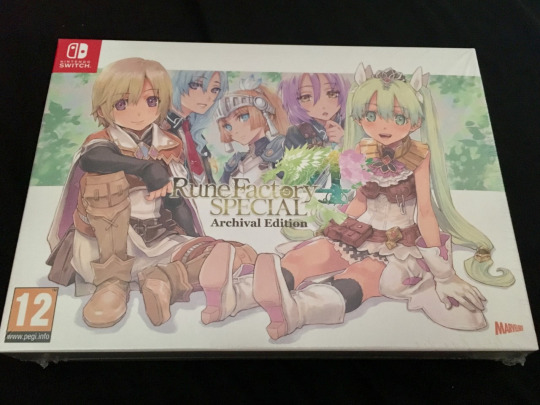
Gushing time.
Rune Factory 4 Special arrived a day early, so my entire day has been consumed in nostalgia. The original Rune Factory 4 was the first video game I ever bought on release day - I remember saving up all my money and making my mum drive me to like three different shops trying to find one that had it. I was already a fan of the franchise - before then, Rune Factory 3 had been my favourite video game, across the board. Aside from a playthrough of the first game last year, I haven’t played a Rune Factory game in a long time, certainly not RF4. But just starting up the game and hearing the music again, it was like it was suddenly seven years ago. Running around Selphia and seeing all the characters again - I love JRPGs, have played a lot of them, and I can think of very few that have characters that have stuck with me this long. And the aesthetics - the best thing about the Rune Factory franchise has always been the aesthetics, the music, the scenic and character design, just the general world. It’s a beautifully whimsical balance of urban and fantasy, and it’s the only JRPG world I think I’ve ever come across that I would genuinely want to live in. Rune Factory may no longer be my favourite game franchise - but I don’t think there has ever been another series that has felt so much like home to me.
Here’s a very long selection of personal highlights from the art book (by which I mean photos of the art followed by my rambling opinions):
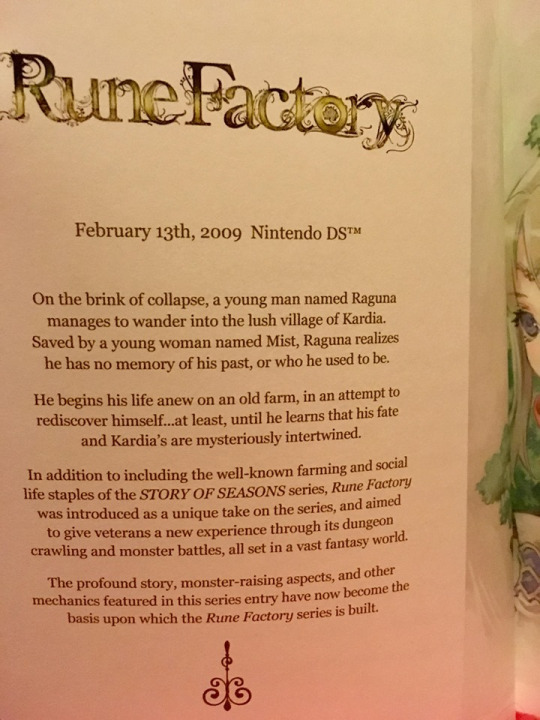
Yeah, see, here’s the thing - Rune Factory 1 is not a good game. I could write an entire essay on why it’s bad (I actually started and got pretty damn far before realising no one’s interested in my two thousand word review of a game that came out over a decade ago - the short version is ‘Misty Bloom-fucking-Cave’. Anyone who’s played RF1 knows exactly what I mean). Don’t get me wrong, it has good qualities - excellent boss fights, for one, and also, as with the rest of the franchise, it is aesthetically wonderful. But ultimately, it feels less like playing a video game, and more like playing a proof of concept for a game. Which I guess it kind of was - and I can’t hate it because we wouldn’t have the rest of the series without it.
But it literally ends with a dragon spewing plant breath on a tank to make a turnip grow out of the gun. ‘Profound’, my arse.
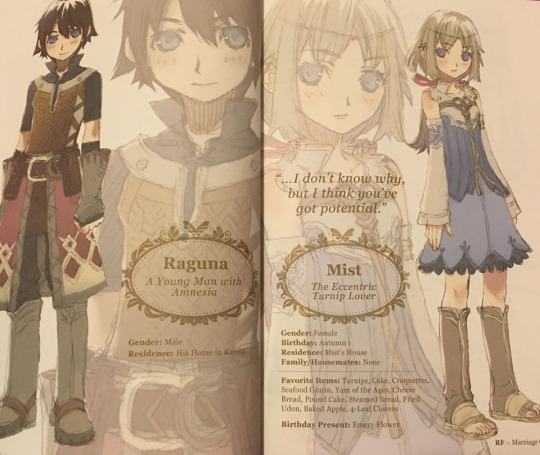
It’s Raguna! The “master sowrdsman!” (that is not a typo on my part that is a direct quote from the ending of Rune Factory 1 this game’s script had so many issues-). And Mist! My favourite of the ‘canon’ love interests!
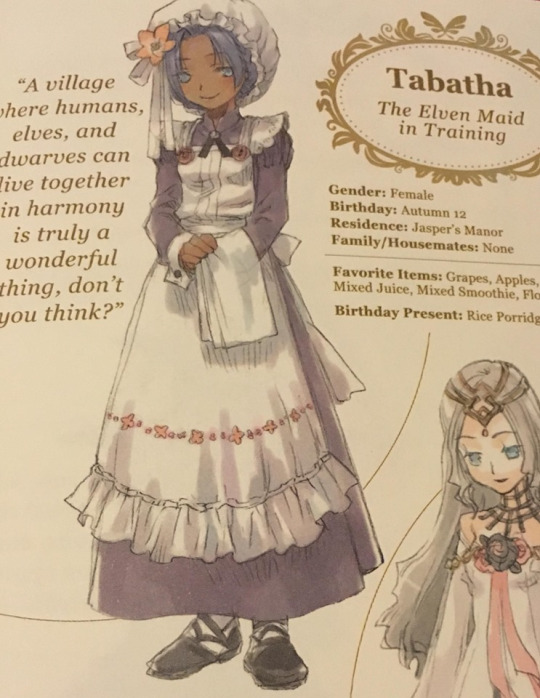
Best girl! When I was a kid, my favourite love interest in RF1 was Rosetta. As an adult, it is Tabatha. I don’t know what it is about her that I find so likeable (she’s as lacking in personality as any other RF1 character), but... idk, I just like her a lot.
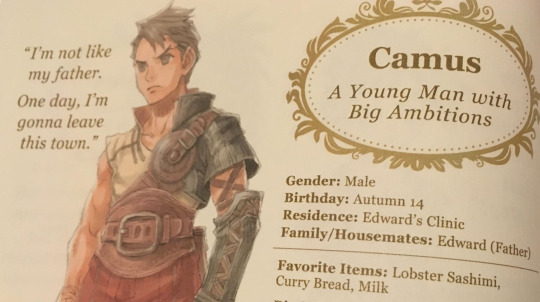
Camus’s big ambition is to leave town like even once. He will never achieve it
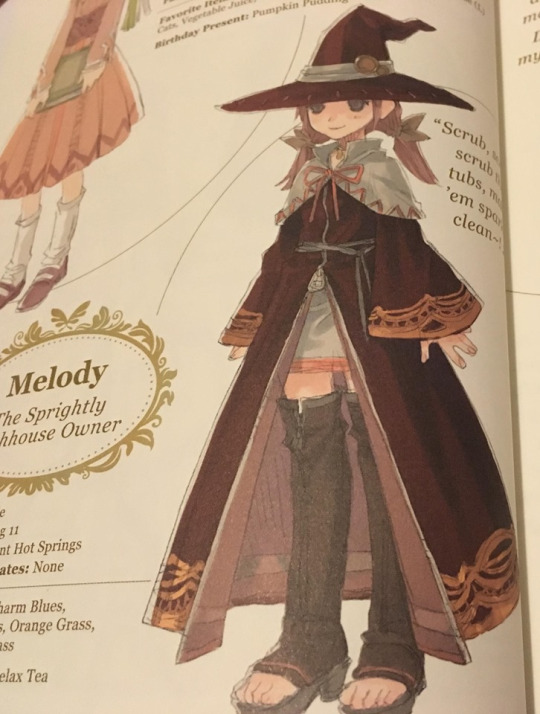
Fun fact about Melody is that she’s extremely depressed, a fact that comes up once in an optional side quest and is never addressed again. It’s incredibly dark for an RF game
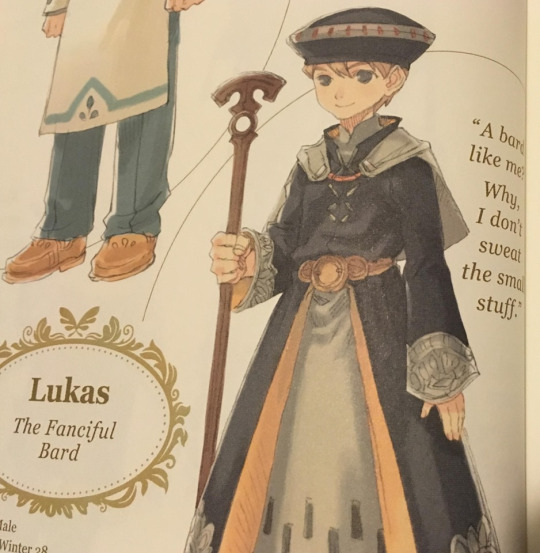
Fun fact about Lukas is that he sucks (he’s one of those ‘obsessed with talking about how hot all the girls are’ characters, an archetype that thankfully doesn’t show up again in these games). But also, interestingly enough, thanks to one of RF1′s many, many script errors, if you marry Rosetta (the girl Lukas is the most obsessed with), he’s supposed to express disappointment that he lost her to Raguna - but instead, he implies that he’s disappointed to have lost Raguna to her. The translators typoed their way into giving him a sexuality change. Which is honestly kind of amazing.
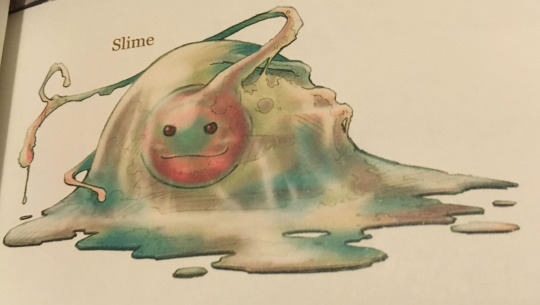
LOOK AT THIS SLIME THIS IS SUCH A COOL SLIME LITERALLY EVERY OTHER JPRG SLIME GO HOME DRAGON QUEST GET FUCKED (jk I like Dragon Quest a lot and its slimes are cool too). Wish you could see in-game that this is what they’re meant to be like.
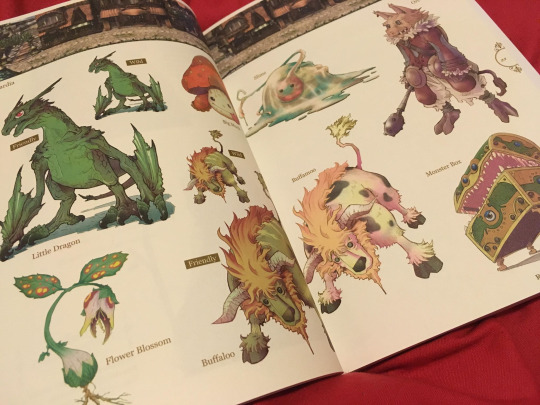
I just generally love the monster designs, they’re really charming
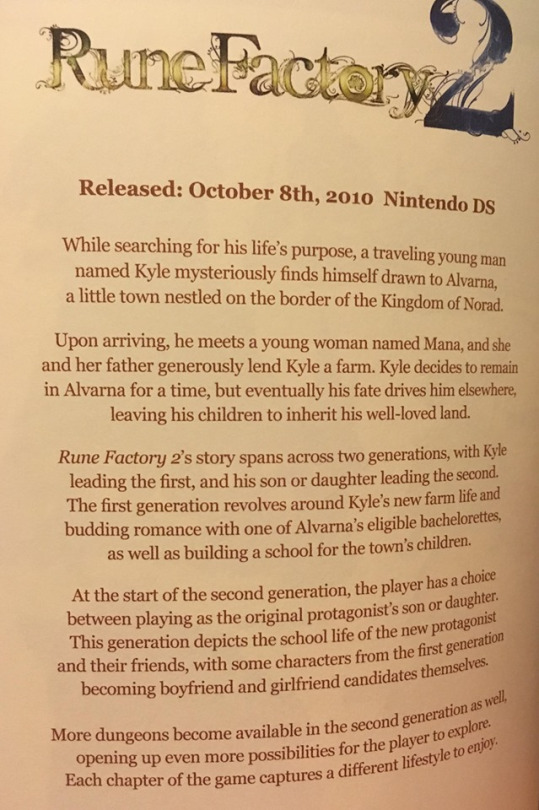
Rune Factory 2! The RF game with the most weirdly mundane protagonist name (Kyle. In the main four games of this franchise we’ve got Raguna, Micah, Lest, Frey... and Kyle). The two generations thing was actually very cool, but when they say ‘each chapter captures a different lifestyle’, what they really mean is ‘the first half is a weak Harvest Moon I’m sorry, STORY OF SEASONS game, and the second half is a pretty good Rune Factory game’
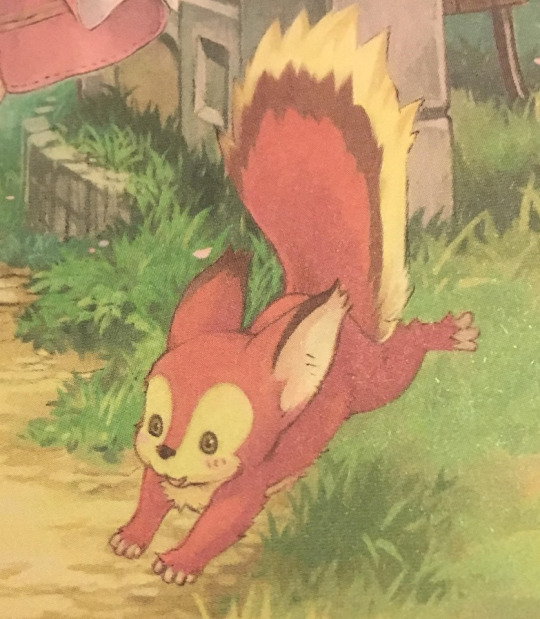
lookit this little fuck
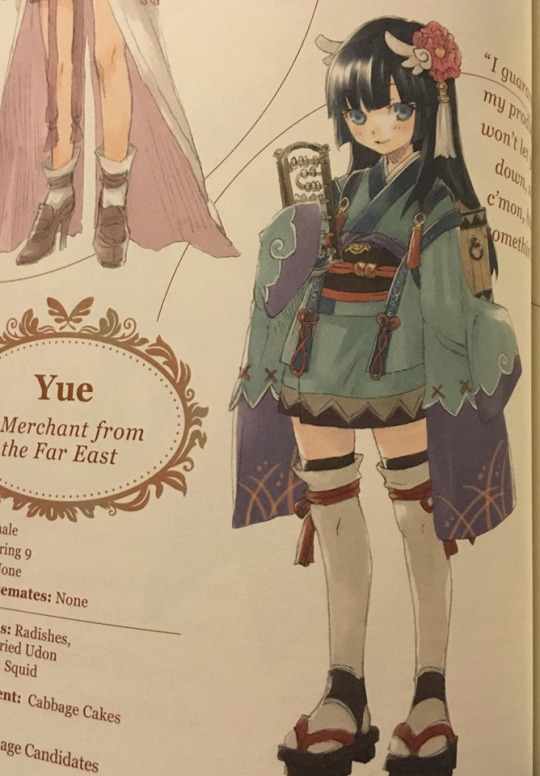
Yue Yue Yue! I love Yue so much, she’s great. She’s kind of like a much chiller version of Anna from Fire Emblem.

It’s really cool that we got to see grown up Cecilia (she was in RF1). I have this silly headcanon that if Kyle doesn’t marry Mana, Nicholas (her friend in 1) comes to visit Cecilia one day in the hazy-post game future, and meets Mana, and they get together. While Yue is my favourite, I do genuinely like Mana a lot, and I just want her to find love, I guess.
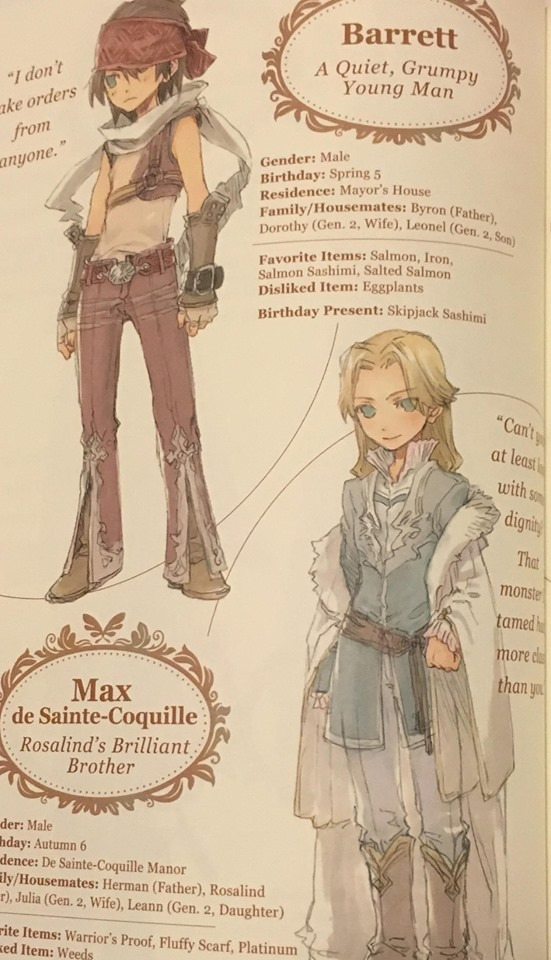
Here’s original Barrett! There’s a reason he was popular enough to make a reappearance (well, aside from the whole grumpy pretty boy thing he’s got going on) - he was a great character in this game. His and Dorothy’s relationship is also definitely the most compelling of the rival romances. Bonus Max, who also has a little shout-out in RF4 (check the diary in what will become Dylas’s bedroom at the start of the game)

Ray is male, but apparently he was originally going to be a female character, as he has an unused portrait in a wedding dress. My friend and I agree that this makes him a Trans Icon
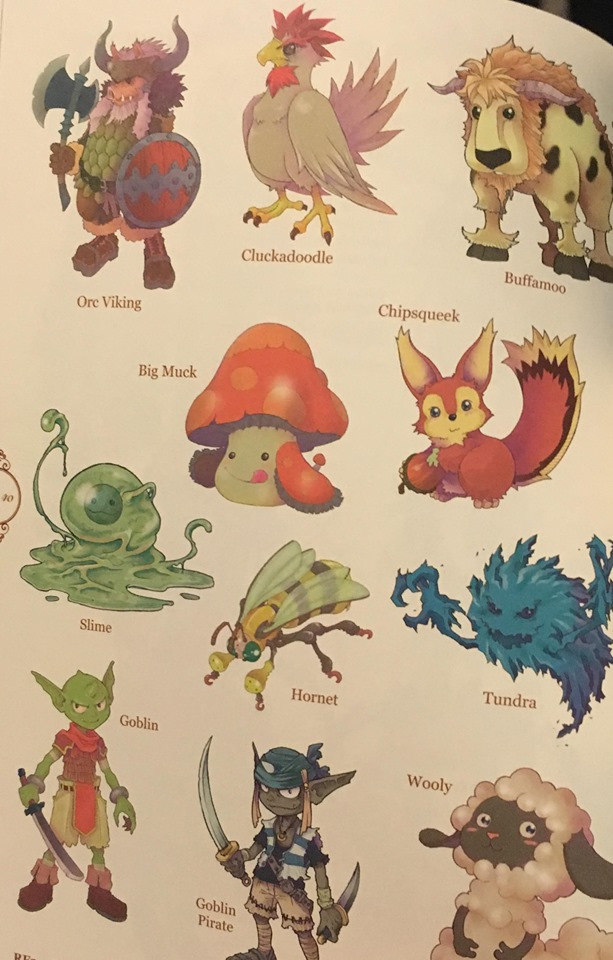
Monster designs remain excellent. Especially the goblins

Skipping over Frontier (and also Oceans later), as I never got to play it growing up due to not having a console, and still haven’t got around to it - might try this summer. Except I do need to point out that these guys should be memes. I don’t know in what way. But they should.

Rune Factory 3! My first RF game. The transformation thing was very cool, even if it was basically useless outside the main story. My friend and I spent hours mucking about in the WiFi dungeon. I loved the desert settlement and all of the dungeon designs in general, and man, RF3 is just great. I hope it gets a remake one day.

Raven Raven Raven! I LOVE Raven (as do most). Her story with Micah is the first time I can remember getting genuinely invested in a video game romance. I’m so glad she cameos in RF4. I love her. She’s wonderful.
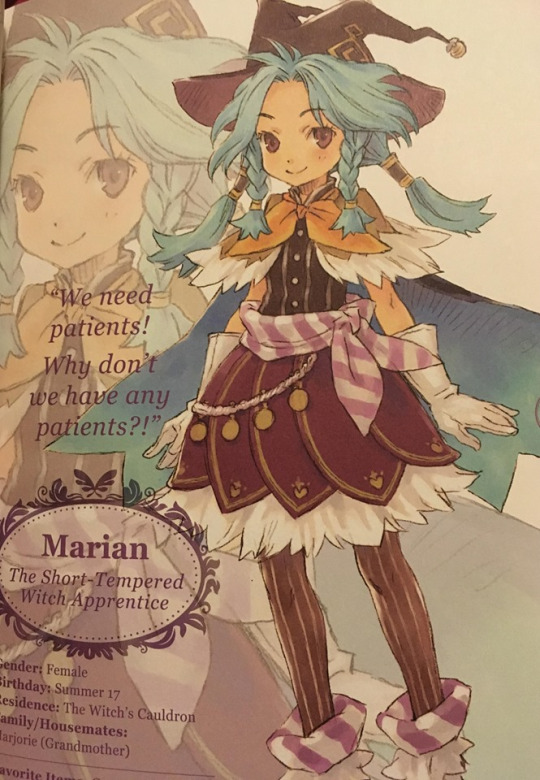
I have an odd fondness for Marian. When I was about twelve, I decided to do a playthrough where I deliberately romanced the least popular bachelorette. After poking around on forums, I determined that character to be Marian, and did a run with her. And... I actually came to really like her. I find her endearing. I get that people find her annoying and don’t like her... unethical medical practices, but doing that run has still made me a pretty protective of her. It’s been a long time since I played RF3, so maybe I’d change my mind if I replayed now, but currently, as far as I’m concerned, Marian’s a good’un.
I think I also used to low key ship her with Collette lol
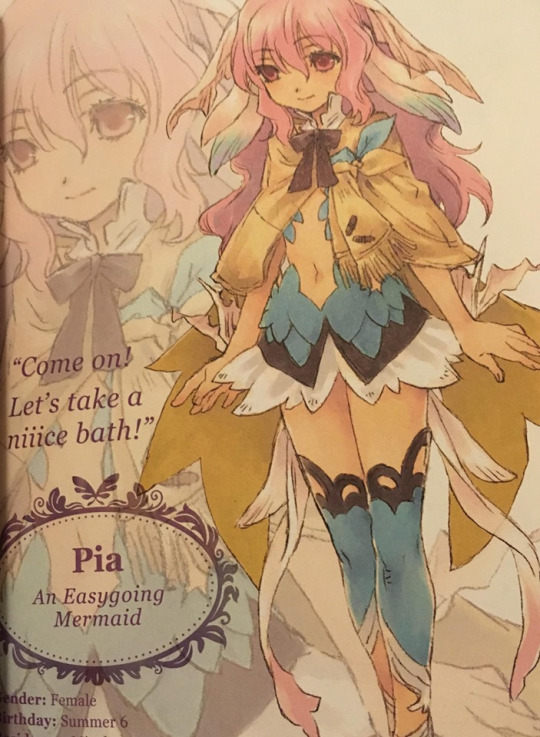
Pia’s official art has always been super weird to me because it’s so not what her character is like in-game. She’s a ditzy airhead. This makes her look so serious
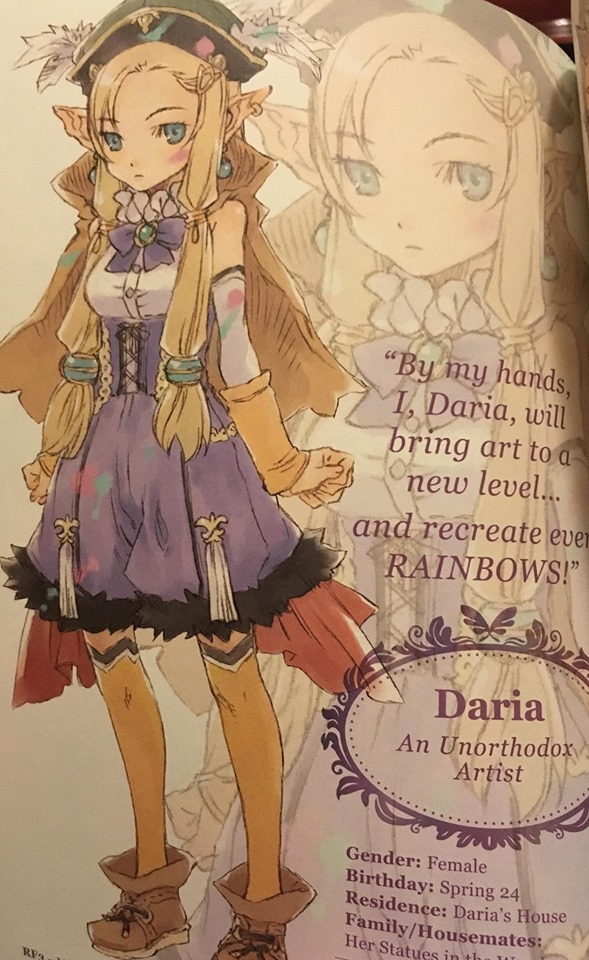
RAINBOW! Another character whose art makes them look way more serious than they actually are. Daria is great and would be a meme if this game was more popular. I think she’s also implied to be a relative of Margaret.
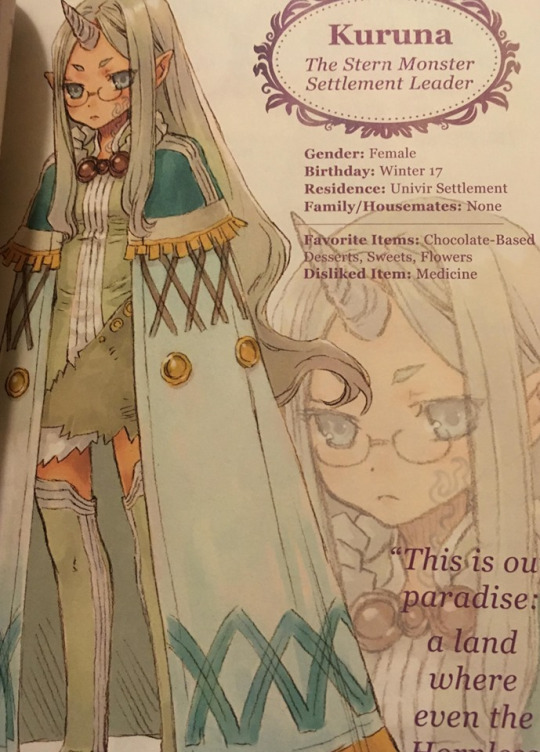
I’ve always been super confused about what Kuruna’s skirt is meant to be. Is it fur? Is it part of her shirt? Is it even a skirt at all?

Check it out, it’s the guy everyone would ship Micah with if this game was more popular
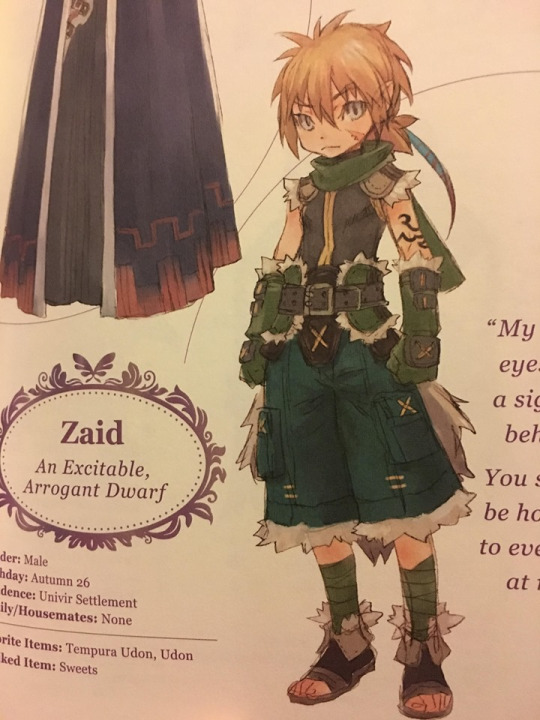
I want Zaid to make a reappearance and interact with Doug. Pretty sure it’s canon that they’re from the same clan? Think it would be very interesting.

RF3 definitely had the coolest farm. Also, still love the desert settlement.

This is from Oceans, so I have no context, but it’s just so cool that I had to share

Rune Factory 4. Culmination of the series is right - when I was playing it for the first time, I remember being blown away by just how much it is a true love letter to the franchise. I have never come across another game series that so consistently grew and improved from entry to entry. RF4 was a perfect ending.
Not that I’m complaining about getting RF5. Quite the opposite.
But if it had been the end (as we all thought it was until about a year ago), well, like I say. Perfect.

Well. Aside from soda can nipples. Can’t believe they didn’t fix those. Though in some ways, that would have made me sad too
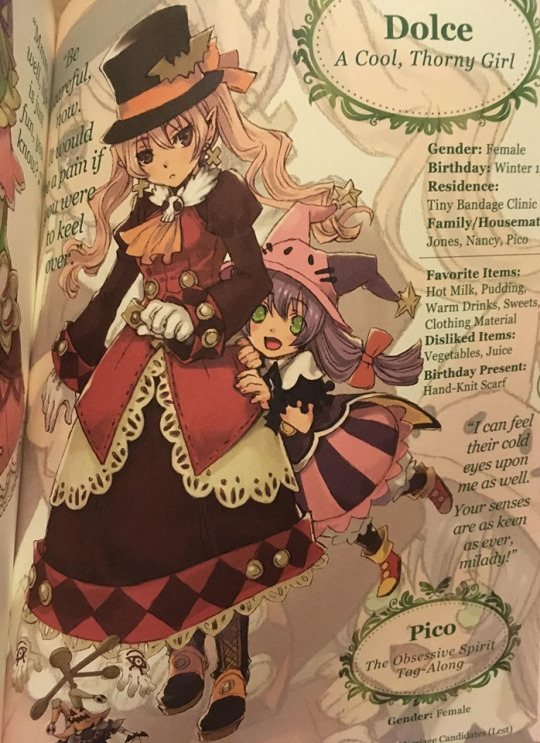
Dolce has such a cool design, in both human and monster form. I’ve always kind of crack-shipped her with Margaret, for no real reason at all

Vishnal! I love Vishnal. Vishnal is pure as heck. Marrying him this time around.
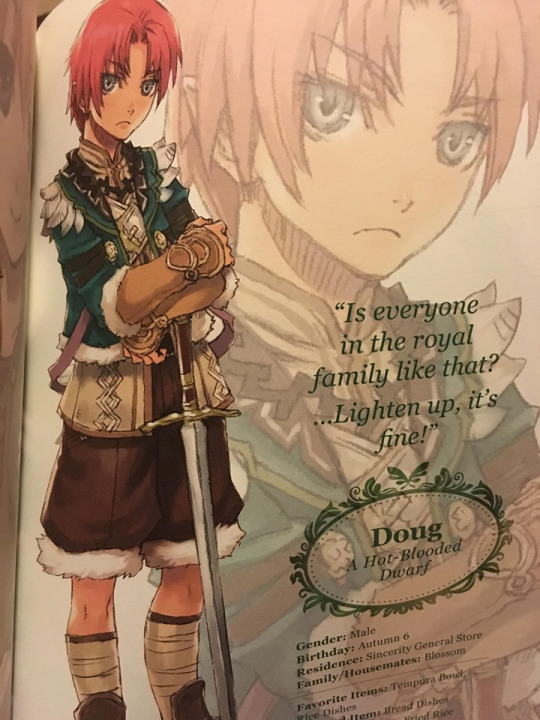
Doug! My choice from last time around. Another character who looks more serious in his official art than he is in-game (well... most of the time)

And then there’s Dylas, who looks much happier here than he does most of the time. Kind of looks like he and Doug swapped bodies, actually. There’s a fanfic prompt for you.
Their ship name is Dyldo. I love them
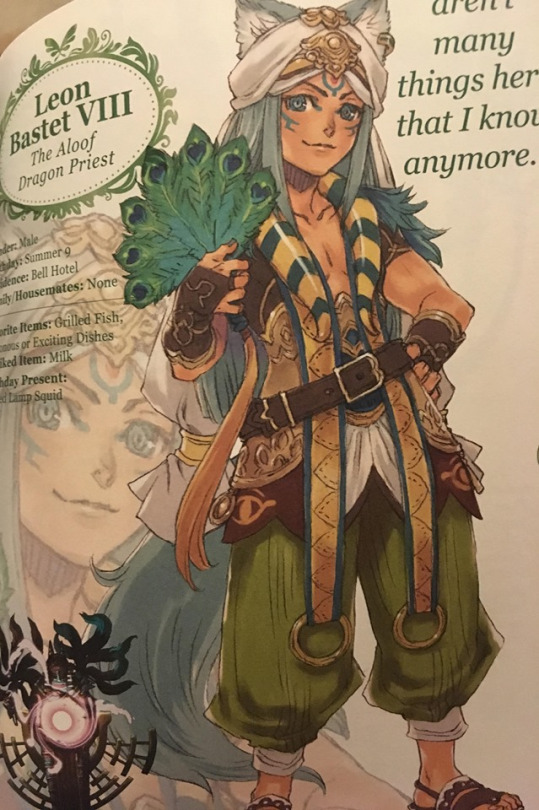
Leon is nostalgic for me mostly because my friend and I used to get into a lot of arguments about whether or not he’s the hottest character in the game. She maintains that he is, because muscles. I maintain that muscles aren’t actually that attractive. It is a rift that divides us to this day
(He looks oddly... younger in this art though? Weird)
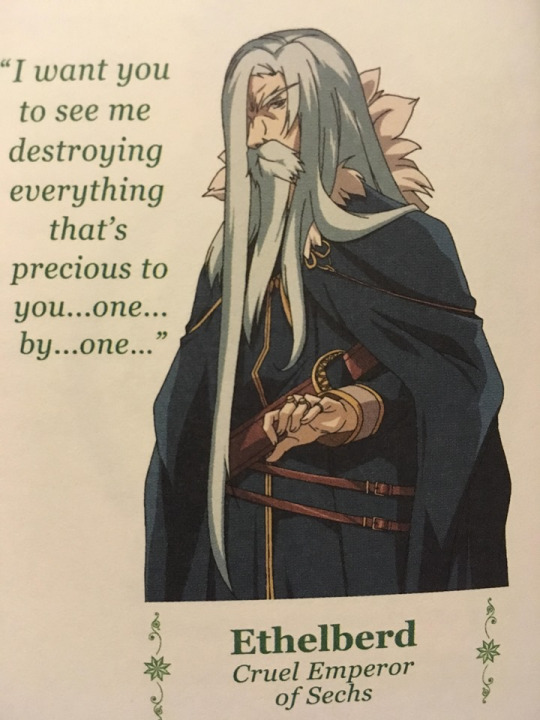
Sechs Empire is such an unfortunate name. Seriously. How rushed was RF1′s localisation team? All those script errors, and then this (the Sechs were the antagonists in the first game, and were only referenced in passing in the rest until RF4 - so it was a bit of a ‘sins of the father’ situation by then).
Seriously, try saying ‘Sechs Emperor’ out loud and tell me you can take this man seriously
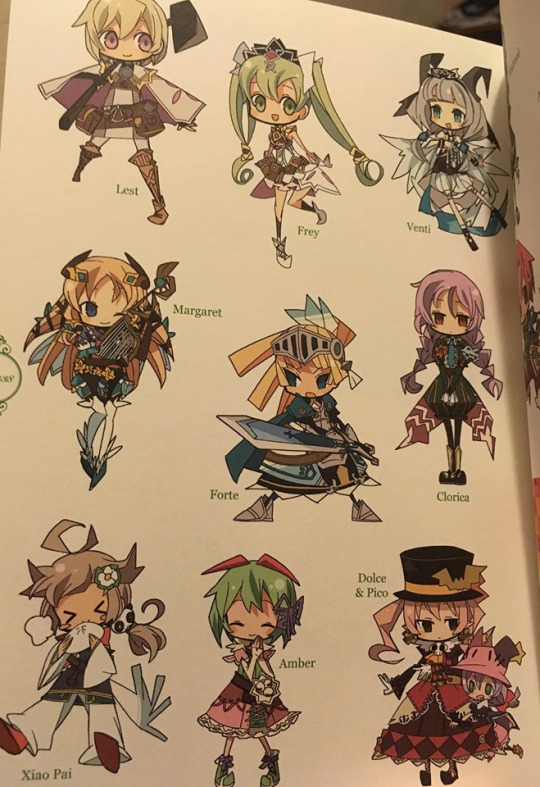
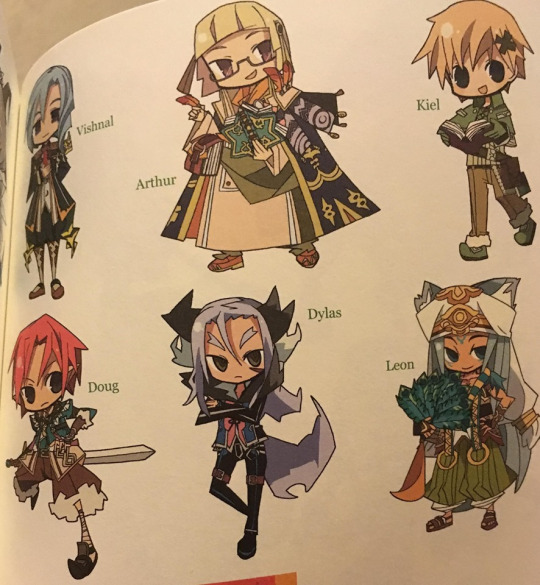
I??? Love??? Them???
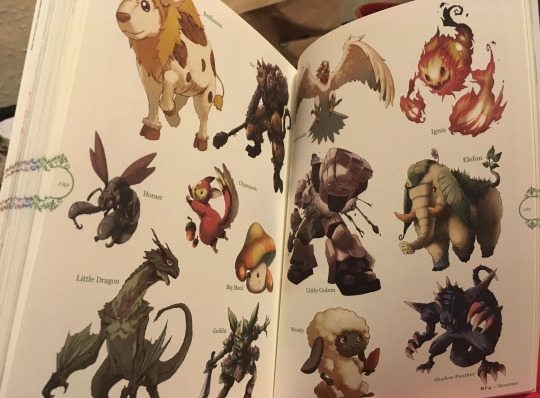
I??? LOVE??? THEM???
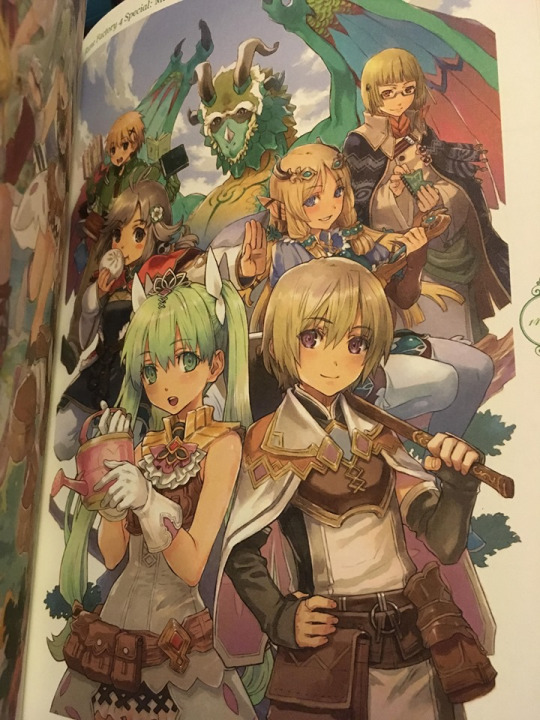
Still confused as to why Kiel, Xiao Pai, Arthur and Margaret are on the cover now. Don’t get me wrong, I like them, but... Amber, Dylas, Dolce and Leon made way more sense? Even the Archival Cover makes more sense (Vishnal, Clorica, Forte), as those three are all kind of Lest/Frey’s servants (well, Forte for the whole town, but still). Of those first four, all but Arthur basically lift right out of the game with little-to-no impact on the story
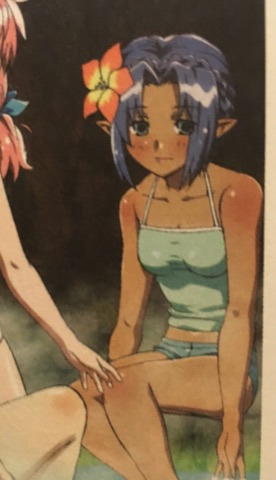
NO HAT TABATHA NO HAT TABATHA

I’ve always really loved this Raven picture
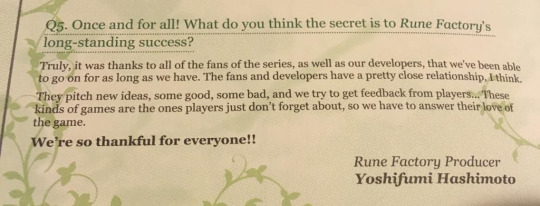
And I am thankful for you <3
34 notes
·
View notes
Note
Hey Rosy! Have you heard Marie’s comments about s7 at Dutch Comicon? She said Octavia “finds her peace in a place you’ve never seen her before.” And “you guys are going to see a bunch of different planets.” She also said “I can’t tell you who’s where or what’s what or where’s where, but it’s ugly and it’s crazy because it’s the 100 and no one ever smiles. There’s challenges and there’s wars and there’s stuff. Different circumstances this year.” What do you think is going to happen in s7’s plot?
It’s hard to guess what will happen in the plot because they like their plot twists, so the only thing I can do is think about the storylines that are still open, the narratives that are already being told and need to be finished, and the clues they’ve been dropping.
Becuse, this is, like, the LAST season, so they need to wrap up the storylines they’ve left open. It’s kind of a big challenge because they’ve been working on a LOT of long term storylines, so if they manage to get them all wrapped up next season I will be VERY impressed. I don’t think most tv shows DO manage to tie up all the loose ends. Most shows just kind of drop them over the years? Or don’t present them at all. So let’s see. I think they’re going to do it because they’ve started to resolve things I thought they had dropped.
Bellarke is going to get together romantically. It’s a big narrative, and has been relentlessly getting closer and closer. I know people call me delusional or a clown for still seeing it, but if they weren’t still moving it forward, I’d say they weren’t. They ARE. Season 6 leaves it clear without a doubt. No they don’t go quickly. That’s the way they’re telling it. And that is okay, even if it frustrates the impatient. BUT one of the requirements, every season of The 100, is that Clarke and Bellamy come together in order to reach victory, and every season, what brings them together is a deepening level of love. Actually it’s the most easily predicted outcome for any long term narrative. The others are less certain.
For Clarke herself, she’s been through the ringer. She started out the golden girl, the heroine who was idealistic and determined and full of love for humanity and her people, and as time went on, we found out she was ruthless, sneaky, and determined, and you really wanted her on your side. HOWEVER her heart was broken many times over, she was terribly betrayed, she bore the burden of terrible acts, she lost her belief in humanity and in herself and that there even WAS a right choice or a good guy. But in the last season, she’s recovered some of her belief in humanity, mostly through Bellamy, actually, and has come to learn that love is a strength, not a weakness, so I expect to see her fully coming into her heroic powers as she saves and redeems humanity in season 7.
For Bellamy, he started out at the bottom of the hero pile, being an actual villain in season 1a, and rising, expanding the circle of who he would protect out from Octavia, to his delinquents, to arkers to all of humanity. I believe Bellamy actually completed his hero’s journey in season 5, when he came back from space and did the right thing, saving everyone, spacekru, wonkru, eligius, and thus restoring Clarke’s faith in humanity because HE was good. Right? So that meant for him s6 and 7 need to have a different story, and I speculate that Bellamy has moved on to fulfill his archetypal character trait of “The Heart.” I think the end of the 100 for Bellamy is going to be a romance. He needs to search out that good life lived in love. And we saw it in season 6, as his goal, what/who he needed to save was his soulmate. And it was a dedicated mission that had ONLY Bellamy doing the saving and he used HIS HEART to save her. No guns. No diplomacy. No wars. No distractions. No make it go boom. No delinquents. JUST bellamy, and his hands and heart, because he needed her and couldn’t lose her. See? Bellamy was already the epic hero, now he’s the romantic hero. So that brings me back to Bellarke, because that means getting CLARKE is his goal now for s7. That’s his story. Because in romance stories, the goal is the romance. Clarke’s story may still be to save humanity, but I’m guessing that this is part of the overall story. Clarke saves humanity, Bellamy saves Clarke. Just like Bellamy inspires the masses but Clarke inspires Bellamy. See they trade off who supports whom, and that’s why they are the best.
Octavia will be redeemed. She has to be, because she’s symbolic of humanity itself. That she became evil for a while also fits because humanity is what destroyed the earth. I do not think that JR is writing a grimdark show that says humanity is evil at its root though, because the redemption of Octavia is happening. That was in doubt for me for a while. I thought they’d switched the humanity symbolism to Madi maybe? Or were cheaping out on a martyr sacrifice instead of real redemption. Not after they took away her martyrdom, though. ALSO a slow narrative. It seems like a war is brewing with whoever is in the anomaly, and she may use her warrior skills...BUT it might be important that she DOESN’T??? not sure. She might actually need to use them to better the world. This story DOESN’T say that violence is always the wrong choice, so being peaceful MIGHT not be the answer. Being peaceful has sometimes been the wrong choice in this show. But also, just because you HAVE the power to kill people doesn’t mean you should. So I’m not sure HOW she’s going to manage saving people. But she’s going to care about THEM, not her own power.
Raven will find a way to save everyone with technology. We’ve been talking a bit about her roll on my blog, and it’s highly likely that she might redeem BECCA, as a mirror of Becca’s tech destroying the world and leading to all of this, Raven has learned that it’s not jus getting to the goal that matters, but also HOW you get there. She’s learned ethics and morals. So if Octavia serves as a kind of symbolic salvation of humanity, Raven might be the redemption of technology, cleverness and advancement, as we see her no longer making it go boom, but rather unlocking secrets or creating tools or defense or who knows what? Not sure how this is going to work out. I also think that Raven and Clarke will reconcile, again, not sure how it’s going to work out because I thought it was going to happen through a spacekru story but Raven’s reckoning came through Abby instead, and therefore a kind of symbolic siblinghood with Clarke. I don’t think spacekru will be against Clarke anylonger though, because she was the last holdout and a lot of it was personal issues which she worked through with Abby.
Murphy... now Murphy is a question. We were talking and thinking that maybe HIS growth might be SPIRITUAL in direction. Which would be quite a twist for that s1 villain. But it might be true that he always wanted to be a part of something bigger, he always wanted to belong, to be loved, he also, until s6, was actually able to understand morality the most clearly of anyone, even if he chose to be bad sometimes. Then he had his spiritual reckoning when he died and thought he was going to hell... so we’ve got these questions coming up for him. Now he’s “immortal” and I hear tell that in s7 he’ll be living in the castle and that some of the sanctumites might still worship him. So that’s interesting. If his journey on the show has been a spiritual one, and now he’s being worshipped... he might decide to scam them be, well, leading them as “a god.” Of a type. Which might actually help to settle everything in the village. Oh, yeah. This is an interesting concept. I’ve actually had a long term theory that the 100 is actually a kind of origin story of the “gods” who redeemed humanity. And if we consider that Murphy is (for now) immortal, and he’s such a scammer, and he’s been a witness to Clarke and Bellamy from the beginning...oh holy heck, what if MURPHY is really the narrator of this tale? Oh holy heck. Murphy has taken part in all the storylines except for Mount Weather and Pike. AND he played the role of fleimkepa for a while. Holy Heck. Murphy as religious leader. Possibly god. Religion founder? s1 no god. s2. searching for god (literally on a quest for the city of light.) s3. fake(?) prophet/priest. s4. clarke’s morality (while you were saving them I was saving you,) and his own. s5. needs to be a hero/to be good/sacrifices himself. s6. dies/goes to hell/becomes immortal. s7. holy heck murphy’s found god??? is god??? leads the people to god???
Echo. Echo is Ash. This is important. She also needs to be her own person, who she is. She can’t be the good spy anymore. This is a plot point, not my wishful bellarke thinking. Echo’s story is about independence and identity and finding herself again. This is not a romance story. This is a feminist story of breaking free of the dictates of the past and choosing her own path. She needs to stand on her own two feet and not follow her leader anymore, who is now Bellamy, her boyfriend. Having your boyfriend be your king is already a suspicious dynamic. Ditch him, Echo. First off, you can make your own decisions. Secondly, you need someone you can share your soul with and for some reason it’s not him. (oh right because he’s already given it away and she’s standing right there.) Thirdly, you need to figure out who you are. I think Echo needs to make a choice for herself and it might not be the choice that Bellamy makes. Last season I said she’d choose to stand with the slaves of sanctum over her own people. This might be how it works out in the end, but it would look different because they’ll integrate at least some of the sanctumites into their people. IDK we’ll see.
Madi. IDK. I think that’s part of her story. What is her role now that she’s no longer heda? Child? She’s not just a simple child either.
Emori. Mostly Murphy’s storyline. She steadies him and gives him love. His early redemption started with “I don’t want to die alone.” and she gives him that. (Oh no. What if that means they are going to die... but not alone, together. a possibility.)
Jordan. Not actually my favorite character, but he’s a main, so that says his role will be bigger next season. He’s been brainwashed. So we’ll either have to get him out of it, or he’ll end up being kind of a villain. :(
Biggest mystery. The anomaly, Hope, Diyoza.
The anomaly is a gateway. It leads us to multiple planets. We already knew about those planets, so that makes sense. There are five, I think, of which Alpha is the first. There’s a guy there who made Hope bring Octavia back? Hope is a grown up now but Octavia is still her own age. The anomaly not only messes with space but also with time. I have not given up on our heroes going back in time and back to earth (they have been filming in and around a yellow farmhouse which I have speculated might be Diyoza’s father’s farmhouse where she went to hide from being captured but eventually WAS found in.)
We also know there will be upheaval in Sanctum, not all of the sancumites accepting what happened, Jordan being brainwashed and Murphy and Emori being worshipped as gods. lol. Wonkru is awake unless they put them back to bed and we have some Eligius prisoners awake because we saw the casting. Why wake them? Marie said a war. Are they going to war against whoever stole Octavia? They need them for a war.
I still think it’s about the redemption and salvation of humanity and maybe making up for destroying the earth, either by fixing what they did on earth, or creating a new, non toxic society in the colonies. I am not keen on colonies being the answer, because I think that’s not the answer to redeeming humanity for what they did to earth, but I also wonder if our delinquents might separate and choose different paths. Maybe some go back to earth. 200 years later it might be habitable again. I could see most of the delinquents going to different planets but Clarke and Bellamy going back to earth to see if they can fix it and living in peace, their own adam and eve. It’s a theme we’ve seen used before so it could happen. Also it would give them a The 100 style happy ending like Marper got. idk. I predicted marper’s ending as a possible bellarke ending a while ago... in other words, got the right story but the wrong couple. but marper is a mirror of bellarke so it could still happen.
I have a hard time saying what the plot of s7 will be. They’ve given us less than they ever have before. I got quite a bit from s5 hiatus, and I’m actually still going on things we found out then. I feel like it’s all one story, not two separate stories each season.
48 notes
·
View notes
Text
Kid Eternity #2
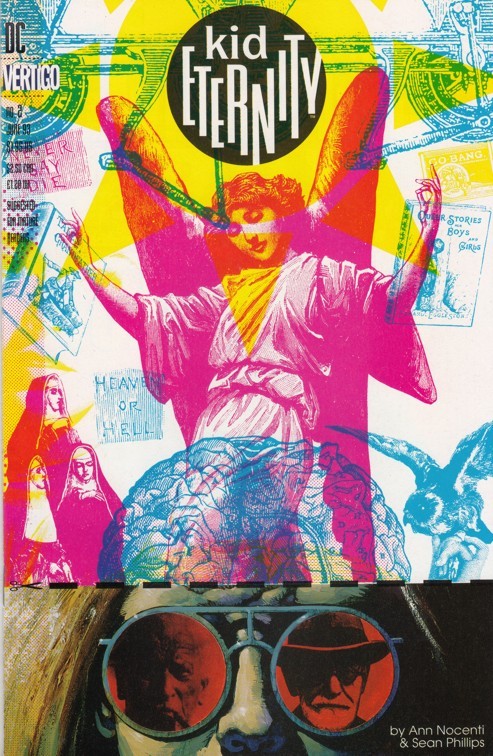
This cover says, "Don't look at who wrote it! Just look at how interesting these visuals are! Sucker."
In my review of Kid Eternity #1, I threw out a few theories on why Ann Nocenti's writing is so weird. After reading page one of this issue, I've thrown those theories out again but in a different way. That makes complete sense if you understand English idioms and also understand that everything Ann Nocenti writes is basically pre-trash.
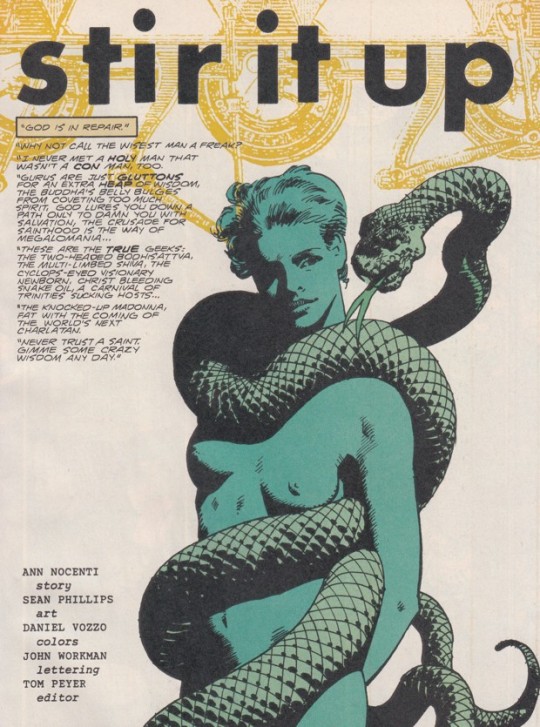
This is page one of Kid Eternity #2 and it will probably get this review banned on Tumblr.
I have a new theory: Ann Nocenti asked what a Vertigo comic book should be and editor Tom Peyer probably joked, "They're mostly tits and profound nonsense." So Ann Nocenti's vagina gobbed in her underwear and she squealed with glee. "That's what I do!" she chortled merrily! I probably shouldn't abuse Ann Nocenti for writing things I don't understand. I have plenty of choices of other people to abuse for it: my elementary school teachers for not calling me out on doing just enough to get by; my junior high school teachers who let me get away with not putting any effort into big year-end projects (In science, we were supposed to make a stone age tool. I rubber glued a carved-to-a-shoddy point stick to another stick (which was worse than my friend Robert who put some pine needles into a split stick, calling the weapon "Ow"); in English, we had one project based on Romeo and Juliet (because all we did that quarter was watch and read various versions of the play) and I refused to do it because the teacher was wasting my time; in Computers, I found Dan Felipe's project, a trivia program, and I just copied it and used it for my own project (changing all the questions and line numbers and other things to make it seem like it wasn't plagiarized but, I mean, come on! In fairness to me, I only did it because the stupid fucking school changed computers halfway through the semester, dropping the TRS-80s for Apples and my project was relying on the Poke images of the TRS-80 to create an animated sequence)); my high school English teacher, Mr. Borror, for reading nearly everything I wrote in front of the class so that I began to think I was the wittiest fucker in Santa Clara High; my college teachers for some reason or another that allows me to not blame my own lack of ability; and probably my parents because if they were any good at their parental jobs, I wouldn't be writing a blog about comic books. In other words, I'm sure Ann Nocenti is a philosophical genius while I'm just a guy who blames everybody else for things I don't understand. Even if I truly felt Ann Nocenti was an underrated genius whose writings I'm incapable of parsing, I would never ask her to explain what she meant by this first page of Kid Eternity #2. I just wouldn't feel comfortable putting her on the spot like that. It's not up to the artist to explain their art to the foolish audience! Only the Christian Messiah bears that responsibility (and, let's face it, he wouldn't have had to explain every fucking parable if he'd been able to convince smarter people of his bullshit). So if it's up to me to interpret this first page gibber gabber, I suppose I should get to business. Or kill myself. I mean, killing myself would be easier and less painful. And I totally would kill myself before reading more Ann Nocenti comic books except I have plans to cut my toenails in a few months. Before I begin trying to understand this hogwash, I'd like to point out that if she'd written it as a sonnet, I wouldn't have a problem with it. I'd read it, think, "Yep, that's a sonnet!", nod my head in sage understanding, and then jerk off to the titties. But this is not a sonnet so it is not allowed to be obtuse simply for obtuseness' sake. So this fucking speech. First off, who is speaking? The serpent trying to fuck the naked lady? Is this the speech the serpent used on Eve to get her to eat the fruit from the Tree of Knowledge of Good and Evil? Although if that's the case, how would talking about Buddha convince Eve of anything? I'll assume the serpent is omniscient (because he may or may not be Satan, depending on what holy men or con artists you believe but certainly isn't Satan if you're simply going by the Book of Genesis. I bet the serpent was God doing one of those Zeus things minus the rape. Zeus loved to trick people so he could get laid; Yahweh tricks people to test their faith). I guess since she had yet to eat from the Tree of Knowledge of Good and Evil (come on, God! That name is terrible), she wouldn't know what she doesn't know and can't defend against any nonsense the serpent spews at her. Let's assume the art goes with the speech and it's the serpent speaking. So why is "God in repair" and what the fuck does that mean? And why is it followed by the statement, "Why not call the wisest man a freak?" Does the snake only speak in non sequiturs? Was that a stupid question since I already know the snake's dialogue is being written by Ann Nocenti? It is kind of refreshing to see that her dialogue style never changed in thirty years. The shit the serpent says on this page could be nonsense spewed by Coil from Nocenti's New 52 Katana. You know what? I don't have to continue this because, in the end, it's just a carnival barker's pitch to get people to believe in the freaks in his freak show. He's all, "What's the difference between freaks and religion?!" That's not a riddle I have an answer for. The only religious joke I know is "What do Noah's Ark and The Bible have in common?" That might be a joke that was extant before I came up with it but I did come up with it on my own. And I think the answer is so obvious I would be insulting the intelligence of all four people reading this. Oh, and the snake trying to fuck the lady? It's a tattoo on the Tattooed Lady. The reason the comic begins in a circus freak show? Because Kid Eternity is the newest freak on display! The opening sideshow scene is just one of Kid Eternity's dreams. The demon angel babies get into Kid Eternity's dream and when he wakes up, they've tied his hair to the floor which totally has him trapped for like three panels. That was a close one! Kid Eternity decides he can't truly know what he's doing unless he utterly knows himself. So it's time to get his brain probed.

Let me guess: Carl will blather on about synchronicity and dreams while Freud tries to figure out how big Kid Eternity's penis is.
Carl doesn't initially discuss anything. He's just the straight man for Freud saying all the typical things you'd expect Freud to say: penis this, envy that, fuck your mom, kill your dad, more penises, many more penises, everything is penises. But then he comes on fast and furious with his archetypes and collective unconscious and human mythology stuff, all the biggest Carl Jung hits (aside from synchronicity but I'm sure he'll get around to that later. Ann Nocenti isn't going to miss showing the readers all the knowledge nuggets she mined to make her brain big). If only Nocenti would spend as much time writing the story as she spends making sure the readers know she knows a lot of shit then maybe I would have kept reading this comic book. Meanwhile, Zeus wanders around looking for somebody to trick fuck, Madame Blavatsky hunts down the next best burger before she slips back to the past, Beelzebub and Judas wander through Limbo, Jesus gets drunk and falls off a bar stool, and a phone yells at a woman. That all happens on one page to make sure the reader remembers other things are happening. But why does Ann Nocenti spend two panels of that dense page on Madame Blavatsky when she could have updated the reader on the non-X-File FBI agents who will probably hate fuck each other before the story ends? I also wanted an update on the Buddha Christ Trash Child. But no! Instead Nocenti just moves on to more of her proof that she's read all about Freud and Jung and totally understands the shallow top layer of their theories and philosophies. I don't mean to say I know any more than Ann Nocenti! But I understand how little I know of Freud and everything she's had him say are things everybody knows about Freud from all the dirty jokes about him: ids, supermen, parental relations, and phalli!
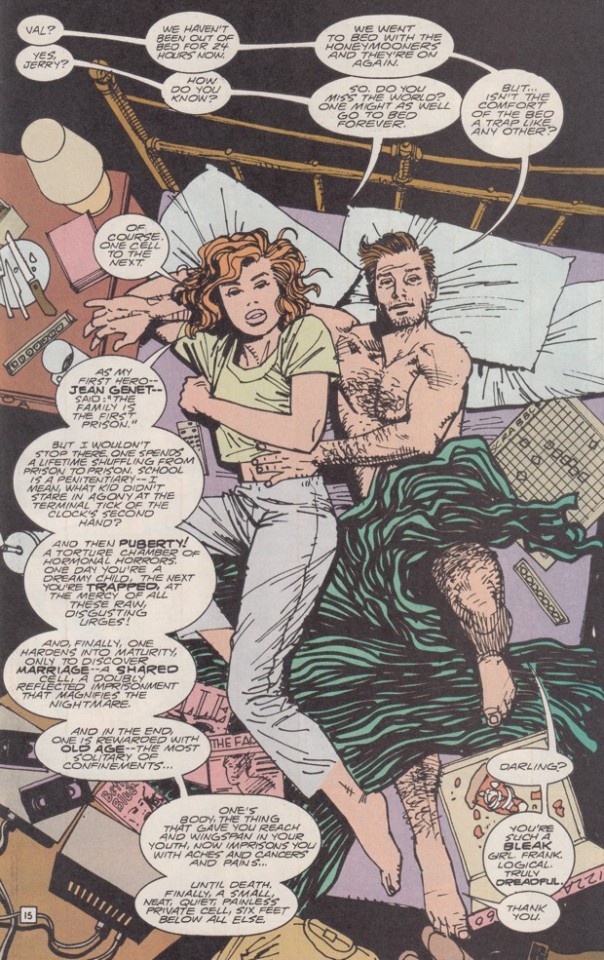
Oh, that's why we didn't get an update on the dense update page; Nocenti needed a full page to document the hate/fuck.
My new Ann Nocenti writing theory: Ann Nocenti has never had an original thought. She simply reads things, takes copious notes of bits and quotes she likes, and then shoves them sideways into whatever script she's currently writing. No wait. She does have original thoughts but they're almost not worth having. Like "everything in life is a prison" and then proving it by stating a few things about life that can be cell-like. It's profound in that way that things are profound when you're on acid. If you don't think about it, you can find yourself nodding along going, "Yeah! Yeah! Everything is a prison! Life is a fucking prison!" But if you do stop to think about it, it's like coming down off acid. You start to see how that thought you had about how the number three ties everything else in the universe together because of the way the corners meet didn't wasn't as mind blowing as it was six hours ago. Although the rant you went on about how pressing play on the VCR remote play the show and pressing pause pauses it but then to unpause it you have to hit pause again when you should really hit play was pretty fucking good. Speaking of acid, I'm two-thirds of the way through the acid documentary on Netflix and it's fucking fantastic. I wasn't really thinking a lot about it but I was nodding along going, "Yeah! Yeah! Everything they're saying about acid is absolutely spot on!" throughout. I actually had to take a break because it was making me too happy listening to all Sting and Carrie Fisher tell their acid stories. I don't know why I didn't just spend five paragraphs discussing why the FBI agents were playing Scrabble while they fucked. It's probably just one of Sean Phillips' kinks. Oh, maybe they were just playing Scrabble and not hate-fucking. It's hard to tell because on the next page, Jerry asks Val if they can finally fuck and Val is all, "You're a nerd!" Then she slits his throat. But then in the next panel, his throat isn't slit and he's all, "You feeling better?" And she's all, "Yeah!" So I don't know what the fuck is going on and I don't really care. I've still got like eight pages of this mess to get through and I'd rather just nod along than try to understand it. And then just like last issue, Ann Nocenti sputters out a bit of writing that I totally agree with because I've said basically the same thing before. About how every day, I fall in love with some person I see on the street because of the smallest of things. And then I love them forever.
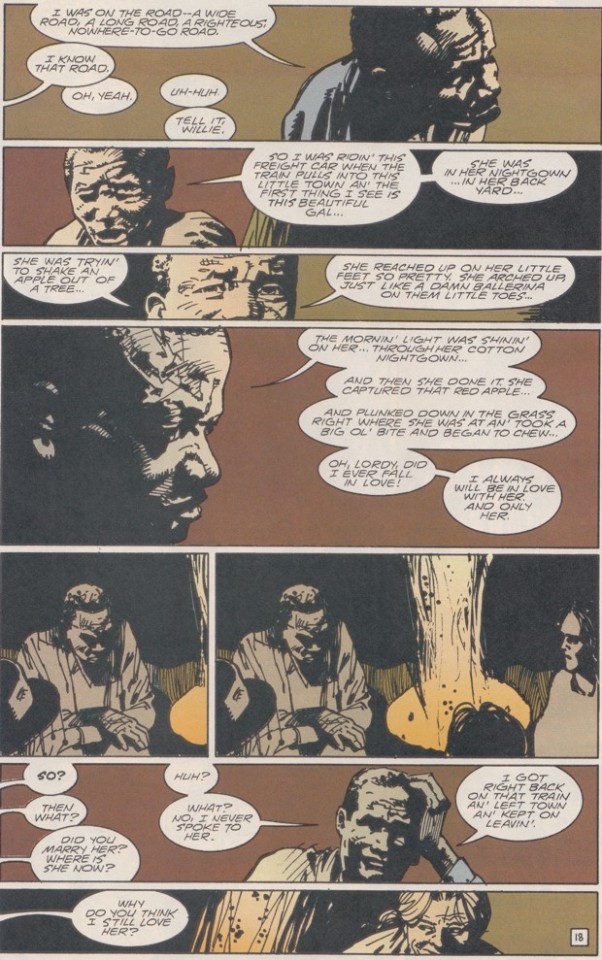
My story isn't as good but I once fell in love walking through the airport in Minneapolis. I was passing by an attractive woman and she was gazing off somewhere as I looked at her face. She was coming up on my right and then I glanced down at her breasts and back up at her face. And that was the moment she noticed me, as I glanced from her breasts to her face. And, catching me, she smiled and laughed and kept on walking. And I still love her to this day.
And for this page alone, I forgive all of Ann Nocenti's past (future?) transgressions and find myself eager to read Kid Eternity #3. Oh wait. I still have a few pages left in this piece of crap. I read a lot of books in college that I sometimes still say are my favorite books but I should probably just say they stuck with me because I know which books are almost always in my top five and a lot of the ones in college aren't those. But Edith Wharton's Age of Innocence always stuck with me. It's possible that I completely missed the message of the novel but to me, the book was about how true love only exists when it's unrequited. Archer Day-Lewis doesn't love Ellen Pfeifer more than May Ryder for any other reason than that she was the one he didn't marry. It seemed to me that Wharton was trying to portray how hard love is and true, phenomenal love only exists in the imagination. Only a love we can imagine can remain magical. Only when we love an object, or the imaginary person we've placed on a pedestal, can we evade disappointment in the reality and flaws of another actual human being. Being in love with Ellen Pfeifer was easy because she wasn't there for all those years. There were no fights or disappointments or multiple times accidentally walking in on her taking a huge shit. She was pure and beautiful and imaginary. But then again, maybe that wasn't the point of the book at all. I was young and romantic at the time and I still absolutely loved the women I'd had unrequited crushes on in junior high and high school while my college relationship was slowly circling the drain due to personality conflicts. But not due to sex. The sex was fucking great! Anyway, Freud and Jung decide Kid Eternity is in denial and they leave. Hemlock and Dog spread some new reality across the world via a computer virus. Madame Blavatsky starts making time go backwards, probably so she can vomit up all the Twinkies she ate and eat them again with their delicious creamy filling. And the devil and Judas wind up in a bar in Limbo with Jesus to make plans for Kid Eternity. There's probably a lot more going on but there'd be too much for me to process even if it wasn't confused by Nocenti's writing style. No wonder I gave up on this book after three issues. There's no way by the third issue I could remember anything that was going on, if I even understood it the month prior. Kid Eternity #2 Rating: C-. A confusing mess that's about 90% Ann Nocenti just vomiting out things she's read. Even the things that, with the benefit of the doubt, I want to believe sprang from her own philosophical musings, I can't bring myself to absolutely believe it. I feel like every thought and piece of dialogue she's placed in this story just came from piles of notebooks filled with notes she's made while reading other people's works. It's practically a collage of philosophical ideas and moral musings pulled from myriad sources and shoved into a Kid Eternity framework "written" by Ann Nocenti. Which could explain Nocenti's penchant for stilted dialogue. If she were making up all the character's thoughts, the dialogue would flow from one character to the next. But when each character can only respond with some profound thought Nocenti read elsewhere, it comes across like a ransom note, each word cut from the mind of somebody else and pasted as a reply to another bit cut from some other thinker, no relation existing between the two thoughts except the proximity relationship Nocenti has given them.
3 notes
·
View notes